Wants removal of all barriers to actualise health for all WHO: 4.5bn people lacked full essential health
First Lady, Senator Oluremi Tinubu, has stated that healthcare
delivery is the people's right and not a privilege. She expressed concern over the widening gap in health equity despite the progress made in the nation's healthcare sector. In a statement personally signed and issued yesterday to mark this year's World Health
FG Declares Tuesday, Wednesday Public Holidays for Eid-el-Fitr...
IBB, Atiku, Ogbeha, Wabara, Moro, Okowa, Tambuwal, Hail Mark at 76...Page 46
Atiku
Concerns Over
Suggests it should have started from Calabar if genuine
Former Vice President Atiku Abubukar has expressed apprehension about the proposed Lagos-Calabar highway project restarted by President Bola Tinubu.
In a statement by his media aide, Paul Ibeh, Atiku said the 700-kilometre Lagos-Calabar coastal highway plan should have commenced from Calabar if it were genuine, and not another project intended to merely cajole the people.
The Peoples Democratic Party (PDP) presidential candidate in the last general election lamented that the road project looked dubious, with all the hallmarks of a white elephant project. Atiku alleged that the Tinubu
administration had again revealed its penchant for shady deals. The statement said, "This project returned to public discourse at the twilight of the Goodluck Jonathan administration in November 2014, wherein it was announced President
Jonathan had signed the 10-state, 22-station project with China Civil Engineering Construction Corporation (CCECC) at a cost of $11.97bn.
"However, former President Jonathan could not begin the project before he lost the election.
But his successor, former President Muhammadu Buhari, expressed his intention to begin it and announced in 2016 that the project had been renegotiated downward by $800m
KPMG: Monetary Tightening Policy Will Attract More FX Inflows, But Not Enough to Tame Inflation
FDC: Nigeria’s surging prices to peak, begin moderate decline from second half of 2024
Suggests VAT should be raised to 10% to fund minimum wage hike
Says Naira undervalued by 26.76%
KPMG, a global audit, tax and advisory services company, has posited that the recent decision by the Central Bank of Nigeria (CBN) to raise the Monetary Policy Rate (MPR) to 24.75 per cent, could help attract more portfolio investments.
However, the firm, in its ‘flashnotes’ tagged: “CBN’s Monetary Tightening: The Trade-off Dilemma”, stated that the decision although a step in the right direction, was not enough to tackle the country’s inflation.

The Monetary Policy Committee (MPC) of the CBN raised the bank’s MPR to 24.75 per cent in March 2024, bringing it to its two-decades Healthcare Delivery is People’s Right and Not Privilege, Says First Lady, Remi Tinubu










Deji Elumoye, Onyebuchi
Ezigbo and Sunday Aborisade in Abuja
TRUTH & REASON
on page 5 Monday, April 8, 2024 Vol 29. No 10589. Price: N400
www.thisdaylive.com
Continued
Page 6
Raises
Lagos-Calabar Highway Project Continued on page 5 Chuks Okocha in Abuja
Continued on page 5
Day, Mrs Tinubu disclosed that STRATEGIC MEETING OF GLOBAL ALLIANCE FOR VACCINES WITH NORTHERN TRADITIONAL RULERS... L-R: Coordinating Minister of Health and Social Welfare, Prof Mohammad Ali Pate; Sultan of Sokoto, Alhaji Sa'ad Abubakar; and visiting Chief Executive Officer, Global Alliance for Vaccines and Immunisation
, Dr. Senator Sania Nishtar during a strategic meeting with Northern Traditional Rulers in Sokoto at the weekend
( GAVI)
Emmanuel Addeh in Abuja and Dike Onwuamaeze in Lagos

2 MONDAY APRIL 8, 2024 • THISDAY

MONDAY APRIL 8 , 2024 • THISDAY 3

4 MONDAY APRIL 8, 2024 • THISDAY
Rwanda Cautions against Fanning Embers of Hatred, Disunity in Africa
Michael Olugbode in Abuja
Rwanda has cautioned against the dangers of allowing hatred and disunity to fester in Africa, stressing that they pose a serious challenge to the continent.
The Rwandan High Commissioner to Nigeria, Christophe Bazivamo, stated this at the 30th commemoration of the 1994 Genocide against the Tutsi in Abuja, observed under the multiyear theme: “Remember – Unite
– Renew”. Bazivamo stated that the path to lasting peace demands constant vigilance, restating the country’s unbreakable pledge to fight intolerance, discrimination, ethnic hatred, hate speeches, genocide revisionism, and denial in all their forms.
"Unfortunately, this is happening today just beyond Rwanda's borders in the Great Lakes region. We should never allow the embers of hatred to reignite," he stated.
The High Commissioner stressed the importance of ensuring that the memory of the victims of the genocide becomes a powerful force for good, inspiring future generations to choose peace over hate, unity over division, and hope over despair.
"This can be achieved in different ways including putting course lessons about the 1994 genocide against the Tutsi in schools and the establishment of memory symbols in remembrance of the 1994 Genocide against the Tutsi.
“To educate the young and the next generation on the need to fight hate ideologies and stand against any form of discrimination and divisionism. Let us work together to build a world where such atrocities never happen again," he added.
In his remarks, the Minister of Foreign Affairs, Yusuf Tuggar conveyed the condolences of the Nigerian government to the survivors of the genocide.
Tuggar, represented by a former ambassador to Sudan, Safiu
Olaniyan said: “Genocide should not be allowed to raise its head ever again."
The Secretary General, United Nations, Antonio Guterres urged the world to stand as one against all forms of hatred and discrimination.
Guterres whose speech was read on the occasion by the UN Resident Coordinator in Nigeria, Mohamed Malick Fall noted: "To those who would seek to divide us, we must deliver a clear, unequivocal and urgent message: never again.
HEALTHCARE DELIVERY IS PEOPLE’S RIGHT AND NOT PRIVILEGE, SAYS FIRST LADY, REMI TINUBU
health delivery remained the fundamental human rights of individuals and not a privilege.
While appreciating Nigerian health workers for their commitment to service, Senator Tinubu also called for the removal of all barriers affecting delivery of health for all in the country.
This was as the World Health Organisation (WHO) has said at least 4.5 billion people –more than half of the world’s population – were not fully covered by essential health
services in 2021.
Similarly, a former President of the Senate, Ahmad Lawan, has urged the federal government to prioritise health as a basic right of every Nigerian.
The First Lady in the one-page release stated: "Today, as we observe World Health Day, the theme ‘Health for All: Health Equity’ resonates deeply. It reminds us that healthcare delivery is not a privilege but a fundamental human right.
"While significant progress has
been made in healthcare sector in Nigeria, the gap in health equity remains a critical challenge and we must collectively rise up to the occasion.
“We live in a world where access to quality healthcare delivery service varies due to socio-economic diversities, creating disparities in health outcomes.
"I commend all our healthcare workers for their dedication and commitment to service. Nigeria has weathered so many storms, from Ebola to Covid and yet, we
are still here, due to the dedication and commitment of our healthcare workers. I commend you and say a big thank you to you all.
"I use this opportunity of today to call on all well meaning Nigerians, organisations and bodies, to help remove all barriers to actualizing health for all in Nigeria. Happy World Health Day. God Bless the Federal Republic of Nigeria."
health services in 2021, expressed concern over the dangers posed by increasing outbreak of diseases and disasters around the world.
WHO raised concerns in a message yesterday to mark this year's World Health Day.
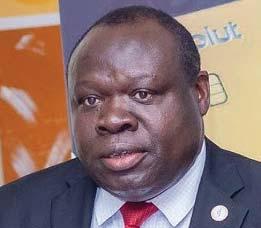
Rwandan High Commissioner to Nigeria, Christophe Bazivamo
The theme for the 2024 WHD is ‘My health, my right’. It was chosen to champion the right of everyone, everywhere to have access to quality health services, education, and information, as well as safe drinking water, clean air, good nutrition, quality housing, decent working and
Meanwhile, the WHO, which said at least 4.5 billion people were not fully covered by essential to $11.1bn and that it would be ready within three years. But it continued to stall.
KPMG: MONETARY TIGHTENING POLICY WILL ATTRACT MORE
FX INFLOWS, BUT NOT ENOUGH TO TAME INFLATION
highest and representing a 200 basis points (bps) increase from the previous 22.75 per cent set in February 2024.
Also, the CBN narrowed the asymmetric corridor to +100/300bps around the MPR in its March meeting after initially widening it to +100/-700bps around the MPR.
Furthermore, the committee left both the Liquidity Ratio and the Cash Reserve Ratio (CRR) unchanged at 30 per cent and 45 per cent, respectively. For merchant banks, however, the CRR was raised from 10 per cent to 14 per cent.
Despite these upward adjustments, inflation remained elevated reaching 31.7 per cent in February 2024. This necessitated the more aggressive response of the apex bank to address inflationary pressures.
These moves, KPMG said, are not only consistent with market expectations, but also reaffirm the independence of the CBN in its conduct of monetary policy, but noted that the CBN needs to guard against the negative impact of the decision.
“We expect the higher MPR to attract greater FX inflows that would drive the appreciation of the Naira in the foreign exchange market. Most of these gains are expected to come from portfolio investments with the risks of sharp reversals when market signals change.
“However, there are risks of inadvertent growth slowdown associated with the policy. With the real sector already burdened by high borrowing costs and inflation, the CBN’s decision could further shrink the sector by disincentivising investments.
“This may adversely affect employment and growth levels. Furthermore, the policy may also give rise to higher non-performing loans. The next few months will be important for assessing the impact of the CBN’s monetary tightening on inflation,” it added.
Statistically, KPMG noted that inflation is set to lose steam after mid-year, largely because of the onset of base effect, except economic policies that significantly pressure prices are implemented by the federal government.
“ Attributing a decrease in inflation solely to the tightening of liquidity once the base effect kicks in after mid-year might be inaccurate,” the consulting firm added.
Addressing Nigeria's supply-side bottlenecks, it posited, is crucial for taming its cost-push inflation, adding that unless the challenges are sustainably addressed, inflation may yield little to monetary tightening.
“The downside of this “hot money” inflow, however, is the risk of sharp reversals in response to changes in market signals. Large
scale capital reversals are historically known to birth macroeconomic instability.
“ Furthermore, we note that targeting inflation from the demand-side (via a sustained monetary tightening of such scale) may inadvertently cause Nigeria to trade-off some growth for lower inflation.
“This is especially worrying as the nation’s growth has been slow, fragile, and decelerating (3.4 per cent in 2021, 3.1 per cent in 2022 and 2.74 per cent in 2023) in recent times. With the real sector already burdened by high borrowing costs and inflation, the CBN's decision could further shrink the sector by disincentivising investments.
“The higher borrowing costs may induce a scale back on investments in the real sector, adversely affecting employment and growth levels. Also, monetary tightening of such scale may give rise to higher nonperforming loans.
“ The higher interest rate environment may strain borrowers’ finances and raise their risk of defaulting on loans,” it added.
These decisions, the firm stressed, restrict the ability of banks to channel credit to support the economy's ambitious growth drive.
Thus, KPMG added that the restrictive monetary policy environment further casts shadows on the attainability of the government's economic objective.
Besides, it posited that there have been concerns that inflation has remained elevated despite previous policy rate hikes. “This is because Nigeria's inflation is largely due to supply-side factors driving cost-push inflation,” it argued.
Impacted by the pump price of petrol which surged by 157 per cent year-on-year in February 2024, and the Naira which depreciated by over 225 per cent between June 2023 and March 2024 in the official market, it said these higher energy and transport costs as well as import prices have affected Nigeria’s highly import-dependent economy.
“Other contributory factors include climate change, continued spates of insecurity affecting strategic farming communities, and increase in Ways and Means withdrawals which raised money supply significantly,” it added.
The research firm said it recognises that price stability is a necessary condition for economic growth, but equally notes that raising interest rates is a natural response to inflationary pressures in monetary policy playbooks.
“However, we emphasise that monetary tightening is more apt for addressing demand-pull inflation.
Thus, inflation may yield little in response to the monetary tightening
efforts, unless the supply-side bottlenecks fanning cost-push inflation are also addressed.
“Eliminating these bottlenecks will require concerted efforts from both fiscal and monetary authorities. We are confident that such efforts will better deliver the intended price stability without trading-off economic growth,” it pointed out.
Meanwhile, Financial Derivatives Company Limited (FDC) has projected that Nigeria’s inflation rate which surged to 31.7 per cent in February, could peak in the second half of 2024 and thereafter begin a gradual decline.
In its monthly Lagos Business School (LBS) Breakfast Session for April, the research and market intelligence firm based in Lagos, described the current rate of inflation in Nigeria as “stubbornly high”, stressing that with effective implementation of policies, the desired economic trajectory can be achieved.
It said that the Purchasing Managers Index (PMI) which essentially measures contraction or expansion in the manufacturing sector, remained flattened at a four-month low of 51 in March, although economic growth remained positive but tepid. The Bismarck Rewane-led group stated that there has been some recovery on the back of a strengthening naira for now, stressing that this is expected to expand in 2025/2026 after flattening in 2024.
“Inflation remains stubbornly high, expected to moderate in H2. Money supply rose sharply by 79 per cent in February, set to moderate in H2. Nigeria policy policymakers are stuck in the middle, that is, either going with the global flow or in search of economic patriotism.
“Inflation is set to peak in May/ June and begin to decline after the wage review, while the external sector remains weak due to currency misalignment,” the report said.
FDC stated that there was the need for ‘new money’, in the form of Eurobond and multilateral funding, plus the completion of numerous standard projects, sale of dead assets and ‘concessioning’ of roads, bridges, airports, and seaports.
It added that there had also been moves for securitising some of the parked ‘ways and means’ advances, engaging with the commercial creditors to refinance existing and maturing obligations as well as constructive engagement with labour on a meaningful living wage.
But on the effects of the planned minimum wage, FDC said it will impact on inflation by increasing firms’ costs of production, while firms would transfer the high-cost rise in wages to the consumers in terms of higher prices.
It stated that there will also be an increase in consumer spending, general price of goods and services will rise, arguing that a higher minimum wage could cause inflation for two reasons.
FDC said that higher wages will cause higher spending by workers, that is, demand-pull inflation and higher costs for firms, leading to wage-push inflation.
Increase in minimum wage , it said, will make labour to be more expensive and could lead to a drop in demand for labour and further result in excess supply of labour, leading to an increase in the rate of unemployment.
However, it maintained that the impact of minimum wage increase on unemployment will depend on real wage rate.
On ways to fund the minimum wage, it said : “In 2019, VAT moved from 5 per cent to 7.5 per cent. VAT can be increased from 7.5 per cent to 10 per cent, improve labour productivity by training and skill development, introduce targeted social programmes such as subsidised childcare, healthcare and housing assistance to support vulnerable workers.
“Gradually phase in minimum wage increases to allow businesses and workers to adjust. Tailor policies to specific sectors such as agriculture, manufacturing, etc.
“Provide targeted support, such as tax incentives, access to credit, and business development services to small businesses, strengthen safety nets to protect workers during transitions such as unemployment benefits, job placement services, and income support.”
In terms of policy outlook, the firm said Nigeria's Gross Domestic Product (GDP) may grow marginally by 3.1 per cent during 2024.
“(There will be) high debt servicing costs due to increased borrowing. Efforts to improve tax collection and other revenue streams will likely continue in the second quarter.
“The roadmap includes three distinct phases: stabilisation, consolidation, and acceleration. Nigeria's fiscal policy outlook aims to strike a balance between reforms, growth, and stability. Effective implementation of policies and prudent management of debt will be essential for achieving the desired economic trajectory,” FDC noted.
Besides, it maintained that at the Nigeria Autonomous Foreign Exchange Market (NAFEM) exchange rate of N1,309,39, the purchasing power parity should be N959.04, concluding that the Nigerian currency is currently undervalued to the tune of 26.76 per cent.
ATIKU RAISES CONCERNS OVER LAGOS-CALABAR HIGHWAY PROJECT
“In August 2021, while Buhari was on vacation, it was announced by then information minister, Lai Mohammed, that the FEC had ‘approved the memo for the ratification of the president’s approval for the award’ of the $11.1 billion project, and that it would be completed in six years. But nothing was done.
"In September 2023, barely weeks after being appointed by Tinubu, works minister, Engr. Dave Umahi, announced that the project had been awarded to Gilbert Chagoury’s Hitech Construction Company Limited (Hitech) without any record of a competitive bidding or a decision by FEC."
Atiku said Umahi refused to reveal how much the project would cost, explaining, "He only explained that it would run through nine states and would have a rail road running through the middle. Most importantly, the works minister said the project would come at zero cost to Nigeria, which is currently facing an all-time high level of debt.”
Atiku further said the works minister even stated, “Let me announce that it is under public-private partnership. The Hitech group are going to look for the money. They have already found the money, and that is the good news because we don’t waste our time talking and holding meetings and wasting resources.”
The former vice president explained that the concept of the project was “build, operate and transfer”, meaning that Hitech would construct the road, operate it for some years, and recoup its money through tollgates before handing it back to the Nigerian government.
He stressed, "Because the project did not require public funds, it did not go through approval from the National Assembly, which holds the power of appropriation.
“Also, the project only went through the Infrastructure Concession Regulatory Commission (ICRC) with no record of a competitive bidding since Chagoury’s firm was to fund the project 100%.
"However, to the shock of many Nigerians, Umahi returned to FEC with a memo in March 2024 seeking the approval of N1.06 trillion that would be paid to Chagoury’s firm for the first phase of the project, which is wholly in Lagos.
"This pilot phase was to begin from the edge of Chagoury’s Eko Atlantic City on Ahmadu Bello Way, Victoria Island, and terminate at the Lekki Deep Sea Port, Ibeju-Lekki, a distance of 47.47km.
“Till date, the Tinubu administration has refused to reveal how much the project will cost in total. Umahi, who even came on Channels Television recently, evaded questions as to the total cost of the project."
The former PDP presidential candidate added, "But if 47.47km costs about N1.06tn, it means each kilometre is being built at N22.5 billion or $18 million. For a project that is going to be 700km, it means the total
cost could be N15.7 trillion or $12.56 billion, which is higher than previous estimates.
“It is curious that the terms of such an audacious project continues to be shrouded in secrecy. Worse still, it is expected to lead to job losses, like the demolition of Landmark Beach Resort in Oniru, which will lead to the loss of over 12,000 direct and indirect jobs and over $200m in investments, according to its management.
"More curious is the fact that the entire pilot phase of this project begins and ends in Lagos, especially within the axis of Bola Tinubu’s business interests. It is no secret that both Tinubu and Chagoury are business partners.”
Atiku further stated, "This same Hitech, owned by Chagoury, was unable to complete the 50km Lekki-Epe Expressway. Despite installing two tollgates along the axis, Hitech, which was part of the Lekki Concession Company (LCC) consortium, was only able to construct about 20km, forcing the Lagos State Government to buy it back at the cost of N7.5 billion ($50 million at the time) in 2013, which came at a loss to the people of Lagos."
Atiku explained, "Tinubu has once again put his personal business interest ahead of that of the Nigerian people in violation of his oath of office where he swore that, ‘I will not allow my personal interest to influence my official conduct or my official decisions’.
''The so-called pilot phase from Eko Atlantic to Lekki Deep Sea Port was initially conceived as a Lagos State Government project, but because of its huge cost coupled with the fact that Lagos State has a huge debt burden, no thanks to Tinubu, the federal government is now implementing it under the guise of Lagos-Calabar Coastal Highway. This, perhaps, explains why there are fears that the project will never get to Calabar, and this is the same reason the project is beginning from Lagos and not Calabar.
"Despite not revealing the cost of this entire project, the Tinubu administration is now on the verge of setting up a so-called Renewed Hope Infrastructure Development Fund, a fund targeted at constructing capital projects without the usual budgeting process.
"With a target of N20 trillion or $14.5 billion as seed capital, the fund targets the Lagos-Calabar coastal highway and other projects. The initiative targets Pension Funds, Concessionary Loans, insurance companies, sovereign wealth funds, private sector arms of multilateral development institutions, and bilateral private sector investors, among others, to secure $35bn annually. The Diaspora funding and equity and endowment funds are also expected to play their part in the plan.
"But this renewed hope fund, which will be spent at the discretion of Tinubu and without transparency, will likely become another means of siphoning public funds through shady projects.”
Atiku said, “With the current Lagos-Calabar highway already being handled in secrecy, it remains to be seen how such a fund will be managed."
THISDAY • MONDAY, APRIL 8, 2024 PAGE FIVE
5
on page 46
Continued
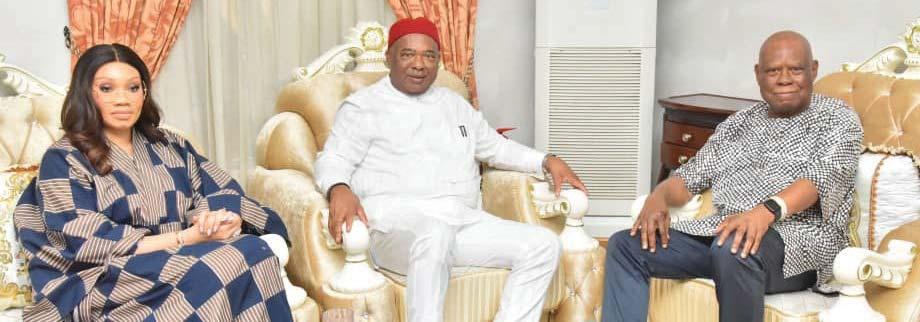
CONDOLENCE VISIT TO THE WIGWES...
Governor Hope Uzodimma of Imo State, (M) flanked on the right by his wife, Chioma, and on his left by Pastor Shyngle Wigwe, father of late Group Managing Director/CEO of Access Corporation, Herbert, when the Governor visited the Wigwes at their Lagos home... weekend
FG Begins Engagement on Review of Land Transport Policy in Nigeria
James Emejo in Abuja
The Minister of Budget and Economic Planning, Senator Atiku Bagudu and his counterpart in the Transportation Ministry, Senator Ahmed Alkali, have held strategic discussions on the review of the National Land Transport Policy.
Speaking over the weekend, Bagudu said the interaction centred on the most important action that could ensure good results from the policy, especially the need to incorporate Public Private Partnerships (PPPs) arrangement to attract support from stakeholders.
He pointed out that at the last Federal Executive Council (FEC) meeting, the Renewed Hope Infrastructure Initiative was approved. This, he said, was designed to ensure that the council captured some of the elements in the funding arrangement which
Road Crashes: Prosecution of Recalcitrant Road Offenders in Top Gear, Says Biu
The Federal Road Safety Corps (FRSC) weekend said its collaboration with the Nigeria Bar Association (NBA) was already yielding results as prosecution of recalcitrant offenders, including drivers involved in ghastly crashes were in top gear.
This was even as it added that it had deployed radars as well as breathalyser equipment to put a check on drunk-driving and over-speeding.
The Corps Marshal, FRSC, Dauda Biu gave the hint at the official flag-off of 2024 Sallah motor rally at Dankogi Park, Zuba.
Biu said the theme for this year’s rally which is: ”Overloading is a Time Bomb: Stop the Deaths, Do not Overload with Persons, Animals or Goods” was apt and could not have come at a better time than now.
According to him, the FRSC was working assiduously to ensure a significant shift in the attitude of motorists this year 2024, explaining that as such, "Nigerians must be aware that frequent cases of road crashes on our roads are not linked to any spirit killing people, rather, an increase in human and vehicular movement, bad driving behaviour, and impatience”
He added: "Part of our efforts towards sanitising the highways is the inter-agency Joint Task Force (JTF) recently constituted to operate along critical corridors in different states of the federation.
"The mandate of the JTF is to mitigate trailer related crashes and fatalities as well as stop the use of trailer to convey passengers. This is because prior to the inauguration of the JTF, the Corps recorded a number of avoidable crashes that involved trailers loaded with goods, animals
and passengers leading to deaths and injuries.
"In line with the mandate of the JTF, the various teams have been able to apprehend 35 trailers carrying 982 passengers. From the aforementioned number, a total of 19 trailers carrying 810 people were apprehended on the Abuja-Kaduna expressway.
“While, the JTF team covering Bauchi-Maiduguri general operation area of the Corps also arrested 16 trailers conveying 172 passengers on that route. These arrests were perfected within the first one week beginning from 23 to 30 March, 2024 of its operations on the identified routes."
Speaking further, he stressed that the constitution of the inter-agency JTF has become overly significant to bring to an end to cases of road crashes involving trailers like that of 04 March, 2024 in Tashan Yari where a trailer loaded with grains and passengers crashed and killed 12 persons.
Others, he said were that of March 18, 2024 where a trailer loaded with goods and 172 passengers crashed on the Kaduna-Abuja expressway, killing 10 people; as well as that of Sunday March 31, 2024 in Obajana which led to the death of 13 people.
Going by the remote and immediate causes of these crashes, the FRSC boss noted that it was apt to affirm that drinking and driving, overloading of vehicles, use of worn out tyres, overloading, lane indiscipline, excessive speed, wrongful overtaking, do not only pose a threat to the life of the driver, but also to the lives and properties of all road users.
"Such bad driving behaviours are still threats to the state of road infrastructures which costs a lot of tax payers’ resources to produce.
"As part of efforts to deal with these challenges, the Corps came up with the idea of taking the message of safety down to all of us at the motor parks quite early due to the critical role the union officials play on the road; as a prelude to massive deployment of personnel and logistics to the highways, particularly at the black spots for the containment of the perennial traffic gridlock and the accompanying hazards.
"The Corps has also put in place, key strategic measures to combat crashes on the road. These initiatives include the flag-off of JTF against use of trailers to convey human beings which contradict the original design of the vehicle," he stated.
Continuing, he said that FRSC had also ensured the commencement of enforcement on overloading of vehicles and the intensification of Mobile Court operations nationwide.
"The year 2024, therefore, may present yet another challenge and that is why we have come out to tackle it head–on with commitment and determination, as evidenced by the comprehensive measure we are putting in place to address the dreadful experiences we have.
"To achieve this feat, the Corps has deployed operational equipment in the categories of radar guns, breathalysers to put a check on drunk driving and over speeding. More so, I also directed that all Zebras must be active 24/7 and be responsive to calls within the minimum FRSC response time to crashes that might be reported.
"In the same vein, all commanding officers have equally been directed to step up patrol operations and ensure strict enforcement of critical offences like overloading, driving rickety vehicles, excessive smoke emission.
could reduce the drawback that had affected or limited the implementation of the policies, the development plan, as well as the agenda 2050. Bagudu, in a statement issued by the Director, Information, Ministry of Budget and Economic Planning, Mrs. Julie OsagieJacobs, however, commended his counterpart for the laudable policies and projects which he said, were necessary for the development of the country. In his earlier remarks, Alkali said the Nigerian transportation sector was in dire need of a good
and workable policy.
He said: "It is in the realisation of this that I inaugurated a technical committee in January, 2024 to review past efforts and develop a sustainable Land Transport Policy framework".
Alkali said the policy was focused on the traditional land transport mode of rail and road, which were currently the weakest links in transport and logistics value chain.
The minister, however, noted that it would serve as a blueprint to build a transportation system that would meet the needs of
the people.
He further sought for an embracing consensus on the nation's land policy that would stand the test of time and advance the vision of President Bola Tinubu’s Renewed Hope agenda for Nigeria transportation sector.
Other dignitaries at the meeting included the Permanent Secretary, Budget and Economic Planning, Mr. Nebeolisa Anako, Permanent Secretary, Federal Ministry of Transportation, Mr. Olufemi Oloruntola, and senior management staff from both ministries.
FG Declares Tuesday, Wednesday
Public Holidays for Eid-el-Fitr
Michael Olugbode in Abuja
The federal government yesterday declared Tuesday April 9 and Wednesday April 10, 2024 as public holidays to mark Eid-el-Fitr celebration.
The Minister of Interior, Dr. Olubunmi Tunji-Ojo, who made the declaration on behalf of the federal government congratulated all Muslims for the successful completion of the fasting in the holy month of Ramadan.
Tunji-Ojo called on Muslims to imbibe and practice the virtues that entail kindness, love, tolerance, peace, good neighbourliness, compassion as exemplified by the Holy Prophet Muhammad. He urged Nigerians to continue in the spirit of unity in order to improve and achieve peace and oneness in the country.
“The minister wishes all Muslim Ummah a happy Eid-el-Fitr celebration and prays that the peace, blessings and favour of Allah be with everyone and our Great Nation,” the statement added.
Tinubu Rejoices with Alliyu Oduwole on 80th Birthday Obaseki lauds Olayiwola’s commitment to upholding justice
Deji Elumoye in Abuja
President Bola Tinubu yesterday congratulated an Ijebu Prince, Alhaji Alliyu Babatunde Oduwole, as he marks his 80th birthday.
According to a release issued on Sunday by presidential spokesperson, Ajuri Ngelale, Oduwole, an active citizen and believer in Nigeria's potential for greatness, has embarked on many lofty advocacies to promote public accountability, peace, and dialogue.
In 2015, the statement said he created a plethora of fora to discuss 'Project Nigeria'; held citizen-engagement meetings, and submitted a memorandum on constitutional amendments to the National Assembly in 2022.
In 2018, it stated that he founded the United Muslim Community Care Foundation to feed indigent Nigerians of all religious persuasions.
The foundation, it added, has been feeding many families during this Ramadan and providing them with some stipends.
“As Alhaji Oduwole marks the milestone birthday, the president wishes him good health and renewed vigour in his service to humanity,” it added.
Meanwhile, the Edo State Governor, Mr. Godwin Obaseki, has felicitated lawyer and philanthropist, Afolabi Olayiwola (SAN) on his birthday, extolling his commitment to upholding justice and equity in society.
In a statement, the governor
described him as a hardworking and diligent legal practitioner, who has distinguished himself over the years by virtue of his dedication and commitment to upholding justice and equity in the course of his career.
The governor added: “Firebrand and meticulous, you have continued to gain admirers by the virtue of your philanthropic gestures and antecedents in fighting for the rights of the downtrodden.
“I celebrate your impactful work and commitment to ensuring a sane and equitable society, where the rule of law is respected.
“As you celebrate today, I pray that God grants you many more years in good health to continue your impactful work in society.”
6 THISDAY • MONDAY, APRIL 8, 2024 NEWS Group News Editor: Goddy Egene Email: Goddy.egene@thisdaylive.com, 0803 350 6821, 08074010580
Kasim Sumaina in Abuja

MONDAY APRIL 8 , 2024 • THISDAY 7
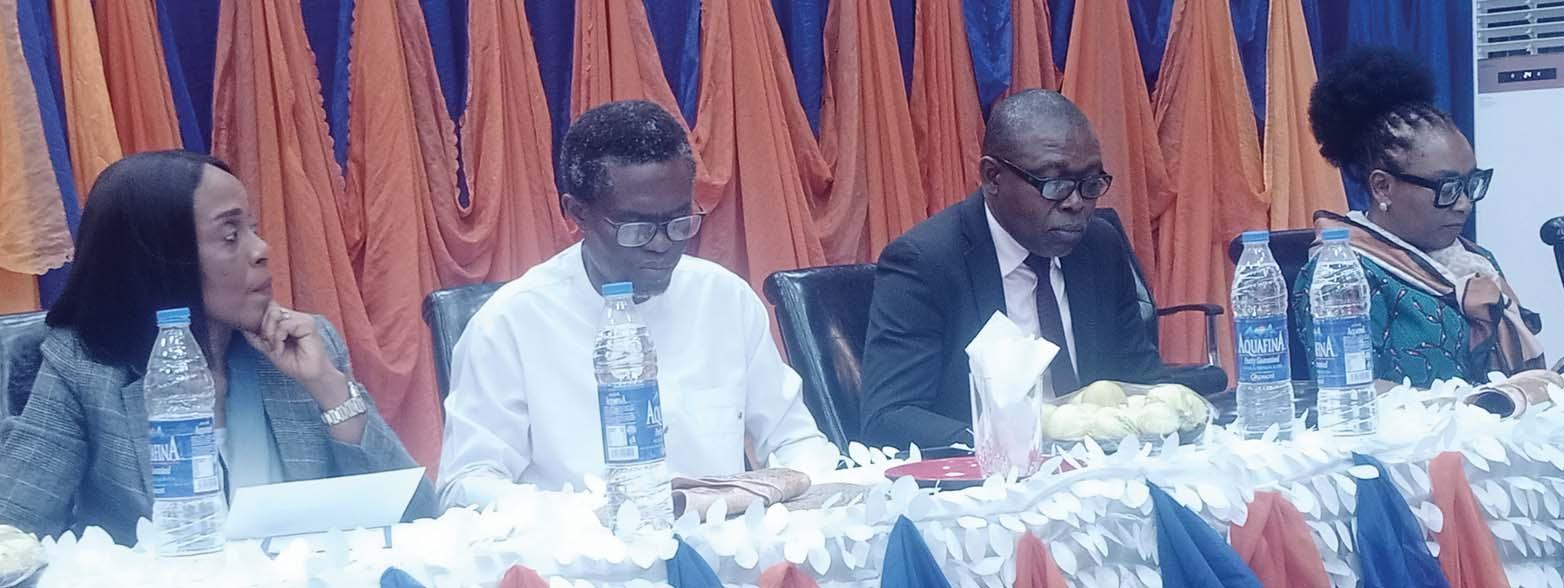
INAUGURAL LECTURE OF CENTRE FOR REGIONAL INTEGRATION AND TRADE RESEARCH...
L-R: Executive Vice President, African Export-Import Bank (Afreximbank), Mrs Kanayo Awani; Deputy Vice Chancellor of Nnamdi Azikiwe University, Prof Joe Ikechebelu; Chairman of the occasion, Prof Eric Ofoegbu and Director of International Center for Regional Integration and Trade Research, Nnamdi Azikiwe University, Awka, Prof Ngozi Egbuna, during the inaugural lecture at the center, at the weekend
Afreximbank: We're Working Hard to Enhance Trade Among African Countries
David-Chyddy Eleke in Awka
The African Export-Import Bank (Afreximbank) has said it is working hard to not only enhance trade among African countries, but also simplify it for the economic benefit of all member nations.
The Executive Vice President of the bank, Mrs Kanayo Awani stated this at the Nnamdi Azikiwe University, Awka, Anambra State, at the weekend, during the inaugural lecture series of the International Centre for Regional Integration and Trade Research, in the university, which was sponsored by the bank.
Awani who was the guest lecturer spoke on the Theme: ‘Unlocking Africa Trade for Shared Prosperity Through the AfCFTA: Challenges, Prospects and Opportunities, said the bank has devised several platforms to simplify trade among African countries.
Awani said the theme of the maiden lecture was apt, considering the interconnectedness of the world today, adding that African can boost its trade for a shared prosperity among countries within the continent.
She said: "This is apt and timely. Just a few years ago, the world was witnessing a pandemic; the COVID 19 pandemic. There was supply chain disruption which caused food shortage across the world.
"Today too, some countries are
facing shortage of grains because of the Russian-Ukrainian war, this has widely demonstrated that a well structured intra-continental trade can be of benefit to Africa.
"At Afreximbank, we have made policies and created several platforms to enhance trade among African countries, and we have been sensitising countries on the need to take advantage of this."
Earlier, the Chairman of the occasion, Eric Ofoegbu, a professor of mathematics in the university described the lecture as timely, coming at a time when the Nigeria is thinking of a way to enhance its trade and beat down the dollar, as a way to strengthen the naira.
"The lecture series came at a point when there is great need for us (as an entity) to break away from bondage of operating only in a “closed system” that is about suffocating us. It came at an epoch in history when it is inevitable to think out of the box in order to embrace economic and financial freedom that awaits us outside the box.
"The current trend in our society as it concerns economic instability is an eye opener. Being salary earners hoping only on our monthly emoluments without thinking about how to genuinely attract extra financial supplements may end us up in man-made squalor and misery in the midst of plenty.
"In terms of making beautiful and wonderful policies, we are seemingly on top; but when
EDUCASH: Ogun Earmarks
The Ogun State Government said N3.5 billion have been earmarked for the ongoing Educash transfer programme of the Governor Dapo Abiodun-led administration.
About 100,000 indigent pupils in public primary and secondary schools, as well as 50,000 students in tertiary institutions across the country, will benefit at the end of the exercise.
The state government also disclosed that over 40,000 students and pupils in primary and secondary school have so far benefited from the programme.
Commissioner for Education, Science and Technology, Prof. Abayomi Arigbabu, who stated this shortly after monitoring the cash transfer to parents of indigent students in public primary and secondary schools in the Remo Division of the state, promised that no one would be left out. He said: “At the end of the day, the intention is to pay almost 50,000 tertiary students. We have captured their data; we have just a little bit less than 50,000. That is over N2.5 billion for the tertiary level.
it comes to implementation, everything takes an unimaginable direction.
"It is my hope and belief that whatever level of partnership and collaboration this gathering will usher in, shall be an enduring and sustainable one, and shall
be beneficial to all concerned. Whatever agreement that will be reached at the end shall not be on paper only, but shall be kept in tangible view for all concerned to see," he said. Director of International Centre for Regional Integration and Trade
Research, Prof. Ngozi Egbuna,in an opening address said: "Trading is what we all do as individuals and between nations and it bonds relationships between nations engendering regional integration and cooperation for peace, stability and the creation of wealth.
"As Africa and Nigeria march on towards the actualisation of the African Continental Free Trade Area (AfCFTA) agenda, it is a critical step toward sustainable and inclusive development that will provide solutions to Africa's perennial economic problems."
National Assembly to Review Armed Forces, Security Acts to Ensure Gender Equity
Sunday Aborisade in Abuja
Relevant committees of the National Assembly, both in the Senate and the House of Representatives will soon begin a comprehensive review the Acts of the Nigerian Armed Forces and those of other security agencies in the country, to make the law gender-responsive.
Apart from this, the amendment of the Acts of Armed Forces, the Nigerian Police Force and that of the Nigerian Security and Civil Defence Corps (NSCDC), will also provide social dimension to security aimed at protecting women and children during insurgency, banditry and kidnapping.
The Director General of the National Institute For Legislative and Democratic Studies, (NILDS), Prof Abubakar Sulaiman, disclosed this during an interactive session with journalists at the weekend.
N3.5bn
“At the primary and secondary school levels, we are going to eventually pay 100,000 pupils, that is N1 billion. 100,000 indigent students are targeted so that their parents will get N10,000 each. As of today, we have paid 20,000 students through their parents.
He explained that the project also had a full support of the President of the Senate and Chairman of NILDS Governing Council, Senator Godswill Akpabio, as well as the Speaker of the House of Representatives and Alternate Chairman of the Council, Rt. Hon. Tajudeen Abbas.
Sulaiman said the team of NILDS experts in collaboration with the UN Women took the initiative to strengthen gender-responsive security sector policy reforms and implementation of gender policies adopted by target security institutions.
He explained that the overall objective of the project was to sensitize the National Assembly and enlighten the security sector
Sulaiman said the NILDS was already working on a project tagged: "Enhancing Gender Responsive Security Operations and Community Dialogue Project II" with support from the United Nations Entity for Gender Equality and the Empowerment of Women (UN Women).
for 150,000 Beneficiaries
“At the tertiary level, as we speak, we have paid over 20,000 students, N50,000 each.”
The Commissioner also said that monitoring the transfer was just a symbolic exercise as the state can boast of over 2,000 primary and secondary schools, even as he assured parents who are yet to receive the money to remain calm as it would soon be their turn.
His words: “The schools that we have been to are just a tip of the iceberg. How many schools can we get to out of the almost 2,100 primary and secondary schools? But, we did these ones symbolically to let people see that the governor is a promise
keeping governor. “I want to assure parents who haven't gotten their own that it is coming because we are paying in batches. Apart from that, don't forget, there can be issues of network.
"If anybody for any reason didn't get it, let us know through the principal, and we will look into it because nobody is going to be given cash. It will still have to be transferred to their accounts.”
In her remarks, the Special Adviser to the Governor on Education, Mrs. Ronke Soyombo, admonished parents not to use the money for their own personal needs but to ensure that they prioritized the future of their children.
institutions on the need make their Laws and Acts gender-responsive.
He said: "Indeed, Nigeria’s security sector institutions are major actors not only in the prevention and response to security issues in Nigeria, but also to strategic conflict resolution and peacebuilding initiatives.
"While these security sector institutions have striven to achieve their mandates over the years, huge gender gaps are visible in their policies and operational procedures at all levels, as well as their enabling legislations.
"Yet, ensuring women’s meaningful representation in the security sector is critical to building an inclusive, responsive, and accountable security sector that reflects the diversity of the community it serves and better respond to their needs.
"This has been increasingly identified as a key strategy and supported by global normative frameworks, including the United Nations Security Council Resolution (UNSCR) 1325 (2000), among other international instruments.
"As a result of this, there is need to review the security sector institution’s legislation to become more gender-responsive.
"It is against this backdrop that I am pleased to inform you all that NILDS, with the support of the UN Women is implementing the Enhancing Gender Responsive Security Operations and Community Dialogue Project II.
"This Project aims to work with the Nigerian National Assembly and identified Security Sector Institutions on the need to make their laws and Acts more gender-responsive.
"The project also seeks to strengthen gender-responsive security sector policy reforms and implementation of gender
policies adopted by target security institutions."
Sulaiman said the project specific objectives included, increased women’s effective participation in peace and security processes; peace negotiations; conflict prevention and resolution, and improved public perception of the role of women in peace and security at all levels.
He added that the project was designed in response to gaps identified in women’s representation in the security sector and the broader need for a gender-responsive approach to security operations.
He said: "This project aims to enhance gender-sensitive security sector and foster community dialogue between women affected by conflict and security sector actors.
"In order to achieve the aforementioned, NILDS collaborated with the National Defence College (NDC) in carrying out several advocacy visits to relevant security Committees of the National Assembly, as well as the leadership of the Nigerian Air Force, Navy, Army and NSCDC.
"This is in order to sensitise them on the need for their laws and gender policies to be genderresponsive through the review and amending of Security Sector Institutions laws.
"Other activities implemented include, consultative meeting between NILDS and NDC with gender desk officers, a three-day Strategy meeting with Security Institutions & National Assembly Security and Women Committees Chairmen and Vice Chairmen/Clerk of committees."
He also said that the NILDS had provided technical support to guide the sector’s gender-responsive legislative and policy reform and foster strategic engagements with the relevant committees among other activities.
8 THISDAY • MONDAY, APRIL 8, 2024 NEWS
James Sowole in Abeokuta

MONDAY APRIL 8 , 2024 • THISDAY 9
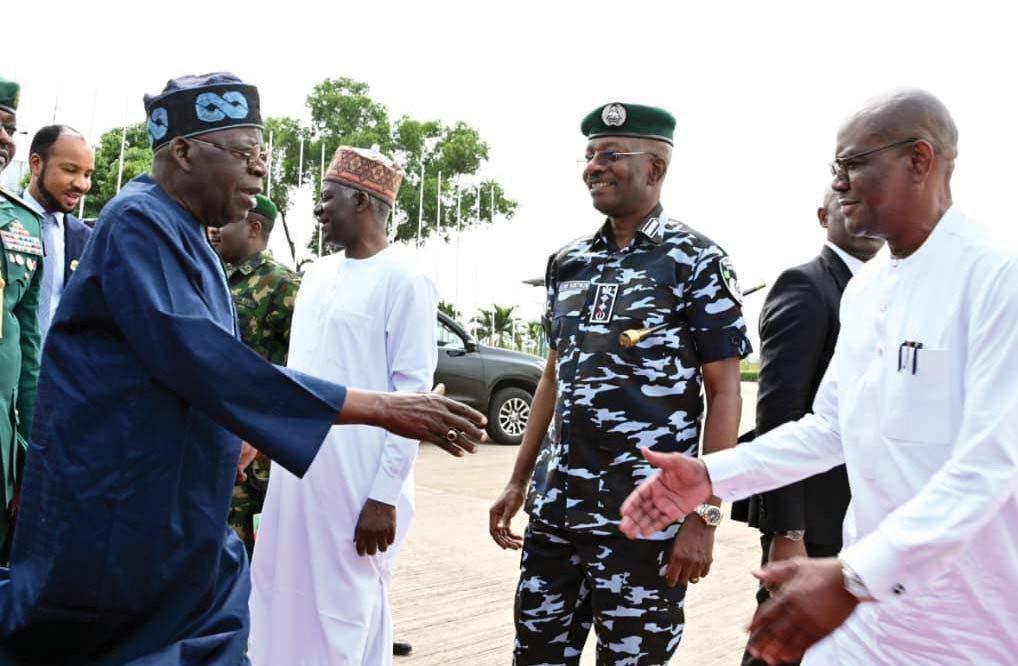
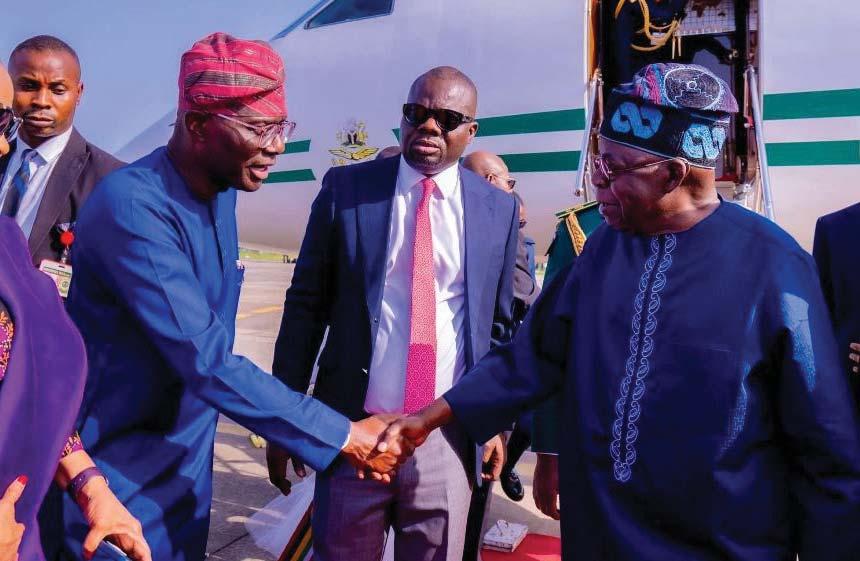
TINUBU DEPARTS ABUJA, ARRIVES LAGOS FOR SALLAH...
NPAN, NGE, NUJ, Others Demand Probe into Olatunji’s Detention, Prosecution of Perpetrators
Issues FG 14-day ultimatum to publicly apologise, compensate abducted journalist
Several media organisations and Civil Society Organisations (CSOs) yesterday called for a thorough investigation into the illegal arrest of a journalist, Segun Olatunji from his Lagos home.
A statement in which the demand was made was jointly signed by Kabiru Yusuf, President, Newspapers Proprietors Association of Nigeria (NPAN), who also doubles as President, Nigerian Press Organisations (NPO) as well as Dr. Yemisi Bamgbose, the Executive Secretary, Broadcasting Organisations of Nigeria (BON).
Others were: Eze Anaba, President, Nigerian Guild of Editors (NGE); Chris Isiguzo, National President, Nigeria Union of Journalists (NUJ); Maureen Chigbo, President, Guild of
Corporate Online Publishers (GOCOP) and Musikilu Mojeed, President, International Press Institute, Nigeria Chapter (IPI Nigeria) Also on the list of those who endorsed the statement were: Edetaen Ojo, Executive Director, Media Rights Agenda (MRA); Lanre Arogundade, Executive Director, International Press Centre (IPC) and Adetokunbo Mumuni, Director, Socio-Economic Rights & Accountability Project (SERAP).
“The undersigned media organisations, media associations and professional bodies as well as civil society organisations wish to express our deep concern and strong condemnation regarding the recent unlawful arrest, detention, brutalisation and torture of Mr. Segun Olatunji,
Editor of FirstNews newspapers, by military personnel in response to stories published by the media outlet.
“We hereby demand a speedy, public, transparent and independent investigation into this act of barbarism displayed by military personnel as well as the brazen disregard for the constitution and the government’s obligations under relevant domestic laws and international instruments.
“We further demand that all persons within and outside the military who are found to have been connected with this unacceptable violation of the rights of the journalist and the constitution, including those who effected Mr. Olatunji’s arrest, detention and torture, those who directly commanded them, and those who ordered or instigated the
action, should be prosecuted before the appropriate court and punished to the full extent of the law,” the groups demanded.
According to the aggrieved groups, the Chief of Defence Intelligence (CDI), who commands the Defence Intelligence Agency (DIA), Maj. Gen. Emmanuel Undiandeye, reportedly ordered the operation that culminated in Olatunji's abduction, torture, and detention.
They further alleged that the Chief of Defence Staff, Gen. Christopher Musa, to whom the CDI reports, was also reportedly aware of the operation but joined the CDI to claim for days that the journalist was not in their custody, adding that they need to be held accountable for their roles in the matter.
India-bound Passenger Caught with 80 Wraps of Ingested Cocaine
Michael
Olugbode
in Abuja
Operatives of the National Drug Law Enforcement Agency, NDLEA, have arrested a Delhi, India-bound passenger, Freeman Ogbonna at the screening point of terminal 2 of the Murtala Muhammed International Airport, Lagos for ingesting 80 wraps of cocaine.
According to a statement yesterday by the spokesman of the anti-narcotics agency, Femi Babafemi, Ogbonna was arrested on March 31, while attempting to board a flight to Delhi, India via Doha on Qatar Airways, with a Liberian international passport, bearing the name: Carr Bismark. He was taken for body scan, which tested positive for ingestion of illicit drugs, and preliminary checks revealed his real identity as Freeman Ogbonna and was subsequently placed under observation in NDLEA custody where he started to manifest signs of discomfort.
Babafemi said that Ogbonna obviously choked by the volume of illicit drugs in his stomach and another substance taken to hold back excretion, he soon began to retch before starting to vomit and excrete wraps of cocaine he ingested almost simultaneously. He said the suspect, who
claimed he was recruited into drug trafficking by one of his relatives, eventually passed out a total of 80 wraps of cocaine weighing 889 grammes through his mouth and anus over a period of four days.
Ogbonna was said to have claimed that he was given the drugs to swallow at a hotel in Ipodo area of Ikeja with a promise of N300,000 cash reward on successful delivery.
Babafemi said NDLEA officers at the Lagos airport had last Wednesday intercepted a drug mule, Imran Olalekan at Gate C departure of terminal 1 travelling to Oman with a check-in luggage and a backpack. When his check-in bag and backpack were subjected to thorough search, the operatives discovered a false bottom concealment of drugs in the check-in luggage and in the walls of the backpack.
he NDLEA officers, he said, swiftly moved in on a man who accompanied the suspect to the airport. He was later identified as Ishola Olalekan who recruited the trafficker.
Imran Olalekan told NDLEA officers he returned from Dubai some years ago but still has a valid residence permit on his old passport. He claimed he was promised N1.5 million
if he successfully delivers the consignment in Oman, while his recruiter, Ishola was to be paid N200,000. Babafemi said when the two bags were completely unpacked at the NDLEA office, a charm was found in one of the bags while another one was found on the drug mule who confessed that he travelled to Ibadan, Oyo state to meet with an ‘Alfa’ that prepared the charm for him to ensure he was not caught during the trip. He also said another charm was found on the intermediary, Ishola Olalekan who accompanied Taofeek to the departure area of the airport. Ishola claimed he procured the charms for the sum of N70,000.
At the Tincan seaport in Lagos, NDLEA operatives also last Wednesday intercepted 2,144 parcels of Colorado, a synthetic strain of cannabis weighing 1,072 kilogrammes. The seizure was made during a joint examination with Customs Service and other stakeholders of a container marked GAOU 6699215 coming from Montreal, but originated from Toronto, Canada.
He said the drugs packed in 46 jumbo bags were found concealed in used 2009 Lexus RX 350, 2011 Toyota Sienna, and 2009 Lexus ES 350 as well as used engines,
automobile doors, tyres, and used household goods as well as big drums loaded into the container.
In Kano, a 48-year-old suspect, Gidado Sani who jumped the bail granted him by a Federal High Court in Kano on drug offence charges, was last Friday re-arrested in Sharada area of the state with 85 blocks of cannabis weighing 50.1 kilogrammes, while NDLEA operatives in Ogun state last Thursday arrested another suspect Wasiu Jimoh, during a raid operation at Ilese Awo, with 84 parcels (62 kilogrammes) of cannabis sativa.
He added that operatives in Lagos last Wednesday intercepted a suspect, Emeka Umeh with 506.2 kilogrammes cannabis at Igbede, Ojo area of the state, while another suspect, Victor Okeke was nabbed last Friday at Igbo Elerin, Ojo, with 142 grammes of cannabis sativa and 175 litres of skuchies recovered from him.
Also, an attempt by 35-year-old Ifeanyi Udogwu to smuggle 1.5 kilogrammes cocaine concealed in music speakers from Lagos through Aba, Abia state to his uncle, Ifeanyi Udogwu based in Cameroon was thwarted last Wednesday when NDLEA officers working in collaboration with
The media advocacy groups recalled that armed men wearing military uniforms and who introduced themselves as military personnel from the Nigerian Army, the Nigerian Air Force and the Defence Intelligence Agency (DIA), led by a military officer who also introduced himself as Col. Lawal, invaded Olatunji’s home in a Lagos suburb on March 15, 2024.
The forces, they said, also seized Olatunji’s mobile phone, handcuffed and bundled him in one of their vehicles and was flown blindfolded to Abuja where he was kept in an underground cell for 14 days.
Stripped to his boxers , legs manacled hands in cuffs, kept incommunicado and not informed of his offence or the reason for his arrest nor of his rights as required by law, as guaranteed under the constitution, they noted that Olatunji was only released on March 29, 2024.
“He was repeatedly interrogated about stories published by FirstNews in the absence of a legal practitioner of his choice because he was not given
the opportunity to consult a lawyer. His mobile phone was also unlawfully searched in an effort by his abductors to ascertain the sources of the stories published by the news outlet.
“Given the above, we unequivocally condemn this gestapo-like, unlawful and unconstitutional treatment of a journalist under a constitutional democracy simply for doing his job,” they stated.
They urged the federal government to conduct a speedy, public, transparent and independent investigation into the incident in order to identify all persons within and outside the military who were connected with the violation of Olatunji’s rights.
“There should be full accountability for all those responsible. Therefore, all persons within and outside the military who are found to have been connected with the incident, including those who effected Olatunji’s arrest, detention and torture, those who directly commanded them, and those who ordered or instigated the action, should be prosecuted before the appropriate court.
Edo Boosts Telemedicine, Primary Healthcare Delivery with Fibre Optic Internet Infrastructure
The Edo State Head of Service, Dr. Anthony Okunbowa, has said that the spread of fibre optic internet infrastructure across the 18 local government areas of the State will improve primary healthcare and telemedicine.
In his remarks during telemedicine workshop held in Benin City, with the theme, “Delivering Value in Primary Health Care: The Role of Telemedicine”, the HoS said with fibre optic connection across the 18 local councils in Edo, primary healthcare centres can leverage access to the internet to improve delivery of quality healthcare.
He said: “Through telemedicine we can actually harness the power of technology to overcome the barriers that have plagued our primary healthcare system.
“With the advent of telecommunication networks, video conferences, mobile applications, medical advice, consultations diagnosis can be delivered remotely reaching those in need regardless of the
geographical limitations.
“The novel initiative is made possible by his Excellency with the connection of fibbers optics across the 18 local government areas in Edo State. This not only saves time and resources but also ensures quality healthcare services are readily available even in the most remote areas.”
On his part, the Commissioner for Health, Dr. Samuel Alli, said the Governor Godwin Obaseki-led administration has continued to reposition primary healthcare centres through strategic interventions. He noted: “In the last two years, we have renovated over 50 facilities and we have also deployed personnel there with the goal that at least there should be one primary healthcare centre functional per each ward. We have a template; we have the design.
“We do not want us to begin to view primary healthcare centres as clinics for poor people and for rural dwellers. It is for everyone who needs the services.”
NEWS
Emmanuel Addeh in Abuja
10 THISDAY • MONDAY, APRIL 8, 2024
transport company, Young Shall Grow Motors, arrested him.
President Bola Ahmed Tinubu; Director General of State Security Service, Yusuf Bichi; Inspector General of Police, Olukayode Egbetokun, and FCT Minister Nyesom Wike as president departs Abuja for Eid-el-Fitr Sallah celebration in Lagos...yesterday
President Bola Tinubu (right) being welcomed by Governor of Lagos State, Mr. Babajide Sanwo-Olu (second left) and Secretary to the State Government, Barr. Bimbola Salu-Hundeyin (left) during the President’s arrival at the Mohammed Murtala International Airport, Ikeja, Lagos ahead of the Eid-el-Fitr celebration...yesterday
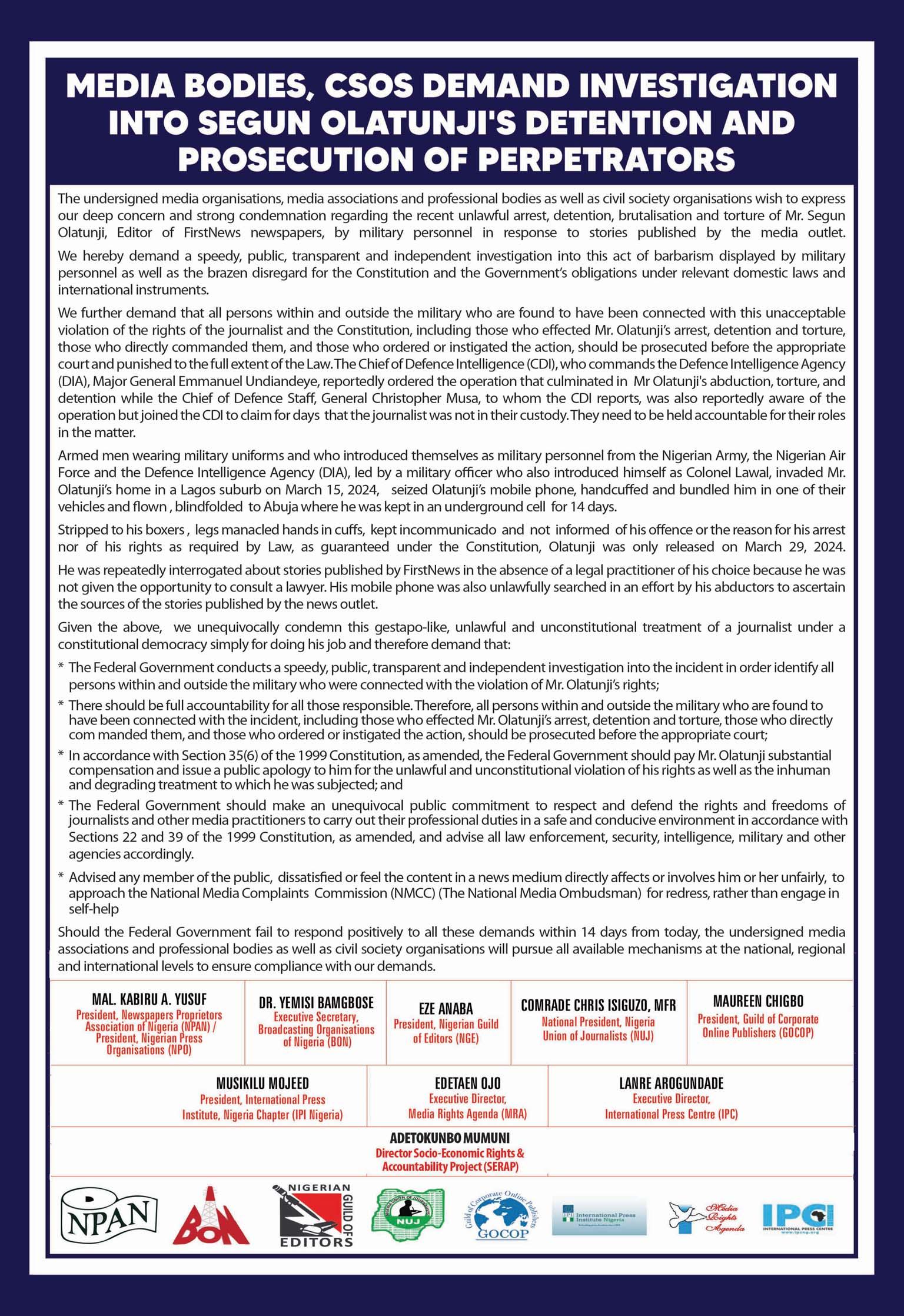
MONDAY APRIL 8 , 2024 • THISDAY 11
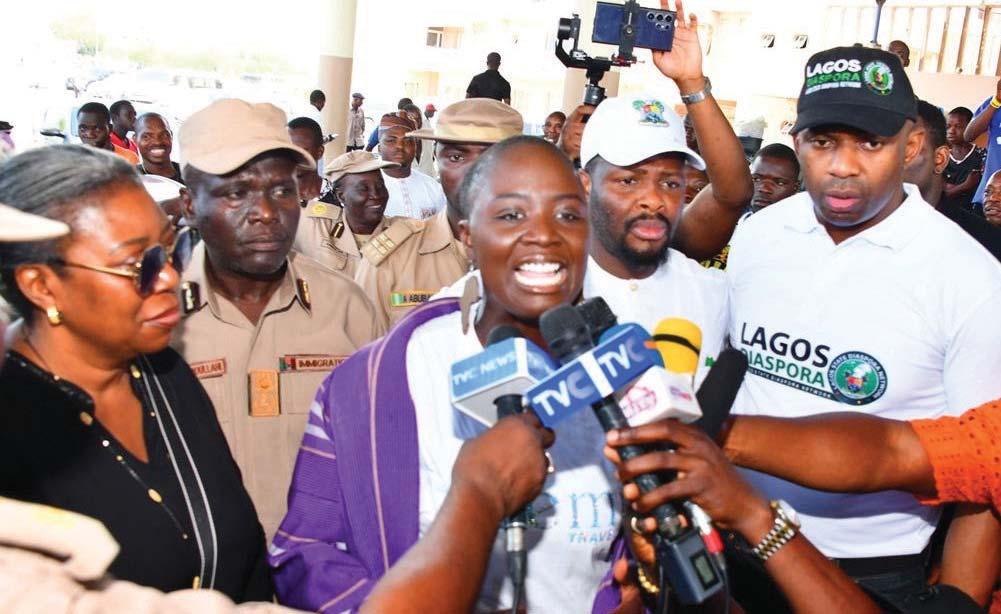
FROM LONDON TO LAGOS BY ROAD...
Ms. Pelumi Nubi speaking to the media (second left); Commissioner for Tourism, Arts and Culture, Mrs. Toke Benson-Awoyinka (left); Special Adviser to the Governor on Tourism, Arts and Culture,
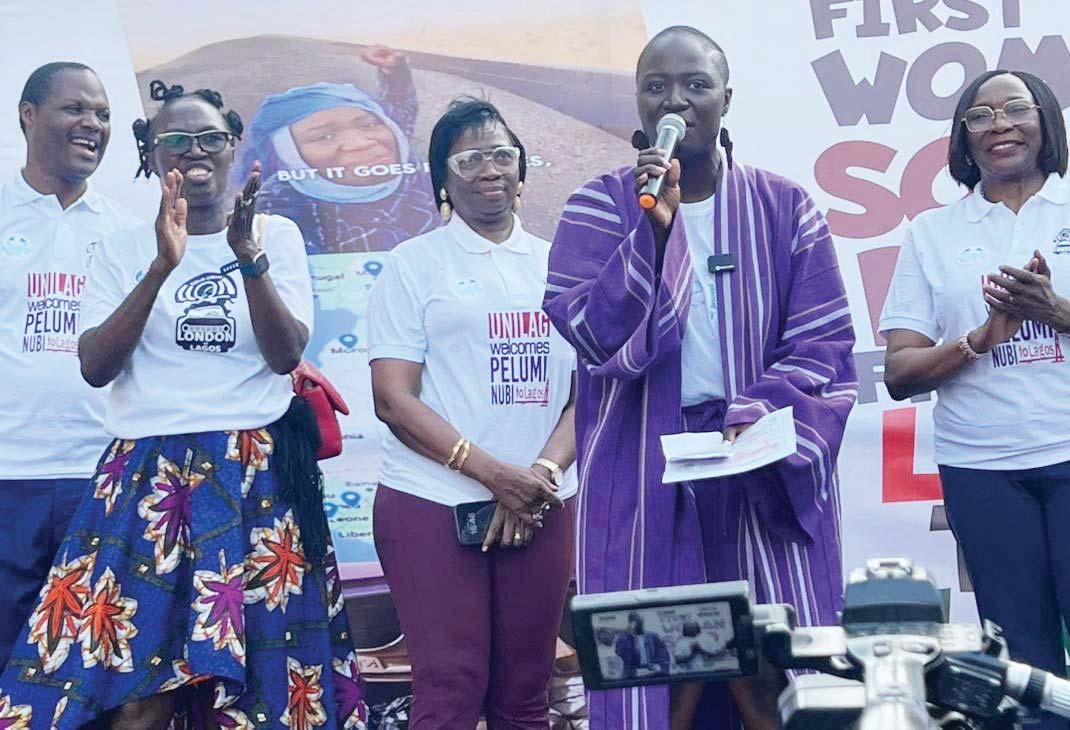
Gender Disparity: AfDB Lauds HEIR Women
Hub on Efforts to Bridge $42bn Financing Gap
The African Development Bank (AfDB) has commended the recently conducted survey by HEIR Women Hub(HWH), which unveiled the disparities encountered by female entrepreneurs in Nigeria when accessing loans and investments.
So far, in a bid to address the staggering $42 billion financing gap for African women-owned small and medium-sized enterprises (SMEs), the African
Development Bank Group (AfDB) is intensifying efforts to foster gender equality in access to financial resources. Its Chief Gender Officer, Nigeria
Lagos Govt Welcomes Pelumi, Solo Driver from London to Lagos
Segun James
A United Kingdom-based Nigerian woman, Nubi Pelumi, who embarked on a solo ride from London to Nigeria, arrived Seme Border yesterday to a tumultuous welcome by officials of Lagos government and other Nigerians.
Pelumi arrived at the Seme border point between Republic of Benin and Nigeria at 9:10am and was checked by officers of the Nigeria Customs Service (NCS).
She was welcomed by the Lagos
State Commissioner for Culture and Tourism, Toke Benson, Special Adviser on Tourism, Idris Aregbe, her parents, students from the University of Lagos, (UNILAG), among other well wishers.
Twenty-eight year old Nubi left London, United Kingdom on January 31, 2024 on a solo drive and passed through 17 countries before arriving Nigeria. The first woman to ever undertake such journey.
Her path took her from England to France, Spain, Morocco, and
OGBC Gets New Digital Transmitter
The Ogun State Broadcasting Corporation (OGBC) has taken delivery of a 5 kilowatts cuttingedge transmitter purchased by the state government.
The General Manager of OGBC, Mrs Toyin Sogbesan, who spoke on the new delivery, said approval for the purchase of the transmitter was signed in December 2023 by Governor Dapo Abiodun.
She noted that the 5kw transmitter, manufactured to specification on March 19th 2024 by RVR Elletronica, Bologna, Italy, was delivered to OGBC on 6th April 2024, by their country Representative, Ecalpemos Nig. Ltd, Kaduna.
Mrs. Sogbesan said the transmitter will go a long way in enhancing the reach of OGBC and provide unparalleled service to its numerous listeners, by ushering in a new era of broadcasting excellence.
According to her, the new 5-kilowatt transmitter which will replace the old 35kw transmitter, "when installed, boasts an impressive broadcasting range, extending OGBC signal coverage to previously underserved areas
and ensuring crystal-clear reception for its loyal audience."
She added: "The benefits of the new transmitter goes beyond mere technical capabilities as it will expand OGBC’s reach, with the aim to become an integral part of the daily lives of residents in and around Ogun State by providing them with high-quality programming, up-to-date news, and engaging content."
The general manager noted further that the enhanced broadcasting reach will open up exciting opportunities for local businesses to reach a wider audience through advertising and sponsorships.
"With this news transmitter, the era of epileptic transmission is over. OGBC can now run on its full capacity. The people of Ogun East and Ogun West will be better informed of government activities and programs. OGBC's coverage areas will be enhanced
"Our clients will now have greater value for their money with the wider coverage areas of the new transmitter. All our flagship and late-night shows will be back on air. No more shutting down because of the obsolete transmitter," Mrs. Sogbesan said.
through the huge West Sahara Desert, all by road.
According to itinerary, she drove via Mauritania, Senegal, Gambia, Guinea, Sierra Leone, Liberia, Mali, Burkina Faso, Cote d'Ivoire, Ghana, Togo, and Benin before arriving in Lagos
She had different experiences, some good and some bad, and documented them all on social media. She faced quite a hassle with many immigration officers in Africa. She was denied entry to Sierra Leone at the border and her car was involved in an accident on the Ivory Coast. She had to postpone her arrival twice. Despite the challenges, she overcame them and arrived today Sunday, April 7, 2024 at the University of Lagos, it was learnt. Speaking at the Seme border on the challenges she faced during the ride, she said she felt so
lonely during her four months ride and missed her family. She also mentioned the accident as a difficult moment during her journey.
She expressed excitement at the completion of her solo drive and thanked Lagos State government for their support.
The Special Adviser to the governor on Tourism, Aregbe commended her for her doggedness.
“She has demonstrated the Lagos spirit that we can do a lot and make sure we put our name on the map. I am super happy that Lagos State is rising in terms of entertainment and hospitality.
“I am happy we have a governor that has done a lot in tourism which is why we are seeing a lot of youths coming out. She is not the first and she's not going to be the last. We are going to continue to support every Lagosian who means well for Lagos “ Aregbe said.
Country Department, Dr. Maria José Moreno Ruiz made the commendation during a virtual validation meeting organised by the hub to publicly present findings of the research.
The project is funded with support from African Women Development Fund (AWDF).
Ruiz described the survey as "detailed", expressing keen interest in collaborating with HEIR Women Hub for further advocacy. Specifically, she emphasised the importance of assessing the impact and visibility of loans on women's businesses to ensure they contribute significantly to their enterprises.
While expressing interest in engaging in further discussions, Ruiz inquired about the interest rates on loans for women, stating that the AfDB is keen on collaborating with the Women’s Hub to gain deeper insights into gender disparities in financial access for women.
"It would be great to know if there was any impact of women’s loans on the business itself even though many women may give the loans to their partners.
"On interest loans, we need to work on comparing the global rates to local rates to see the disparities and align where possible," she said.
Earlier in her welcome address, the Executive Director, HEIR Women Hub, Anuli Aniebo, while giving an overview of the project emphasised the need for factors that limit women's access to economic equality to be addressed in Nigeria.
She acknowledged initiatives by prominent figures like Tony Elumelu and organisations such as W Initiative by Access Bank, emphasising the necessity for more comprehensive interventions.
"Efforts by Tony Elumelu, Bank of Industry (BoI), Initiative by Access Bank, we have over 10 banks run by women. Women have since taken ownership and created ventures that fund women owned business, such as ARUWA and Money Africa.
“ While laudable, it is still a drop in the ocean in a nation like ours. Yet, we need more interventions,” she stated.
Aniebo maintained that addressing these disparities is crucial for fostering a more inclusive and sustainable business environment.
Environment of business scalability, she said, is also expensive to run with bills, taxes, resources that at are competent with capacity, infrastructure and security requires evaluation when reviewing loans and funding for women led businesses.
Japan-UNESCO Empower IDPs, Vulnerable Families in Gombe
Segun Awofadeji in Gombe
As part of efforts to bring succour to the persons affected by crises and armed violence, Japan-UNESCO has empowered Internally Displaced Persons (IDPs) who migrated and were reintegrated into communities in Gombe State.
THISDAY reports that the beneficiaries were trained in various vocations including; Tailoring, catering, barbing, shoemaking, animal husbandry and poultry production, among others.
The IDPs who were drawn from Gombe, Akko, Yamaltu Deba, Shongom, Kaltungo and Funakaye local government areas were also given starter packs after an intensive training on their chosen skills for months.
Speaking yesterday at the closing ceremony of the training tagged "Strengthening peace building and resilience
in the North East Nigeria through Education, Economic Empowerment and Social Change”, held at Flourish Hotel, Gombe, the head of UNESCO office in Nigeria Mr Abdurrahman Diallo said armed violence in the region reulted in massive displacement of people leading to food insecurity, and other life challenges, hence the intervention of JAPAN -UNESCO.
He explained that the project focused on some fundamental priorities in Nigeria which are promotion of peace, reconstruction assistance in the North East and humanitarian assistance to IDPs, social stabilisation and vocational training among others.
"Insecurity is a major development concern in the North East Nigeria and more recently in other parts of the country. Armed violence has decimated the lives
and livelihoods of civilians, with massive displacements fundamentally altering life in the region. "These have increased tension across IDP camps and host communities, forcing affected and vulnerable population to adopt negative coping mechanisms".
"In this regard, one of the key priorities for Nigeria is the promotion of peace and stability including reconstruction assistance in the North East region, including a support humanitarian assistance for Internally Displaced Persons and refugees; and support the reconstruction assistance for social stabilisation in the sectors such as education and vocational training among others".
According to the UNESCO head in Nigeria, the group has supported 1,000 internally displaced persons in Gombe State and vulnerable families by giving them skill training of
their choices and starter packs
While presenting the report of the project to the gathering, the Project Coordinator, UNESCO Office, Abuja, Magdalene AneneMaidoh explained that the project targets the IDPs and the vulnerable women and youths, through providing them with education, skills and livelihood supports.
In his remarks, Gombe State Governor, Alhaji Inuwa Yahaya, represented by his deputy, Manasseh Jatau expressed willingness of the state government to strengthen its partnership with the development partners in improving the standard of living of state residents.
He said since the year 2020, Gombe state government had found UNESCO as a very reliable and dependable partner in the struggle to improve the socio economic standard of the state population.
James Sowole in Abeokuta
Kuni Tyessi in Abuja
THISDAY • MONDAY, APRIL 8, 2024 NEWS 12
Mr. Idris Aregbe (second right) and Executive Assistant to the Governor on Diaspora and Foreign Relations, Mr. Jermaine Sanwo-Olu, during the arrival of Ms. Nubi, who drove from London to Lagos after she was received by Lagos State government officialsat the Seme Border, Badagry, Lagos...yesterday
L-R: Professor and Mrs. Timothy Nubi; Chairman, Nigerians in Diaspora Commission , Hon Abike Dabiri Erewa; Ms Pelumi Nubi, who drove from London to Lagos for 68 days, and Vice Chancellor, University of Lagos, Professor Folasade Ogunsola, at the reception in Lagos to welcome and honour Ms. Nubi as the first Nigerian woman to embark on such solo ride…recently

MONDAY APRIL 8 , 2024 • THISDAY 13

INTERSWITCH ENERGY SUMMIT...
L-R: Chief Executive Officer, Mezovest, Mr. Tosin Thompson; Head, LPG and Marketing, Falcon Corporation Limited, Godwin Okoduwa; General Manager, Fulfilment and Corporate Service, Viathan Engineering, Solabomi Oreagba; People Development Professional, Mr. Nwaji Jibunoh; Managing Director/CEO, Falcon Corporation Limited, Prof Joe Ejigbo; Managing Director, Industry Ecosystems (Interswitch Indeco), Chinyere Don-Okhuofu; Network Development Manager, NNPC Retail Limited, Dr. Elochukwu Onyia; Managing Partner, Detail Commercial Solicitors, Dolapo Kukoyi, and Vice President, Energy Ecosystems (Interswitch Indeco), Adeyinka Adekoya, at the Interswitch energy summit in Lagos...recently
Tariff Hike: FG Raising Funds for Cash-Strapped DisCos, Falana Declares
Threatens to seek redress in court
Wale Igbintade
Human rights lawyer, Femi Falana SAN yesterday said that with the recent hike in electricity tariff, the federal government is making Nigerians pay for the
inefficiency of and incompetence of those managing the electricity sector in the country. The senior lawyer argued that the federal government had already removed electricity subsidy in 2022, adding that the government was
Eno Terminates Contract for Nsit Atai/Okobo/Oron Road
Okon BasseyinUyo
Akwa Ibom State Governor, Umo Eno, has terminated the contract for Nsit Atai/Okobo/Oron Road and it is to be re-awarded and delivered in record time.
Governor Eno disclosed this ìn his remarks during the funeral ceremony and thanksgiving service in honour of late Mrs. Deborah Ekaette Imaikop Enoidem, mother -In-law of the immediate past Secretary to the State Government , Dr. Emmanuel Ekuwem in Ikot Ekpene Udo, Nsit Ubium Local Government Area.
Governor Eno used the occasion to reel out projects undertaken by his administration in the Oro Federal Constituency, to include, 2.1km Ukpong Street, 2.1km Essang Street, Orukim-Uyenge Universal Energy Road, Okopedi Road, by East West road, Secretariat Oruko Eweme Road, and re-modernization of Oron Bridge, assuring that he is bent on executing more projects in Oron Nation, and indeed , the entire state. He explained that each local government area has at least two projects currently ongoing, throughout the state.
Nine Die, 30 Injured in Stampede at Senator Wamakko’s Home in Sokoto
No fewer than nine persons died while 30 others various injuries yesterday in a stampede during the distribution of palliative at the residence of the Senator representing Sokoto North in the National Assembly, Aliyu Wamakko, in the Gawon Nama area of Sokoto State.
Confirming the stampede, a senior officer of the Nigerian Security and Civil Defence Corps (NSCDC), Sokoto State Command, said no fewer than nine persons died, including an official of the command, adding that 30 others sustained various degrees of injury.
Also speaking, the Sokoto State chapter of the Peoples Democratic Party (PDP) in a statement issued by its Publicity Secretary, Hassan Sahabi Sanyinnawal, said the incident occurred during the distribution of Sallah items by Wamakko at his Sokoto residence.
The PDP noted: “We learnt of the very unfortunate stampede at the residence of the Senator representing Sokoto North, Aliyu Magatakarda Wamakko, at Gawon Nama area in Sokoto that resulted in the loss of lives and injuries during the distribution of Sallah items to crowds of people.
CSCS Appoints VFD Group CEO, Okpala, as Board Member
Central Securities Clearing System Plc (CSCS), Nigeria’s premier financial market infrastructure company, has appointed Group Managing Director/CEO of VFD Group, Nonso Okpala, to its board.
Now, Okpala sits on Nigeria’s premiere stock exchange board, Nigeria Exchange Group (NGX), and the CSCS.
The company said in statement that this appointment comes as no surprise, given Okpala’s remarkable track record.
The statement said: “Under his leadership, VFD Group has evolved from an initial capital of N2.5 million to a company with assets now exceeding N200 billion, with investments spanning over 40 businesses across various sectors of the Nigerian economy. Leading over eight successful capital raises, Okpala has built a reputable brand that transitioned from listing on the National Association of Security Dealers (NASD) to the Nigeria Exchange Limited (NGX) in just four years. This achievement earned VFD Group the “Equity Listing of the Year Award” at the Made of Africa Awards in December 2023.
merely trying to raise funds for cash-strapped electricity distribution companies (DisCos).
According to Falana government needs to apologise to Nigerians for
the mismanagement of the electricity sector.
Falana, who was a guest on Channels Television’s Sunday Politics, said the recent tariff increase
for Band A consumers by the government cannot be justified under the Electricity Act, 2023. He said the federal government through the Nigerian Electricity
Regulatory Commission (NERC) plans to extend electricity tariff hike beyond Band A consumers to other Nigerians categorised under other bands.
Yemi-Esan: How Aig-Imoukhuede Foundation Saved Me from Difficult
The Head of the Civil Service of the Federation, Mrs. Folashade Yemi-Esan, has revealed how Aig-Imoukhuede Foundation saved her from unexpected difficulties associated with the passage of her budget by the National Assembly when she was appointed to the position in 2019. Speaking at a public event recently in Abuja, Mrs. Yemi-Esan declared that but for the intervention of the foundation, she would have had a very difficult first year in office. She said: ‘’We have been able to do a lot in the last four years, but it was not easy initially. I became Head of Service in 2019, just before the budget process closed, and so I went to the National Assembly to get our budget approved. But while waiting for our budget to be passed, Mr. Aigboje Aig-Imoukhuede came to see me in the office to congratulate me on my appointment. He briefed me on his foundation and its initial contacts with the Office and the teething problems it had encountered, and noted that the foundation was desirous of moving forward on the partnership. He then proposed to give technical assistance to the Office of the Head of Civil Service of the Federation (OHCSF) and support the digitalisation of the Office.’’ ‘
FG Urged to Investigate Allegation of NGOs Sponsoring Terrorism against IDPs in North-east
Hammed Shittu in Kwara Foundation for Peace Professionals also known as PeacePro has called on the federal government to investigate the allegation of recruitment of some people by
non-governmental organisations (NGOs) operating in the country to burn down Internally Displaced Persons (IDPs) camp in North-east region of the country. PeacePro said the news of an NGO recruiting and
paying individuals and groups to commit an act of terror in the most vulnerable place such as IDP camps is a scary development that should not be treated with kid’s cloves.
In a statement issued in Ilorin at the weekend by the foundation which was signed by the Executive Director of the Foundation, Mr. Abdulrazaq Hamzat, the group said that in recent weeks, cases of fire outbreaks have been reported in some displaced persons camps in Borno State.
Cost of Governance Down in Abia, Otti Declares, Says Only Necessary Expenditure Permitted
Emmanuel
Ugwu-Nwogo in Umuahia
Abia State Governor, Alex Otti, has stated that the cost of governance has drastically reduced over the past 10 months he took charge of the affairs of the state.
He stated this at the weekend
during his monthly media chat at Government House in Umuahia, adding that he has banished frivolous spending in his government.
According to him, “We’ve been able to rein in cost of governance. It’s tough, but we have to do it. If any expenditure is not necessary, we leave it.”
Otti also stated that he has not borrowed a dime for the ongoing road projects across the state, noting that the funding was made possible by the reduction in cost of governance.
He said that his administration has deployed effective management of resources and expenditure hence the state was keeping to his promise of using Abia State money to work for the state.
The governor said: “We’ve been able to manage (our resources). We’ve been able to cut costs. We’re doing financial engineering.”
FG Partners Gavi Alliance to Produce Disease Preventable Vaccines
Onuminya Innocent in Sokoto
The federal government has announced it partnership with Global Alliance for Vaccine Initiatives (Gavi) to produce disease preventable vaccines in Nigeria.
The Minister of Health and the Coordinating Minister for Social Welfare, Prof Mohammed Ali Pate, stated this when he led a high-power delegation from the ministry, Gavi Alliance, World Health Organisation, UNICEF on courtesy call on the governor of Sokoto State.
Pate said Nigeria would be addressing rising medicine costs by tapping into global vaccine production supported by the Global Alliance for Vaccine Initiatives (GAVI) to intensify local production.
The minister explained that some diseases are preventable when children are vaccinated against them. He said: “You know diseases like measles, poliomyelitis, diphtheria, tuberculosis, tetanus and others are preventable, and prevention is better than cure hence the need to vaccinate children against them.”
Tinubu’s Unified Exchange Rate Yielding Positive Results, Says APC Chieftain
Yinka Kolawole in Osogbo
A chieftain of the All Progressives Congress (APC), Hon. Olatunbosun Oyintiloye, in Osun State has stated that the strategic policy of President Bola Tunubu on the unification of exchange rate has started yielding positive results.
Oyintiloye, a former member of the defunct APC Presidential Campaign Council (PCC), said this while speaking with journalists yesterday in Osogbo. The Monetary Policy Committee of the Central Bank of Nigeria (CBN) as part of measures to control inflation and stabilise the naira, last month raised its benchmark interest rate, known as the Monetary Policy Rate (MPR) by 200 basis points to 24.75 percent from 22.75 percent in February 2024.
The former lawmaker, who noted that although the policy initially led to unsavoury experiences for Nigerians, said the experience of the past few weeks was an indication that the initiative was beginning to have positive impact on the country’s economy.
Ododo Reiterates Commitment to Improve Workers’Welfare
Ibrahim Oyewale in Lokoja
Kogi State Governor, Usman Ododo, has reiterated the commitment of his administration to improve the welfare of civil servants and in the state.
Governor Ododo disclosed this
while briefing newsmen after an interactive session with labour leaders of the organised labour in the state at the weekend.
Ododo who spoke with leaders of the Nigeria Labour Congress (NLC) the Trade Union Congress (TUC) and other labour
unions in the state, noted that the meeting with the labour leaders was to review critical steps so far taken by the state government to address the impact of the economic downturn in the state especially as they affect workers in the public sector.
“ We have come to interface with the leadership of the organised labour as usual because this is one of the legacies of our leader, His Excellency, the former Governor of Kogi state laid down for us to continue.
MONDAY APRIL 8, 2024 THISDAY 14
,NEWS
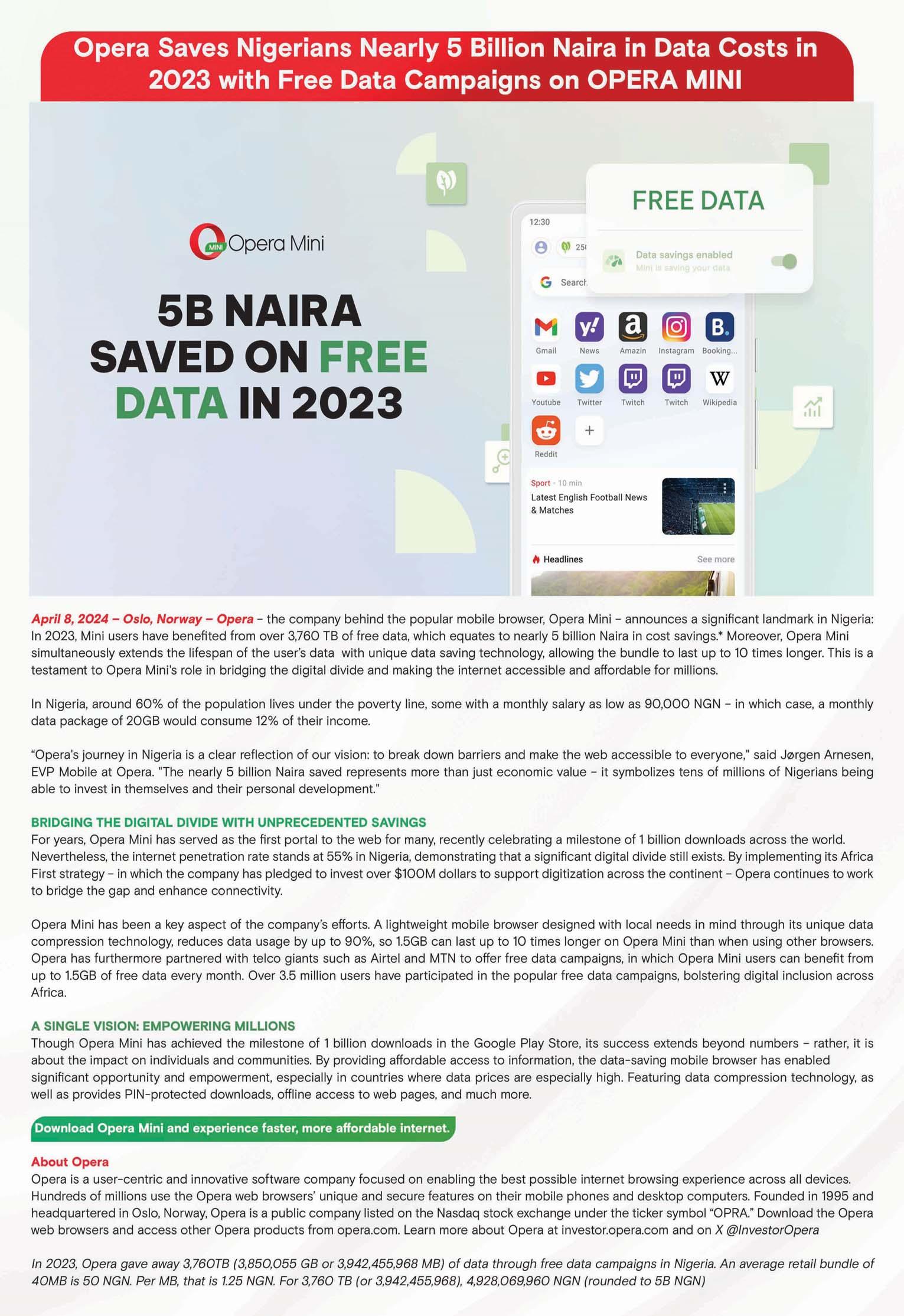
MONDAY APRIL 8 , 2024 • THISDAY 15
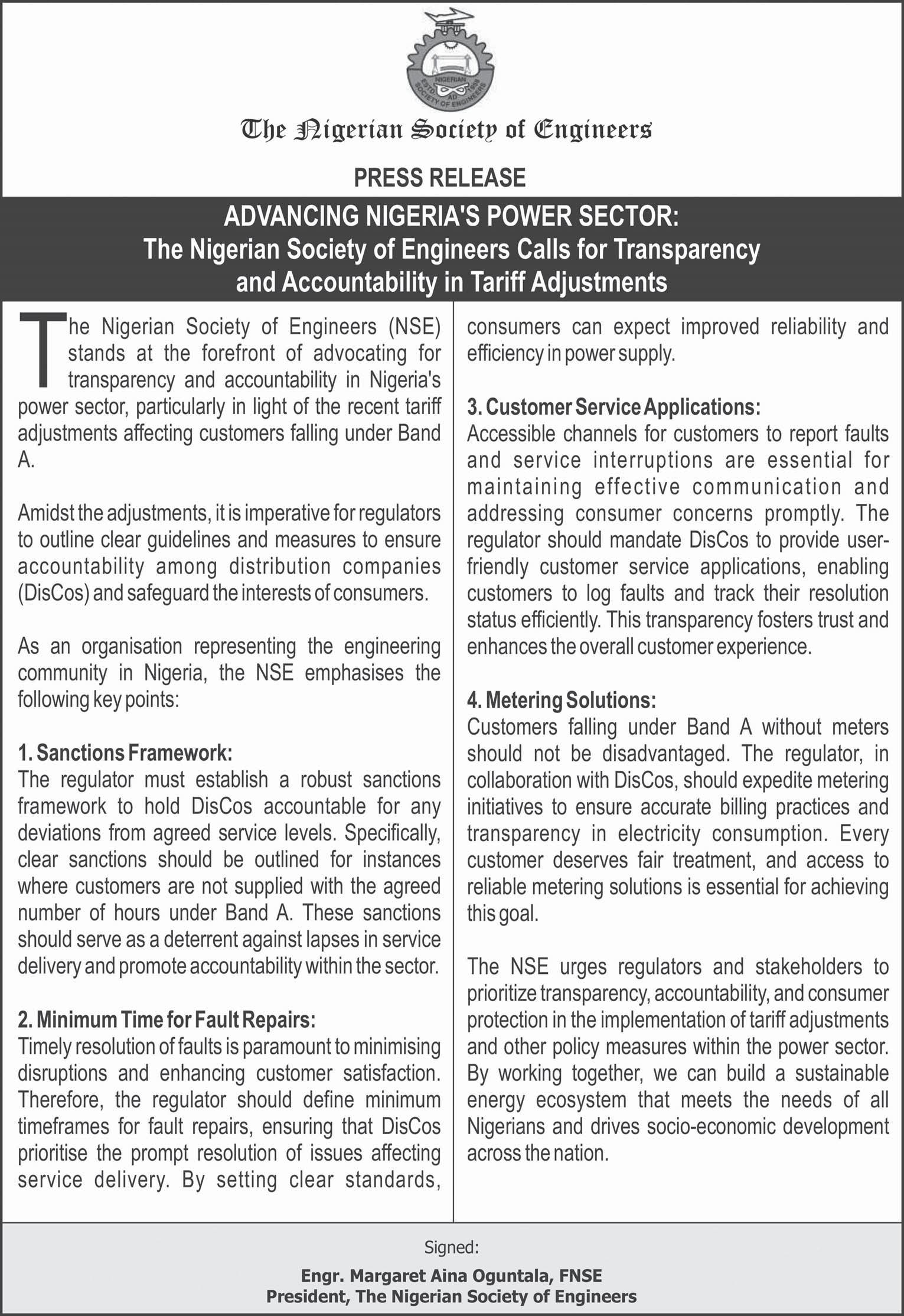
16 MONDAY APRIL 8, 2024 • THISDAY
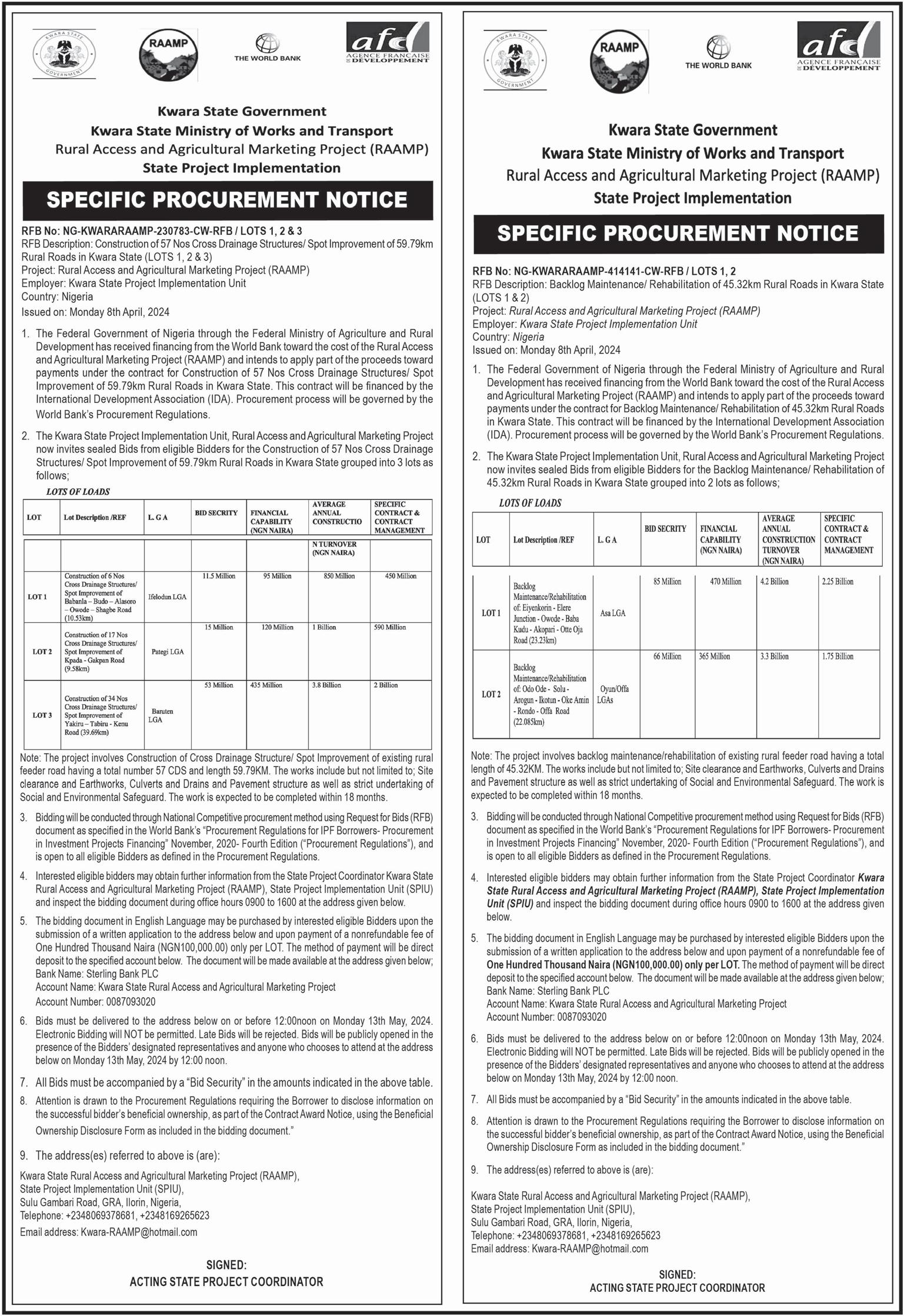
MONDAY APRIL 8 , 2024 • THISDAY 17
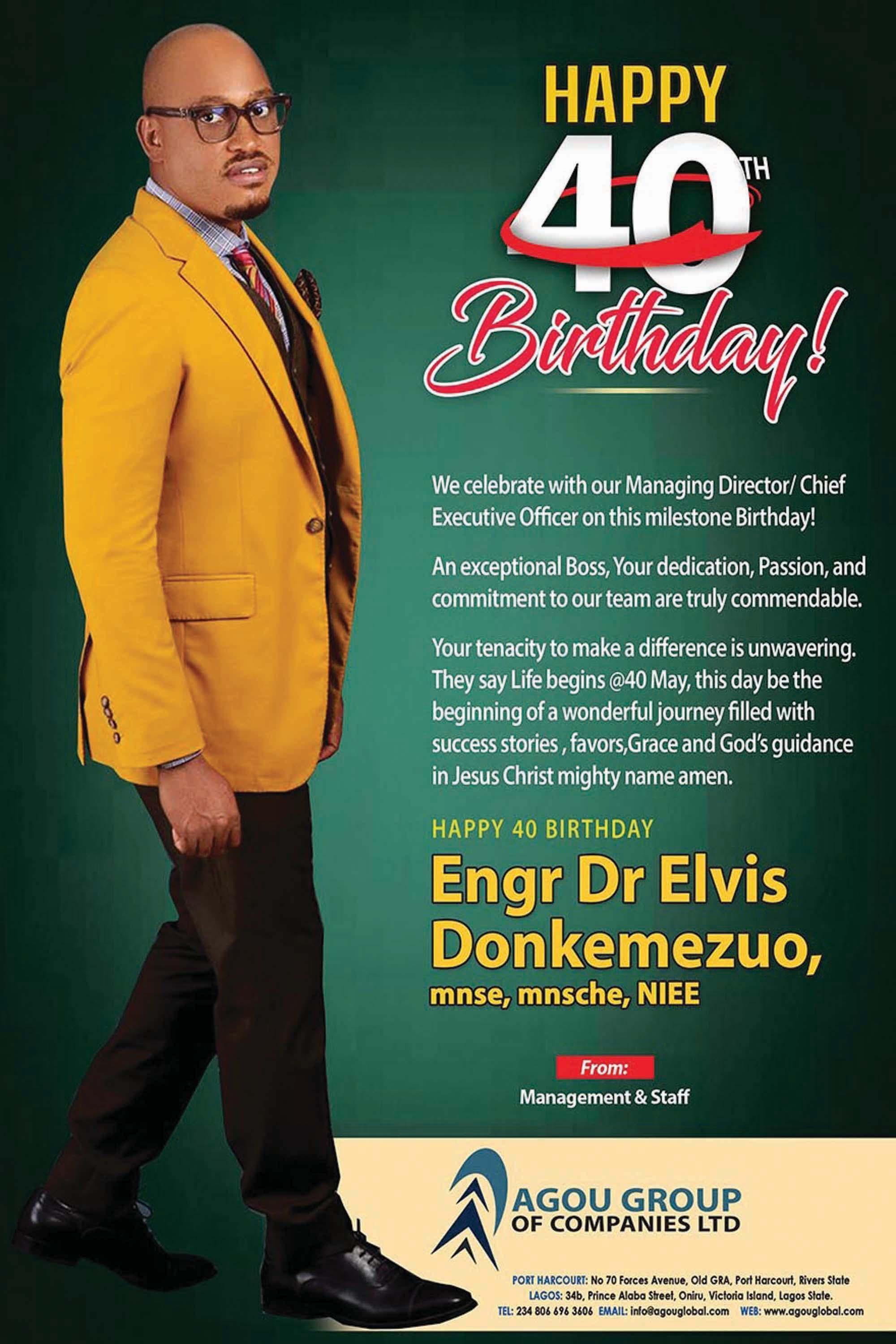
18 MONDAY APRIL 8, 2024 • THISDAY
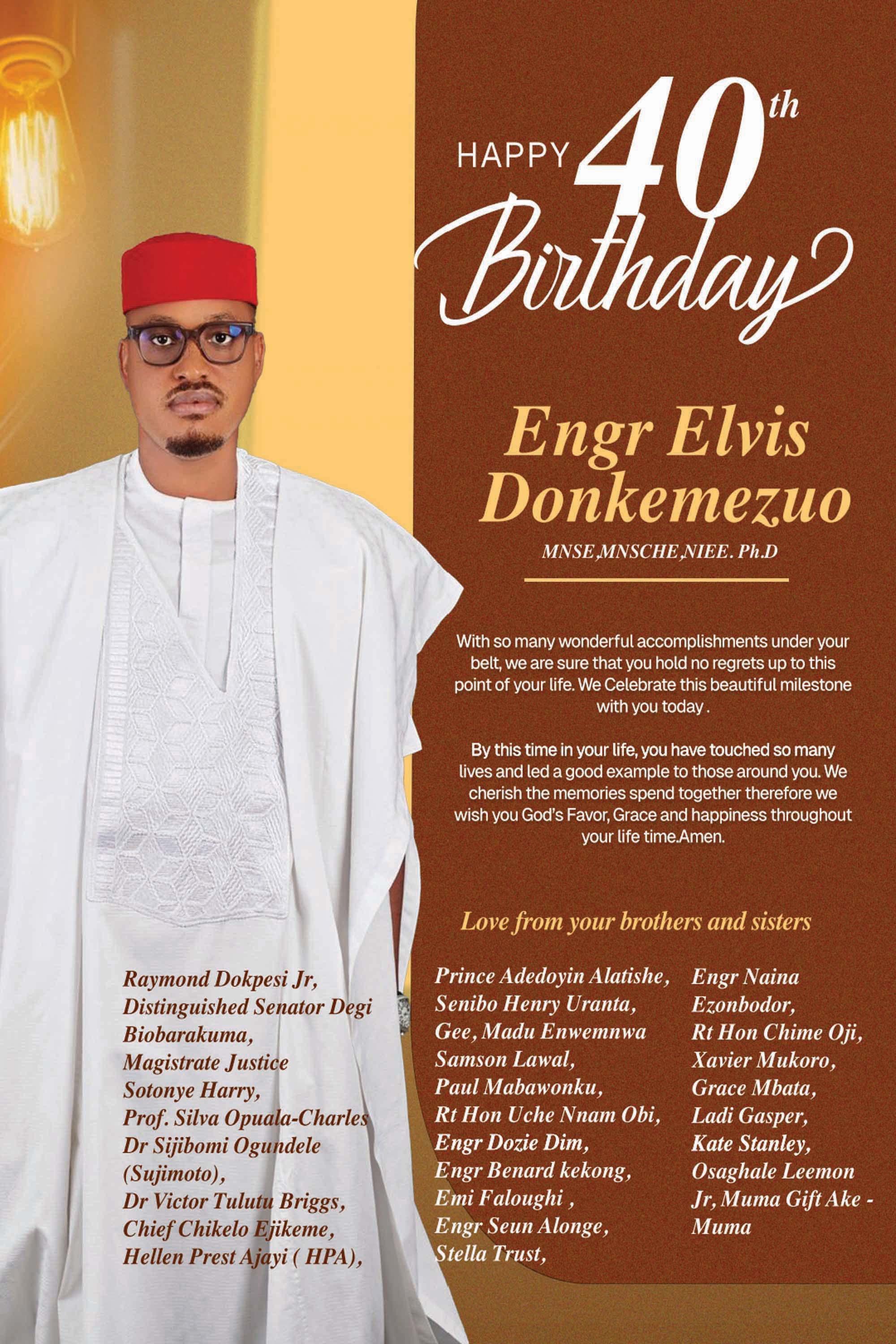
MONDAY APRIL 8 , 2024 • THISDAY 19
Sixth ECOWAS Parliament and Calls for Regional Body’s Unity
Michael Olugbode reports that the Sixth Economic Community of West African States Parliament was inaugurated last week in Abuja with stakeholders calling for the unity of the sub regional body.
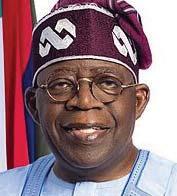
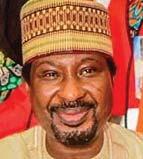
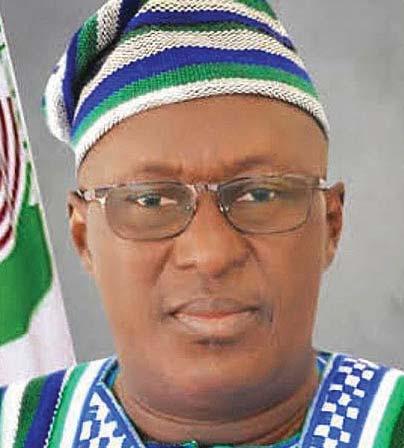
The Economic Community of West African States (ECOWAS) is a regional political and economic union of 15 countries located in West Africa, comprising an area of 5,114,162 km2 (1,974,589 sq mi) and have an estimated population of over 424.34 million. The stated goal of ECOWAS is to achieve “collective selfsufficiency” for its member- states by creating a single large trade bloc by building a full economic and trading union. Top on its aim is to raise living standards and promote economic development. It was established on 28 May 1975, with the signing of the Treaty of Lagos, with a clearly stated mission of promoting economic integration across the region. A revised version of the treaty was agreed and signed on 24 July 1993 in Cotonou, Benin Republic.
Its fundamental principles rely on equity, inter-dependence, solidarity, co-operation, nonaggression, regional peace, promotion of human rights, and economic and social justice.
And notable among its protocols and plans are the ECOWAS Free Movement of Persons, Residences and Establishment Protocol and the Ecotour Action Plan 2019–2029.
The Free Movement of Persons Protocol permits citizens the right to enter and reside in any member-state’s territory, and the Ecotour Action Plan aims to develop and integrate the tourist industry of each member- state.
ECOWAS also serves as a peacekeeping force in the region, with member-states occasionally sending joint military forces to intervene in the bloc’s member-countries at times of political instability and unrest.
This last role at present is at the centre of the greatest threat to the body as early this year, Niger, Burkina Faso, and Mali announced their withdrawal from the bloc, in reaction to their suspension due to military takeovers in their respective governments.
Before announcing their exit from ECOWAS, they had earlier formed the Alliance of Sahel States, which is a mutual Defence pact created between Mali, Niger and Burkina Faso on 16 September 2023. The pact was created during the 2023 Nigerien crisis in which ECOWAS threatened to intervene militarily to restore civilian rule after a coup in the country earlier that year.
The alliance’s stated goal, which look like an effrontery of ECOWAS, include to protect against possible threats of armed rebellion or external aggression by emphasizing that “any attack on the sovereignty and territorial integrity of one or more contracted parties will be considered an aggression against the other parties.”
It is in the thick of this crisis that ECOWAS
Parliament, also known as the Community Parliament, one of the Institutions of ECOWAS, is inaugurating its sixth legislature. ECOWAS Parliament is the Assembly of Peoples of the Community serving as a forum for dialogue, consultation and consensus for representatives of the people of West Africa with the aim of promoting integration.
It was established under Articles 6 and 13 of the ECOWAS Revised Treaty of 1993. The initial Protocol establishing the Parliament was signed in Abuja on August 6, 1994.
It provided for the structure, composition, competence and other matters relating to the Parliament. The Parliament is composed of 115 seats. Each member-state have a guaranteed minimum of five seats.
The remaining 40 seats is shared on the basis of population. And with the suspension and subsequent announced exit of Mali, Burkina Faso and Niger, the membership became severely depleted. Its objectives and vision include the need for a community mechanism to forge greater ties with the citizens of the region; to strengthen representative democracy in the Community ; to contribute to the promotion of peace, security, and stability on the West African Region; inform and sensitize the population on issues of integration; promote and defend principles of human
rights, democracy, the rule of law, transparency, accountability and good governance; promote the practices of accountability; contribute to the efficient and effective implementation of objectives and policies of the Community, among other objectives.
The founding fathers believe this would sustain inspiration and legitimacy for actions the ECOWAS Community was taking on behalf of Community citizens.
It was believed this would be best achieved by allowing the Parliament to play the traditional role of a Parliament within the ECOWAS regional governance architecture. This sentiment is also in consonance with the ECOWAS Vision 2020 of transiting from an ECOWAS of States to an ECOWAS of People.
Though there is still a strong call for direct election into the Parliament to reinforce the fact that it is representative of the people, the Parliament has contributed greatly to the West African brotherhood. The call for direct election resonated with Nigeria’s President and Chairman of ECOWAS Heads of State and Government, Bola Tinubu while inaugurating the sixth legislature last week saying: “to realize the ECOWAS ‘Vision 2050’, we require greater involvement of the people in the decision-making processes of the community. That can only be achieved through their duly-elected representatives who, being members of their national parliaments, are seconded to the community parliament. We are here, collectively, to serve all the good and great people of West Africa.
“I am aware that the ECOWAS Parliament is
Though there is still a strong call for direct election into the Parliament to reinforce the fact that it is representative of the people, the Parliament has contributed greatly to the
West African
brotherhood.
The call for direct election resonated with Nigeria’s President and Chairman of ECOWAS Heads of State and Government, Bola Tinubu while inaugurating the sixth legislature last week saying: to realize the ECOWAS ‘Vision 2050’, we require greater involvement of the people in the decision-making processes of the community. That can only be achieved through their duly-elected representatives who, being members of their national parliaments, are seconded to the community parliament. We are here, collectively, to serve all the good and great people of West Africa.
seeking enhanced powers, primarily through the election of its members by direct universal suffrage. This will increase the role parliamentarians must play and the responsibilities that they will assume in advancing our regional development objectives, particularly in harmonizing laws and regulations across the member-states.
“Indeed, the practice of directly electing public officials aligns with the democratic principles that Nigeria upholds, as it enhances the legitimacy of our democratic institutions. This principle is also in line with the spirit of the ECOWAS Protocol on Democracy and Good Governance. As a one-time legislator myself, I look forward to reviewing a proposal regarding this matter, and we stand ready to support direct elections into the ECOWAS Parliament. We believe this would ensure that citizens have a direct say in their representation – in addition to the legitimacy and credibility such a process will confer.”
Nigeria’s President also gave strong words on unity, stating that: “Honourable Members as we inaugurate the sixth legislature, it is evident that we are faced with profound challenges in our region that demand our unified efforts.
“Recent political development have consequential effect on each of our member- states.The wider international context in terms of security, access to markets, and climate change also presents profound challenges.Three member-states considering withdrawal from the community is a challenge to us. We must preserve the unity and integrity of our organisation. The ball is in your court as well as mine.
“At this critical junction, regional solidarity is imperative to strengthening our resilience and effectiveness as a bloc, particularly against forces that aim to divide us. We must not allow this. We cannot afford to remain persive and ordinary spectators, while our community faces the threat of disintegration. We stand united against such forces and are committed to ensuring that our unity remains unshaking. We must ensure that cooperation among us is strengthened with a view to building a sense of common destiny and purpose. No one can do this for us, we are the ones to do it, please take that seriously.
“In your legislative consideration and in your interaction, it is very imperative that you take seriously that we have to build the economic prosperity of our region by ourselves. Let us forget what has happened to us in the past, we have matured and of age to build our intellectual curiosity to develop our region.
MONDAY DISCOURSE Acting Group Politics Editor DEJI ELUMOYE Email: deji.elumoye@thisdaylive.com 08033025611 SMS ONLY 20 THISDAY MONDAY APRIL 8, 2024 NOTE: Interested readers should continue in the online edition on www.thisdaylive.com
POLITICS
Tinubu Barau Tunis
Paying for Darkness in Nigeria as Heatwave Intensifies
Given the current economic hardship occasioned by hunger, food scarcity, and high inflation rate amongst others, hope seems to elude Nigerians on many fronts. Not discounting the harsh climate conditions, the epileptic power supply nationwide worsened by the recent hike in the cost of electricity by over 300 per cent, has only exacerbated the already sorry state of common Nigerians, Sunday Ehigiator writes
y life is over. Nigeria has happened to me. Where do I begin? These are goods worth over N5 million which I was supplied yesterday evening. They are all spoiled.
“When they were supplying me the goods, there was light but they took it before they finished offloading the goods from the truck. So I closed at around past 8 and left all the freezers with the hope they would restore power from 10 pm to 10 am as they used to do.
“Mind you today is Thursday, due to the environment in Lagos state every Thursday I don’t come to shop till 11 am. Also, I took that time to do some house chores, so I didn’t get to shop till 2 pm the next day. Only for me to get to shop, open the freezer and be confronted by the offensive smell of spoiled fish and turkey.
“They didn’t restore power since the time they took it before I left the shop. Now all my goods which I am yet to fully pay for have all been spoiled. Where do I start from?
“My name is Imisi Ogunlano, I sell frozen foods such as fish, turkey, gizzard and chicken here at Mile 12 market.”
The poor electricity supply being experienced across the country has worsened the situation for many businesses and Nigerians at large.
Ogunlano’s experience reflects the current situation of many business entities that solely depend on power to operate in Nigeria.
Impact on business
The lack of power supply has increased production costs for many businesses forced to provide their electricity, mostly using diesel-run generators as alternative sources of electricity.
While some who can’t afford to fuel their generator to run for at least a minimum of 15 hours a day are already out of business, others who can are battling with low patronage due to the cost implication of the high cost of fuel, dollar rate, inflation, etc. on their goods or services.
In June 2015, Nigerian manufacturers said they spent as much as N3.5 trillion annually to generate alternative power for their production operations due to the collapse of the public electricity supply.
In June 2023, the Manufacturers Association of Nigeria (MAN) said it loses N10.1 trillion annually to a power crisis, just as the World Bank said that Nigeria will need about $100 billion in the next 10 years to tackle the challenges in its energy sector.
Power supply at an all-time low
Electricity supply in Nigeria is currently at its all-time lowest. Across social media platforms, Nigerians have lamented the epileptic power supply and on many occasions have called out the nation’s Minister of Power, Adebayo Adelabu, and accused him of being clueless.
On Sunday, February 4, 2024, Nigeria’s electricity grid collapsed yet again, throwing several cities including the nation’s capital Abuja, into darkness.
According to the Abuja Electricity Distribution Company (AEDC), the collapse was a “result of a system failure from the national grid at 11:21 am today, February 4, 2024, which has led to a nationwide power outage.”
The latest collapse occurred less than two months after the national grid system collapsed in December and Nigerians were thrown into darkness.
In recent years, Nigeria’s power sector has experienced broad challenges such as electricity policy enforcement, regulatory uncertainty, gas supply, transmission system constraints, and major power sector planning shortfalls.
On February 2, the federal government attributed the main cause of poor power supply in the country to the low supply of gas to Generating Companies (GenCos).
Nigeria’s Minister of Power, Adelabu, who disclosed this in a statement, said “Power supply during the yuletide improved, but unfortunately, we’ve experienced setbacks in the New Year. After investigations, it’s clear that the main cause of poor power supply is the low supply of gas
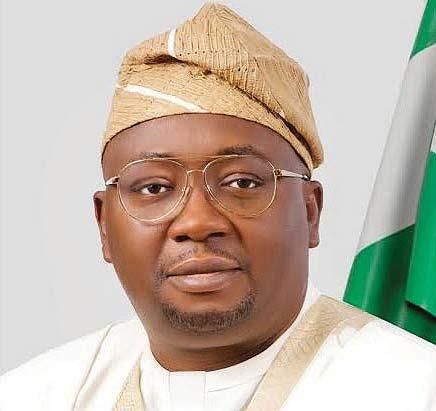
to GenCos.”
Nigeria has struggled with poor power supply for decades, a challenge that is estimated to cost businesses about $29 billion yearly, according to the World Bank. The country has the lowest access to electricity globally, with about 92 million persons out of the country’s 200 million population lacking access to power, according to the Energy Progress Report 2022 released by Tracking SDG 7.
Also, a World Bank report in 2021 revealed that a total of 74 per cent of power users in the country are dissatisfied with the supply of electricity across the country while 93 per cent of metered power users paid their bills regularly, 78 per cent of electricity consumers in the country received less than 12 hours of power supply daily.
Earlier in February 2024, women protested at the office of the power distribution company in Port Harcourt, saying their husbands no longer make love with them at night due to excessive heat and poor power supply.
Many also lamented the high cost of fuel which is the consequence of the removal of subsidy on petroleum products by President Bola Tinubu. The high cost of fuel has denied many the opportunities to provide electricity through generator sets.
Indeed, Nigerians are displeased with the worsened power situation in the country which the heatwave has worsened occasioned by the harsh climate conditions.
Concerning heatwaves in Nigeria
The weather all over the country has been relatively hot for over two months. Some Nigerians had joked about someone forgetting to lock the gate of hell, or Nigeria sharing a boundary with hellfire or moving several steps towards the sun.
While many complained of not sleeping at night and having to enter the shower severally to soak their body in water, which is also warm, some others were captured on social media wetting their beds with large buckets of water before lying down and still waking up on a
dried bed.
The worst part for Nigerians is the lack of electricity supply by the Power Holding Company of Nigeria (PHCN) to power their Air Conditioner (AC), which a normal 220 KVA generator cannot power.
Nigerians now attribute the Air Conditioner (AC), as a luxury, as it is the only solution to the heatwave, after being frustrated with fans, which are now also blowing hot air.
Despite the rain recorded for a few days, February has never really been a cold month in Nigerian cities. However, temperatures have never been this bad.
In previous years, according to an online resource, Weather to Travel, the average temperature in Lagos in February for a typical day ranged from a high of 85°F (30°C) to a low of 78°F (25°C).
For comparison, the hottest month in Lagos, March, has days with highs of 85°F (30°C) and lows of 78°F (25°C), but March, 2024 saw temperatures rise to as high as 39°C and even peaked at almost 40°C.
NiMET’s warning
On Saturday, April 6, 2024, The Nigerian Meteorological Agency (NiMET) issued a weather prediction alert, warning of the likelihood of heat stress and thunderstorms across various parts of the country.
The agency made the predictions in its Weather Report released in Abuja.
According to NiMet, the heat index over Nigeria is expected to soar, with strong prospects of heat stress in many regions, urging the public to take necessary precautions.
The agency emphasised the importance of staying well-hydrated and avoiding strenuous physical activities, especially during the peak hours between 12 noon and 4 pm.
It added, “Wear shades and hats when you’re outdoors and keep the infants well aerated.”
Hike in electricity tariff
Despite the massive drop in electricity supply, preceding protests, current heatwaves and the hardship the drop in supply and the heatwave have brought on business entities in the country and Nigerians at large, on April 1, 2024, like it were an ‘April Fool’ joke, the Nigerian Electricity Regulatory Commission (NERC) ordered the immediate upward review of electricity tariffs,
effective from April 3.
The NERC Vice Chairman, Musiliu Oseni, disclosed this while speaking at a press conference in Abuja.
Mr Oseni explained that only electricity customers in Band A would be affected by the increase.
He noted that the increase would not affect Bands B, C, D and E while noting that the number of customers previously on Band A has been reduced.
Band-A customers are offered an average daily electricity supply of 20 hours, although many complain they do not get up to that.
The official said the Band A consumers represent 15 per cent of the population but consume 40 per cent of the nation’s electricity.
According to him, power distribution companies (DisCos) will be allowed to raise electricity prices to N225 ($0.15) per kilowatt-hour from the initial N68.
NERC a
‘Double Speak’?
NERC had in January said the Nigerian government will pay as much as N1.6 trillion to subsidise electricity in the year 2024.
Unveiling a new electricity tariff plan payable by electricity consumers in the country at the time, the Chairperson of the NERC, Sanusi Garba, said the order states appropriate tariffs that consumers should pay for investors to recover their operating costs.
Mr Garba explained that the order contains the federal government’s policy on ensuring that due to the cost-of-living crisis, consumers will not be made to pay higher than the previous rates.
“The order seeks that prices charged by DisCos are fair to customers and are sufficient to allow DisCos to fully recover the efficient cost of operation, including a reasonable return on the capital invested in the business under section 116 of the Electricity Act 2023,” Mr Garba said.
He added that the tariff order contains the appropriate tariff that DisCos should be charging if they are to remain in business while noting that the rates are very clear.
Abuja Disco (AEDC) defiance of NERC order
In defiance of the order by the Nigerian Electricity Regulatory Commission (NERC), that the upward tariff review only affects Band A customers, Abuja Disco, also known as Abuja Electricity Distribution Company (AEDC) affected over 300 per cent increase across all the Bands, thereby prompting immediate reactions from its customers and the NERC.
AEDC apologise
Apologising in a statement on Thursday, the AEDC said it was aware of the wrong charges faced by some Band A customers who tried to recharge their meters following the new tariff regime.
“This is to inform customers across the Abuja Electricity Distribution Plc (AEDC) franchise that we are aware of the wrong charges faced by some Band A customers who tried to recharge their meters following the new tariff regime.
“This was due to a system glitch caused by the reclassification of some Band A Customers who have now been downgraded to Band B due to the number of hours of electricity supply enjoyed over the past few weeks.
“These erstwhile Band A customers who vented were charged the new tariff of N225 per Kilowatt Hour. Our team is working to identify the customers affected and all excess charges will be refunded,” it said.
It said the situation also saw some Band A customers who are now charged N225 vend at the old rate. Once the glitch is resolved, the AEDC said this category of customers will now recharge their meters at the new rate of N225, which will ensure they enjoy a minimum supply of 20 hours daily.
Group Features Editor: Chiemelie Ezeobi Email: chiemelie.ezeobi@thisdaylive.com, 07010510430 21 THISDAY DAY APRIL 8, 2024
FEATURES
Nigeria’s Minister of Power, Bayo Adelabu
“M
NOTE: Interested readers should continue in the online edition on www.thisdaylive.com
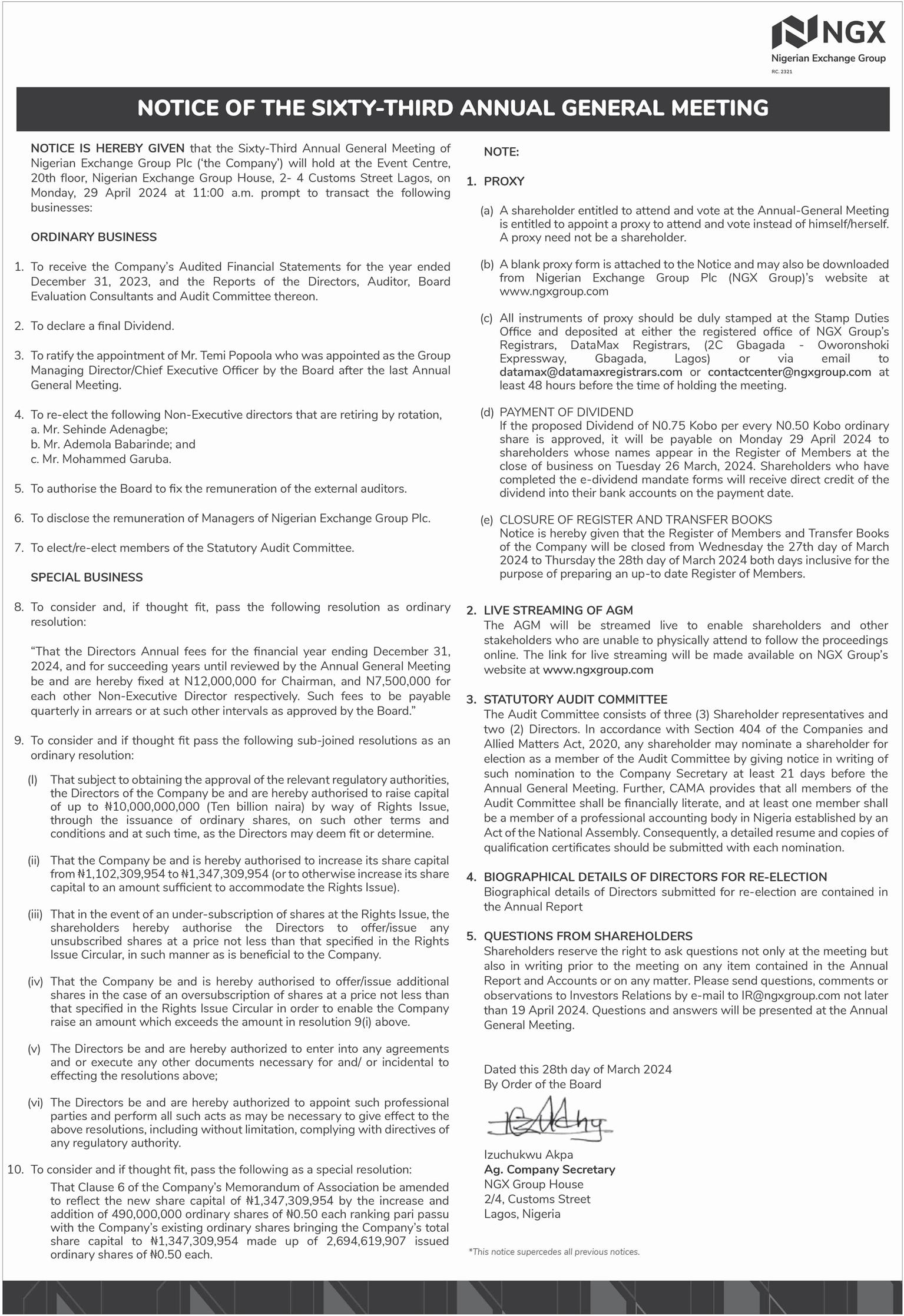
22 MONDAY APRIL 8, 2024 • THISDAY
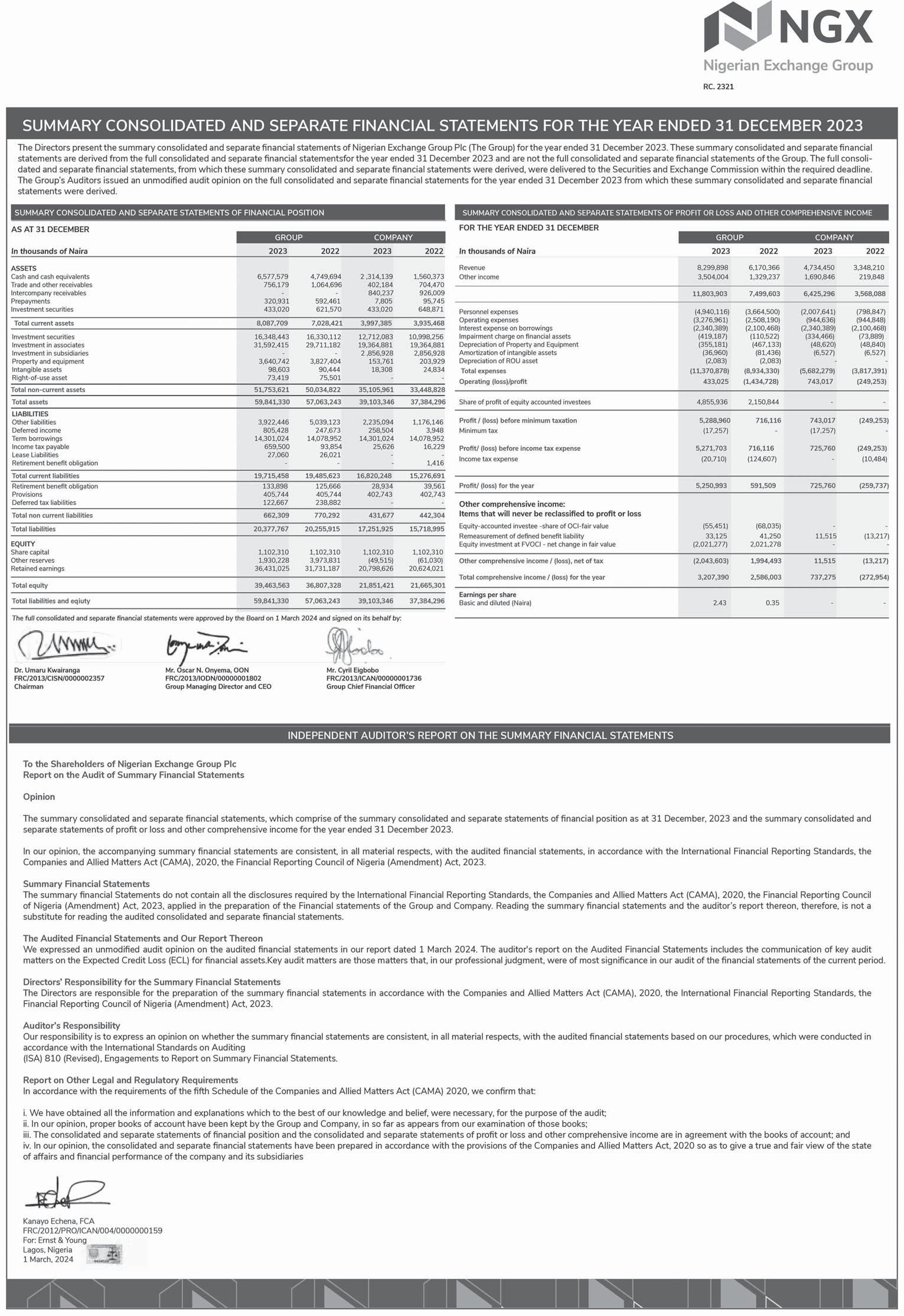
MONDAY APRIL 8 , 2024 • THISDAY 23

The 2024 report from the UK-based charity Oxfam, ‘Inequality Inc’ which documents enormous concentration of wealth in the hands of a few people both on the global stage and across countries should task the authorities, especially at a time like this. Despite abundant human and material resources, millions of Nigerians are living in hunger while a few individuals in both the private and public sectors live in obscene opulence. To build a new political and economic system that works for everyone and not just the fortunate few, things must change.
Inequality in the distribution of opportunities is According to the report, Africa’s seven richest men own more wealth ($52 billion) than the 700 million people who make up the poorest half of the continent’s population. ‘‘Our rigged economies rich while governments are struggling to provide crucial public services like healthcare and education to Africans across the continent,” Oxfam’s Africa Director, Fati N’ziHassane said. But the situation in our country is becoming very desperate for the majority of our people despite the denial by people in government.
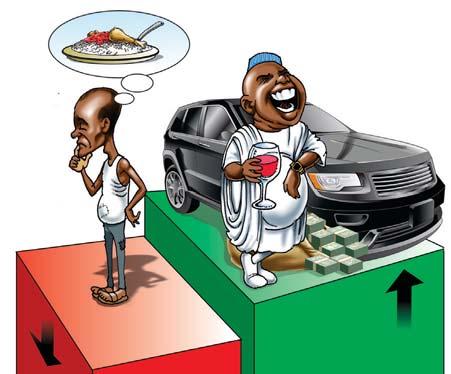
to come up with economic reform programmes but these ideas should not be to further pauperise those already going through hard times. With the plight of the under-privileged steadily worsening and many going to bed with less than a survival diet, the challenge is for all critical stakeholders, including in the private sector. Indeed, the more worrisome aspect of the Nigerian condition is that poverty goes beyond the shortage of food, clothing, shelter and safe drinking water, all of which determine the quality of life. It is inclusive of educational attainment and gender inequality, for example.
By diverting scarce resources to private hands at the expense of much needed projects such as schools, hospitals, roads and reliable institutions, poverty and inequality are being reinforced
T
EDITOR SHAKA MOMODU
DEPUTY EDITOR WALE OLALEYE
MANAGING
In Nigeria today, many basic services such as education, health and infrastructure are decrepit or in short supply, while a huge demographic crisis is looming. The consequences of this situation are not only for the victims but also those who feed fat at the expense of the poor in both the public and private sectors. That the situation keeps worsening every year is why critical stakeholders should be concerned. ‘‘The bedrock of poverty is not in the lack of resources, but in the fact that the top one per cent has hijacked the available resources,” according to N’zi-Hassane.
We enjoin President Bola Tinubu to pay special attention to income distribution in Nigeria. It is good
THE

UCHENNA DIBIAGWU, NDUKA MOSERI
DIRECTOR, PRINTING PRODUCTION CHUKS ONWUDINJO
TO SEND EMAIL: first name.surname@thisdaylive.com
Going by the Commitment to Reducing Inequality (CRI) Index, which ranks governments based on what they are doing to tackle this gap, Nigeria fares badly because its social spending (on health, education and social protection) is abysmally low. By diverting scarce resources to private hands at the expense of much needed projects such as schools, hospitals, roads and reliable institutions, poverty and inequality are being reinforced. Millions are jobless while many of the employed are not paid living wages and therefore hardly leaving any room for savings. Others get their daily living from the streets. But the main problem has been in the growing gap between the rich and the poor.
The problems of unemployment, poverty, inequality, decayed infrastructure, insecurity, and serious challenges in social services like education and health, etc., are already very telling. The solution cannot be found in some tokenistic ‘palliatives’ that are neither well thought-out nor enduring. The challenge of the moment is for the government, at all levels, to begin to deliver targeted and resultoriented policies that would ensure not only that our potentialities are maximised but also that the resultant prosperity is shared. To bridge the gap between the few rich and the many poor in our country, we must make the economic system to work for everyone.
NIGERIAN STUDENTS AS EXPENSIVE COMMODITIES
Business has never been better for those whose high-value commodities are Nigerian students.
In the week following the release of the hundreds of pupils kidnapped from the LEA Primary School Kuriga in Chikun Local Government Area of Kaduna State, more students have done time in kidnappers’ den. About nine students were kidnapped in Ughelli, Delta State as they returned from their school in Calabar. They were freed after spending some days.
Three students kidnapped from their hostel in the University of Calabar are still being held. Their families have been asked to pay N14 million as ransom for their release. scarred landscape, the connection is unmistakable and the implication inescapable that Nigerian students have become expensive commodi-
The Nigerian state refuses to disclose whether it paid for the release of the Kuriga school children, but indications are that it did. It is highly unlikely that the kidnappers who had the audacity to demand for one billion Naira got nothing for their considerable investment at the end of the day. A country which has more cash to pay than cards to play in reticence suggests.
Kidnapping for ransom is a terrorist tactic that has proven its ability to serve as a tool of unbearable pressure as well as rake in money. The ability of non-state actors to snatch people, keep them and use them as bargaining chips to much publicity has often proven paralyzing and
demoralizing for governments around the world. Throw in the convoluted dynamics of ransom negotiation and rescue operations, and the nightmare is complete.
There are lessons to be learned from the levity with which non-state actors continue to treat the Nigerian state and their individual victims, with the biggest lesson being that Nigeria is failing to learn its lessons.
by Boko Haram even if kidnappings orchestrated by the group has been for other reasons too. But it is the bandits waltzing through much of northeast and northwest Nigeria that have taken the crime to another as ever, has not developed a security architecture that can be precisely deployed to dismantle what is a devastating menace. What does it all mean? Business — a trade in vulnerable Nigerians, presumably by a collection of ragtag criminals conducted like an orchestra by well-heeled sponsors in the cover of high places.
As for Nigerian students who have become high-value targets in the kidnapping business, the never again said by Nigerian authorities when students were abducted in the past have been nothing more than reassurances that it will happen again, the question being where next?
In the bargain of life, cost is relative to value. What one can get should be commensurate to what is giving up to get that thing. If this premises holds, the current cost of acquiring education in Nigeria is irreconcilable with the value it confers in the Nigeria situation. It is not simply a situation of harder circumstances yielding a higher value.
Kidnapping students was never the major obstacle facing education in Nigeria. Suddenly cast into such calamitous company by Nigeria’s inclination to coddle insecurity, it is ferociously leading the pack of the mountains Nigerian students must climb if they consider education a luxury worth their painstaking pursuit.
For years, a lack of investment in teachers and infrastructure which make quality education possible and accessible was among the gravest accusations levelled against the Nigerian state. Today, however, insecurity makes a mockery of those persistent challenges.
The vehement Insecurity victimizing Nigerian students is yet more violent disavowal of the express and implied commitments Nigeria consented to when it signed the Safe Schools Declaration of the United Nations.
The criminals instigating insecurity in the country are determined to shred Nigeria’s shrinking obligations to its citizens and the international community, stir the shreds into a solution of humiliation and force it down the throat of a shamefaced country.
The question of how can Nigeria keep students safe is not as immediate as whether Nigeria can keep them safe. It is appropriate to seek to answer this question with more questions. Can Nigeria, which hasdents who are a community within its beleaguered communities what it has consistently failed up to provide to this point? It will be asking too much.
Kene Obiezu, keneobiezu@gmail.com
4 Letters in response to specific publications in THISDAY should be brief (150-300 words) and straight to the point. Interested readers may send
opinion@thisdaylive.com. We also welcome comments and opinions on topical local, national and
and should also not be longer than (750- 1000 words). They should be sent to opinion@thisdaylive.
of the writer. Editor, Editorial Page PETER ISHAKA Email peter.ishaka@thisdaylive.com Letters to the Editor LETTERS EDITORIAL
VERY
authorities should strive for a system that works for all
such letters along with their contact details to
international issues provided they are well-written
com along with photograph, email address and phone numbers
THE VERY RICH AND THE
POOR The
H I S D
AY
DIRECTOR ENIOLA BELLO
MANAGING DIRECTOR ISRAEL IWEGBU
DEPUTY
CHAIRMAN EDITORIAL BOARD OLUSEGUN ADENIYI
EDITOR NATION’S CAPITAL IYOBOSA UWUGIAREN
OMBUDSMAN KAYODE KOMOLAFE
H I S D AY N E W S PA P E R S L I M I T E D
NDUKA OBAIGBENA
T
EDITOR-IN-CHIEF/CHAIRMAN
GROUP EXECUTIVE DIRECTORS ENIOLA BELLO, KAYODE KOMOLAFE, ISRAEL IWEGBU, EMMANUEL EFENI
DEPUTY DIVISIONAL DIRECTOR OJOGUN VICTOR DANBOYI SNR. ASSOCIATE DIRECTOR ERIC OJEH ASSOCIATE DIRECTOR PATRICK EIMIUHI CONTROLLERS ABIMBOLA TAIWO,
DIVISIONAL DIRECTORS SHAKA MOMODU, PETER IWEGBU, ANTHONY OGEDENGBE
24
THISDAY • MONDAY APRIL 8, 2024
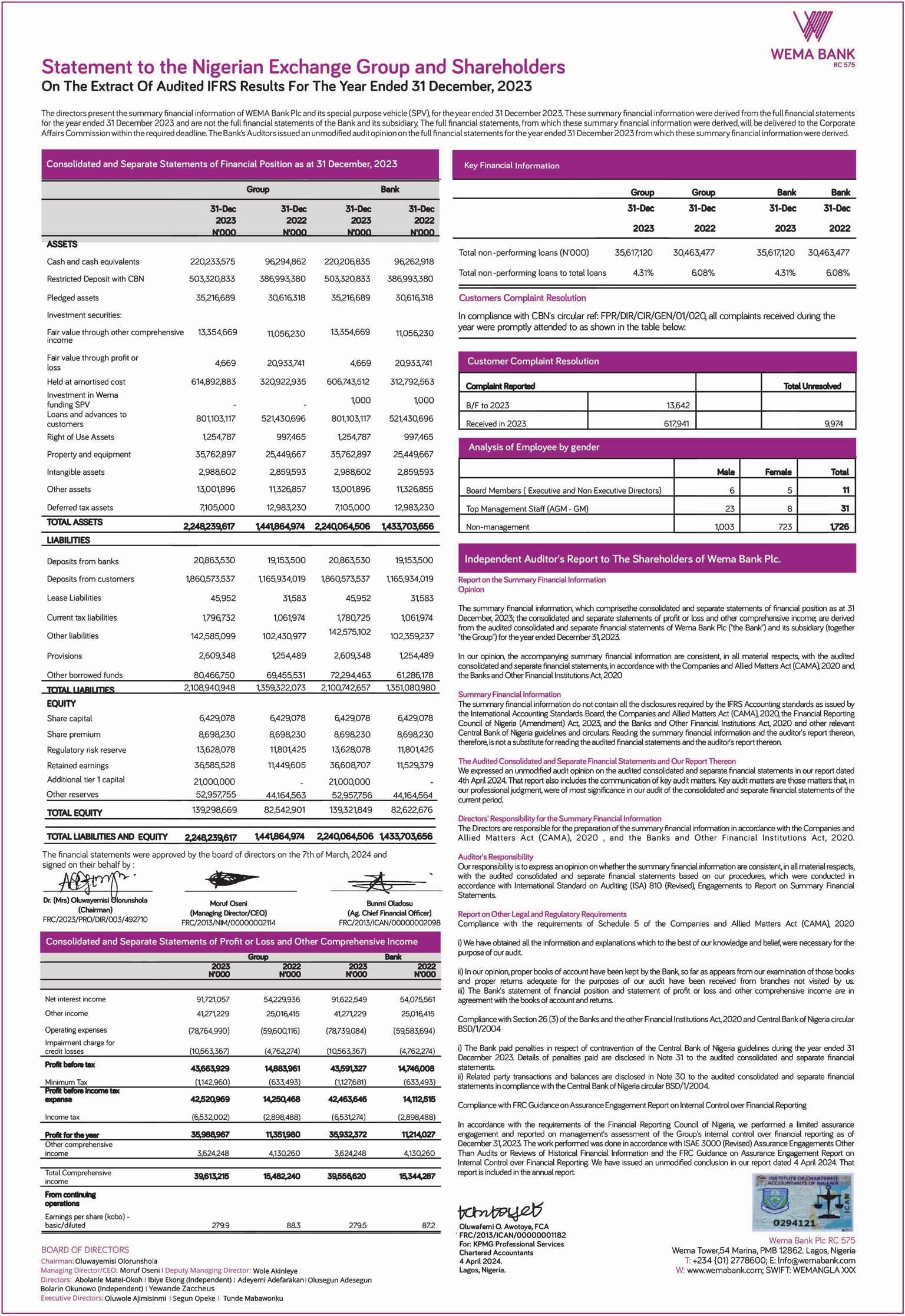
MONDAY APRIL 8 , 2024 • THISDAY 25
This Week In Tech
08097710984 (WhatsApp only)
Tech Top 5 News
NITDA WARNS NIGERIANS OF QR CODE SCAMS
The National Information Technology Development Agency (NITDA) has raised the alarm regarding the escalating risks tied to scanning QR codes, cautioning Nigerians against potentially fraudulent activities orchestrated by scammers exploiting this technology.
QR codes, known as Quick Response codes, are handy two-dimensional codes scannable via smartphones for swift access to information or actions.
NITDA’s statement highlights the alarming trend of scammers leveraging QR codes for phishing scams, payment fraud, data theft, and identity theft. The agency urges users to exercise utmost vigilance and caution while engaging with QR codes to thwart malicious attempts.
“While QR codes offer quick access and convenience, they have unfortunately become a tool for scammers to perpetrate fraudulent activities,” emphasised NITDA, underlining the varying impacts of these codes on users, depending on scammers’ tactics.
NITDA outlined scammers’ methods, including generating QR codes leading to malicious applications or phishing websites, rerouting payments to scammer accounts, and embedding malware or data-stealing scripts within QR codes. These techniques pose severe risks such as unauthorised transactions, private data theft, and identity fraud.
“Scammers exploit QR codes inserted in fake advertisements or surveys to collect users’ personal details like names, addresses, and contact information for identity theft or targeted frauds,” warned NITDA.
To safeguard against QR code-related scams, NITDA advised users to exercise caution when scanning codes from unfamiliar sources, employ reputable QR code scanning apps with robust security features, and keep devices updated with the latest antivirus software and security patches.
By promoting awareness and implementing preventive measures, NITDA aims to empower Nigerians in navigating the digital landscape safely amidst emerging cyber threats associated with QR codes.
ERRANDLR LAUNCHES DIRECT LINK FEATURE, PARTNERS SMARTPARCEL FOR INNOVATION
Nigerian logistics platform, Errandlr has introduced an innovative feature called Errandlr Direct Link, alongside a strategic partnership with SmartParcel locker systems. This move aims to revolutionise the delivery experience for businesses and customers alike.
The Errandlr Direct Link feature is designed to empower vendors by simplifying the delivery process. It generates unique URLs for each vendor or partner, eliminating the need for customers to repeatedly enter destination information when creating waybills. This not only reduces checkout time significantly but also enhances convenience and efficiency in the delivery process, offering customers greater control and transparency.
Moreover, Errandlr has integrated its Direct Link technology with SmartParcel lockers, introducing QR codes that customers can scan using their smartphones. These QR codes enable customers to initiate deliveries, receive unique access codes for lockers, and seamlessly deposit their packages. This integration creates a seamless experience for businesses utilising SmartParcel lockers and their customers.
Benjamin Adeyemo, CEO and co-founder of SmartParcel, expressed determination to deploy digital SmartLockers nationwide, employing the Franchise Model. This initiative invites individuals and corporate entities to invest in SmartLockers, offering guaranteed monthly returns monitored remotely through dashboards.
Additionally, Errandlr Direct Link offers added benefits for businesses using the Paystack online store platform. Vendors can integrate the Direct Link seamlessly into their Paystack store settings, specifically within the “redirect after checkout” field. This integration ensures a smooth transition from purchase to delivery, enhancing the overall customer experience.
SOPHOS REPORT: RANSOMWARE ACCOUNTS FOR 70% OF 2023 CYBERATTACKS
Cybersecurity firm Sophos has released its latest report, revealing a significant rise in ransomware attacks as the primary form of cybercrime targeting businesses in 2023. According to the Sophos Active Adversary Report, ransomware attacks accounted for a staggering 70% of total cyberattacks, marking a concerning trend in the cybersecurity landscape.
The report, which analysed over 150 incident response cases handled by the Sophos X-Ops IR team throughout 2023, also highlighted the persistent threat posed by Network Breach incidents, which

TECH PERSONALITY OF THE WEEK
Fajemisin: The Standout Health Technology Champion

maintained a 19% occurrence rate during the same period. Sophos noted that many network breaches were linked to unsuccessful ransomware attacks, indicating a shift in tactics among cybercriminals.
Sophos provided insights into the correlation between ransomware attacks and network breaches across different quarters of the year. Interestingly, during quarters where ransomware attacks were less prevalent, such as in Q2 (67%) and Q3 (62%), network breaches surged above the annual average, reaching 21% in Q2 and 28% in Q3. This data suggests a strategic adaptation by cybercriminals, with unsuccessful ransomware attempts often leading to network breaches.
The report’s findings underscore the growing sophistication and persistence of cyber threats, urging businesses to prioritise robust cybersecurity measures and proactive incident response strategies. Sophos emphasised the need for organisations to stay vigilant and continuously update their defenses to combat evolving cyber threats effectively.
As ransomware attacks continue to dominate the threat landscape, cybersecurity experts stress the importance of comprehensive cybersecurity protocols, employee training, and regular vulnerability assessments to safeguard sensitive data and prevent costly cyber incidents.
MASTERCARD, MONO FORGE ALLIANCE TO REVOLUTIONISE PAYMENTS IN AFRICA
Mastercard, a global payment giant, has joined forces with Mono Technologies Nigeria Limited, a leading open banking infrastructure provider, in a strategic collaboration poised to reshape the payments landscape across Africa.
Morenike Fajemisin, as the founder and CEO of Whispa Health, is a standout figure in health technology, propelled by an unwavering dedication to advancing digital health. Her leadership reflects a deep-seated commitment to utilising technology to overcome healthcare challenges, particularly evident in Whispa Health’s mission to dismantle the stigma surrounding sexual and reproductive health.
Whispa Health employs innovative technology to offer a range of services aimed at revolutionising SRH awareness and accessibility. These services include anonymous consultations with healthcare professionals, delivery of sexual health products, and provision of educational resources on SRH topics. The startup’s core focus lies in empowering young individuals with the necessary information and services to make informed decisions about their sexual and reproductive well-being. By fostering a safe and supportive environment, Whispa Health strives to create a space where individuals can seek assistance without fear of judgment or stigma.
The impact of Whispa Health’s efforts is already palpable, particularly in Nigeria, where it has positively influenced the lives of numerous young people. By eradicating SRH stigma and facilitating easy access to essential services and information, Whispa Health has emerged as a significant force for good within Africa’s health tech landscape.
Morenike’s visionary leadership extends beyond SRH initiatives to encompass a broader scope of enhancing women’s healthcare accessibility and outcomes. Her strategic prowess and commitment to inclusivity are reshaping the healthcare landscape, promising a future characterised by improved healthcare access and better outcomes for all. Through her pioneering efforts, Morenike sets a high standard for impactful leadership in health technology, inspiring a new generation of innovators to prioritise inclusivity and accessibility in their endeavours.
This groundbreaking partnership leverages Mono’s expertise in open banking and Mastercard Gateway’s cutting-edge payment technology to introduce a secure and efficient account-to-account (A2A) payment solution tailored for businesses in the region. The initiative not only addresses the evolving demands of consumers but also aims to enhance the overall payment experience, setting new standards in the industry.
For Mastercard, this collaboration signifies a significant milestone in its Alternate Payment Methods (APM) strategy in Nigeria and represents a pivotal step towards establishing Mastercard Gateway as a multi-rail gateway, offering diverse payment options.
Folasade Femi-Lawal, Country Manager and Area Business Head at Mastercard, West Africa, emphasised the strategic importance of embedding Mono’s open banking solution within Mastercard Gateway. This move aligns seamlessly with Mastercard’s vision to expand payment methods and improve customer experiences, ultimately driving innovation and financial inclusion in Nigeria and beyond.
Abdul Hassan, CEO and co-founder of Mono, echoed the sentiment, highlighting the collaboration’s significance for Mono, fintech, and Open Banking payments in Africa. This partnership signifies a convergence of Mono’s mission to power the internet economy in Africa with Mastercard’s vision to connect and empower a digital economy benefiting all stakeholders.
The joint efforts of Mastercard and Mono aim to foster an ecosystem that propels the region’s digital economy forward through financial inclusion, innovation, and sustainable growth, paving the way for transformative changes in the payments landscape across Africa.
MICROSOFT UNBUNDLES TEAMS FROM OFFICE
GLOBALLY
Microsoft’s latest move to sell its chat and video app, Teams, separately from its Office product globally has stirred discussions within the tech and business sectors. This decision, effective from April 1, 2024, marks a significant shift in the company’s strategy, particularly in response to antitrust concerns. The decision follows a similar unbundling move made by Microsoft in Europe six months ago. This initial separation was seen as a proactive measure to avoid potential antitrust fines from the European Commission. The recent global rollout of this separation underscores Microsoft’s commitment to addressing regulatory pressures worldwide.
Under the new pricing structure, Office will be available for new customers at rates ranging from $7.75 to $54.75. Meanwhile, Teams will be sold separately as a standalone product for an additional $5.25. These prices may vary depending on the country and currency.
Existing customers with licensing deals inclusive of Teams can choose to retain their current arrangements or migrate to the new offerings. Microsoft emphasises that current suites like Microsoft 365 Business and Frontline with Teams will coexist alongside the new lineup. Customers have the option to select suites with Teams included or opt for versions without Teams, such as Microsoft 365 Business Basic, Microsoft 365 Business Standard, Microsoft 365 Business Premium, Microsoft 365 F1, Office 365 F3, and Microsoft 365 F3. This strategic move by Microsoft comes in the wake of its history with EU antitrust fines amounting to approximately $2.37 billion over the past decade. The company faces potential charges of up to 10% of its global annual turnover if found guilty of antitrust breaches, making these regulatory considerations crucial in shaping its business decisions moving forward.
26
alekhuogien@yahoo.com Nosa Alekhuogie
MONDAY, APRIL 8, 2024 • THISDAY
BUSINESS WORLD
Excess liquidity: CBN Raised N7.7tn via NTBs, OMO in Q1 2024
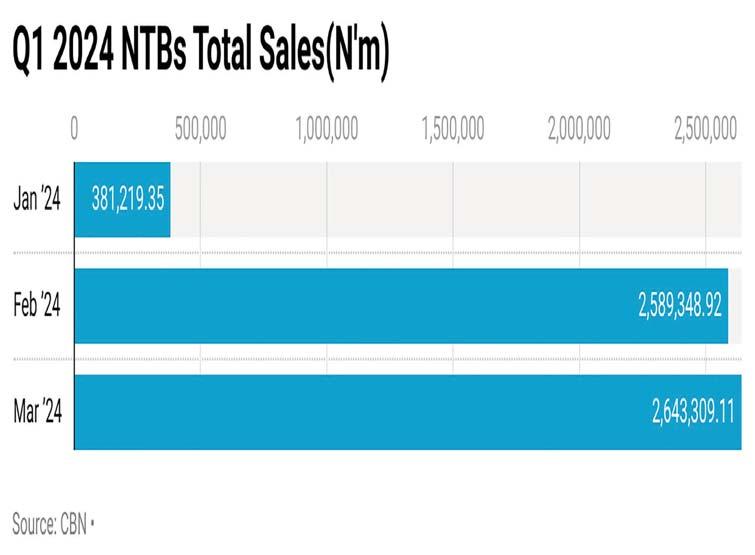
Kayode Tokede
Following its drive to tackle excess liquidity in the banking sector, the Central Bank of Nigeria (CBN), raised a whooping N7.7 trillion from Nigerian Treasury Bill (NTBs) and Open Market Operation (OMO) in first quarter of 2024.
This, according to THISDAY findings, represent 383 per cent increase over N1.59 billion raised by the CBN in Q1 2023.
Analysis of market numbers revealed active NTBs auctions all through the first three months of 2024, while OMO auctions were only conducted January and March.
A breakdown revealed that the CBN in Q1 2024 sold a total N5.6 trillion NTB as against N1.59 trillion sold in Q1 2023, while OMO total sales in Q1 2024 stood at N2.06 trillion and these no OMO sales in Q1 2023.
Notably, foreign and local investors responded positively to
higher rates, as seen in the robust subscriptions, suggesting confidence in the CBN’s ability to manage the country’s fiscal challenges.
Specifically, foreign and local investors total subscription on NTBs stood at N21.1 trillion as it offered N2.21trillion in Q1 2024. A closer look at the Q1 2024 NTBs revealed a gradual increase in the stop rates offered by the CBN. The stop rates on NTB have surged significantly from 2.44 per cent on a 91-day tenor bill, 4.22 per cent on a 182-day tenor bill, and 8.3995 on a 364-day tenor bill from the first auction in January to 16.24 per cent, 17 per cent, and 21.124 per cent respectively from the last auction in March 2024.
The heightened interest in the NTBs signifies a keen investor appetite for higher interest rates, providing a solid anchor for the fiscal stability of Nigeria. Notably, the stop rate for the 364-day bill hit a high of 21.124 per
cent on the same date, reflecting tightening monetary conditions.
This longer tenor bill attracted a mammoth subscription of approximately N2.48 trillion, with the CBN capitalising on this demand to offer a whopping N142.16 billion at this rate, costing the apex bank N239.61 million in interest payment.
Experts expressed that the NTBs auction represents a move by the CBN to manage the country’s address liquidity in the financial system, stressing that inflation rate responsible for push in NTBs interest rate witnessed so far in Q1 2024.
Commenting on the development, the Vice President, Highcap Securities Limited, Mr. David Adnori, stated that NTBs are considered to be one of the safest forms of investment since they are backed by the government.
He said, “As the rate on NTB increases, it becomes more attractive to investors who are seeking a risk-free investment as they may choose to invest in

Treasury Bills rather than other riskier investment options. The CBN had lure investors with attractive interest rate otherwise most of these auctions will under subscribed. The performance of the one-year bills showed that investors had confidence in the current government and the reforms it had embarked on.
“Firstly, the investors are seeking higher rates for funding due to CBN signalling further tightening due to accelerating inflation and other factors. Secondly, interest seems skewed towards the longer end of the curve, which is an indication of confidence in the government and its reforms. Also, the massive over–subscription shows the significant system liquidity.”
The CEO, Wyoming Capital and Partners, Mr. Tajudeen Olayinka said, “the essence is to encourage foreign inflows that could help improve dollar liquidity in the
foreign exchange market and cause a moderation in naira exchange rate until the market attains equilibrium level.
“I have no doubt that it was the most appropriate decision on the part of CBN and government at this time. There’s need to improve dollar liquidity that will eventually force domestic interest rate to moderate subsequently.”
The CBN, under Yemi Cardoso, has increased the monetary policy rate (MPR) by 600 basis points so far, from 18.75per cent to 24.75 per cent. The apex bank’s decision to tighten monetary policy by increasing interest rates and auctioning larger volumes of treasury bills is a strategic move to address several macroeconomic concerns.
Higher interest rates are typically employed to control inflation; they make borrowing more expensive, thereby tempering spending and
investment, which, in theory, should reduce the upward pressure on prices.
Additionally, these higher rates tend to attract foreign investors seeking better yields, leading to an inflow of foreign currency, which can help stabilise and potentially strengthen the Nigerian Naira.
The CBN recently disclosed that over 75 per cent of bids received during the auctions of government securities held on March 1 and 6, 2024, were from foreign investors, showcasing their growing interest in Nigeria’s financial instruments. The increase in the stop rates for NTBs over the quarter signals an aggressive tightening of monetary policy by the CBN. The higher interest rates on these government securities could increase borrowing costs across the economy. Businesses might face higher expenses to finance operations or expansion, potentially slowing down economic growth.
Farmers Predict Lower Food Prices, Availability on Strong Naira Performance
Gilbert Ekugbe
The All Farmers Association of Nigeria (AFAN) has predicted a bumper year for Nigeria in terms of food availability and prices.
The National president, AFAN, Kabir Ibrahim, during a chat with THISDAY, hinged his prediction on a strong naira performance, maintaining that Nigerians should expect higher productivity and cheaper products in 2024.
In his words, “We are lucky that the naira is firming up, apart from insecurity, there is also a challenge of inputs, most of the herbicides
and insecticides are imported, but we believe with naira firming up, it will help in reducing the cost of production. We expect higher productivity and cheaper food products in 2024 because the context of food security is that food must be available, affordable and balanced.”
“The purchasing power of the naira has a lot to do with that and once it firms up, we believe things would work very well. The President assured the nation that his government is doing a lot to curb inflation and we can see the efforts of the CBN in that regard, we believe it is in work in progress,” he said.
On Nigeria’s long walk to attain food security, the AFAN boss said the present administration is on the right path to achieving the feat considering some of the lofty and credible partnerships the Tinubu-led administration is prioritising.
“The government is implementing a programme supported by the African Development Bank (AfDB) to focus on four crops which include, wheat, rice, cassava and maize. The National Agriculture Growth Scheme Agro Pocket. We have done the flag off of the dry season programme on wheat in Jigawa State and our members have started harvesting
already,” he said. “The federal government is also supporting 500,000 farmers and they will get everything free from the herbicides, insecticides and fertilisers. The support would cover only half hectares of land in each State. The government is also doubling their efforts to tackling insecurity and prioritising mechanisation. The government will be one year in May, but we can only encourage them to do better. We applaud their efforts and we urge them to increase the tempo especially on insecurity,” he averred.
He also called on the State
Governors to complement the efforts of the federal government to tackling food shortages, saying that to achieve food security is an onerous task that only the federal government cannot achieve alone.
“We believe that the government is doing its best and the farmers are encouraged to keep going and working assiduously to make Nigeria food secure. The federal government is making efforts to support farming all year round. Even from the point of view of the Nigeria Agric Business Group (NABG), with support from the Bill and Melinda Gates, they are promoting an agricultural smart
policy that would drive all-year round farming,” he stressed. He commended the federal government for the progress made in tackling insecurity food producing States, saying that farmers have begun to experience respite in that regard.
“We received testimonials from farmers who said that they had to give money before they go into their farms, but I believe there has been a lot of respite in that regard as these States have deployed vigilantes while there is also a strong presence of the Nigerian Army,” he noted.
RATES AS AT APRIL 5,2024 MONEY MARKETREPOS & P INDEX S & P INDEXEXCHANGE RATE OPR 25.34% CALL 23.25% INDEX LEVEL 595.26 1/4 TO DATE 0.24% N1,262.85/ 1 US DOLLAR* OVERNIGHT 25.18% 1-MONTH 21.37% 1-DAY 0.10% YEAR TO DATE -10.99%*AS AT THUR., APRIL 4, 2024 3-MONTH 22.41% MONTH-TO-DATE 0.24% BONDS DESCRIPTIONPriceYield Change (%) Updated Time ^13.53 23MAR-2025 94.6919.82 0.01 April 5, 2024 ^12.50 22JAN-2026 90.2619.11 0.01 April 5, 2024 ^16.2884 17MAR-2027 93.95 19.05 0.00 April 5, 2024 ^13.98 23FEB-2028 84.26 19.97 0.00 April 5, 2024 ^14.55 26APR-2029 85.19 19.25 0.00 April 5, 2024 MARKET DATA AS AT FRIDAY, APRIL 5, 2024 BILLS MATURITYDiscountYield Change (%)Updated Time NTB 9-May24 16.15 16.40 0.00 April 5, 2024 NTB 6-Jun24 16.30 16.76 -0.01 April 5, 2024 NTB 11-Jul24 16.49 17.24 -0.01 April 5, 2024 NTB 8-Aug24 16.6417.64 -0.01 April 5, 2024 NTB 5-Sep24 16.7918.06 -0.01 April 5, 2024 OTC FX FUTURES CONTRACT TENOR (MONTH) Contract Current Rate ($/₦) Updated Time 13M NGUS MAR 26 2025 – April 5, 2024 14M NGUS APR 30 2025 – April 5, 2024 15M NGUS MAY 28 2025 – April 5, 2024 16M NGUS JUN 25 2025 – April 5, 2024 17M NGUS JUL 30 2025 – April 5, 2024 CPS MATURITYDiscountYield Change (%) Updated Time LFZC CP IV 16-APR-24 23.3523.52 -0.02 April 5, 2024 MTNN CP VII 14 -MAY-24 20.70 21.16 0.00 April 5, 2024 UACN CP VI 19-MAR-24 20.13 21.00 0.03 April 5, 2024 DUFIL CP III 25-JUL-24 19.73 20.99 0.05 April 5, 2024 FDHC CP VI 2-AUG-24 17.57 18.64 0.04 April 5, 2024
Group Business Editor Eromosele Abiodun Email oriarehu.eromosele@thisdaylive.com 08056356325 27
THISDAY MONDAY, APRIL 8, 2024
Rewane: Nigeria Still on Margin of Global Maritime Trade
Renowned economist, Mr. Bismarck
Rewane, has said that the Nigerian maritime industry still lies on the margin in global maritime trade after four years post the COVID era.
He stated that with the global economy standing at about $90 trillion pre-COVID and Nigeria’s share at about 2 per cent, global trade is expected to rise at about three per cent in 2025.
With fluctuating currency exchange rate, he posited that Nigeria’s economy is speculated to slightly underperform.
Hence, he advised that to keep up with the ever-changing trends in the global maritime industry, the Nigerian Maritime industry must first aspire to bounce back to the Pre-COVID era of maritime business.
Speaking during the second Maritime Industry Breakfast Meeting
Redundancy:
Aero Contractors has said that it has paid about 95 per cent redundancy packages to some of its staff affected by the exercise about seven years ago. The Chief Executive Officer (CEO) of Aero Contractors, Capt. Ado Sanusi, said that 94.94 per cent of workers affected by the purge in 2017 had been paid fully their severance packages, promising that the remaining 5. 06 per cent would be paid to the affected staff very soon.
of the Nigerian Maritime Law Association (NMLA), he submitted that to bounce back from this state, the Nigerian maritime industry must build strong institutions.
Rewane also noted that Nigeria must stimulate growth by encouraging cabbotage and international trade to boost indigenous business competitiveness.
“We are marginal players in the maritime industry. But in the meantime, we have to aspire to where we want to go. And to aspire, we have the cabbotage law and all of those, to ensure that you begin to grow from there. What is common to positive economic outcome is strong institutions. That is the test of economic analysis to look at.
“It is important to know that the flow of trade has changed and Nigeria’s share of all of these things is actually declining.
First, Nigeria needed to catch up with where it used to be. Nigeria
does not have that comparative advantage.
“Comparative advantage is a national endowment and how you use natural endowments to give you an open market and how the companies within your economy can compete against themselves and compete against others,” he said.
On her part, President, NMLA, Mrs. Funke Agbor, noted that the subject of Nigeria’s position on the global maritime environment is crucial at a time as this.
The topic, she said, is an eye opener for industry experts and professionals and would help to guide policy directive for the industry for the progress of the nation.
She said: “The speaker broke down how he saw the growth of the maritime industry and it is definitely related to the growth of the Nigerian economy. So, if the economy grows the Nigerian maritime would grow.”

Enhancing Retirement Benefits through Voluntary Contributions in CPS
Saving for retirement has become increasingly crucial as retirees have a plethora of needs during their retirement years. In Nigeria, the Contributory Pension Scheme (CPS) has played a vital role in enabling individuals to plan effectively for retirement. The pension reform of 2004 aimed to establish a sustainable system that ensures a stable, predictable, and adequate source of retirement income for every Nigerian employee.
Fixed and Contingent Portions
Sanusi stated that out of a total number of 237 staff affected by the redundancy package, 225 staff have been paid off, representing 94.94 per cent of those affected.
Further breakdown of the affected workers indicated that three members of the Air Transport Senior Staff Services Association of Nigeria (ATSSSAN), and nine members of the National Association of Aircraft Pilots and Engineers (NAAPE) were still being affected by the exercise, while efforts were ongoing to pay
the outstanding to the staff. Sanusi further lamented that the operating environment where the airlines operate from was hostile to business, but said despite this, the management had been relentless in ensuring a vast majority of affected persons were paid their entitlements.
He assured that Aero Contractors remained committed to fulfilling its obligations to all workers, but appealed to the unions not to allow themselves to be used to disrupt activities in the airline.
Exporters: Wood Export now Highly Regulated
Tropical Wood Exporters Association of Nigeria (TWEAN), has said that since the ban on wood export from Nigeria was lifted last year by the Convention on International Trade in Endangered Species of Wild fauna and Flora (CITIES), Nigeria wood industry has become highly regulated and creating increased economic activities in the sector.
The General Secretary of TWEAN, Mr. Joe Odiase in a chat with newsmen said that since the ban was lifted last year coupled with government’s pro-activeness to grow the sector, more furniture manufacturing companies are coming into the wood industry. Odiase disclosed that the sector currently engage about 5million Nigerians in the value chain of the wood processing industry adding
that more could still be done if the policies guiding the sector are fully implemented.
He also said that the Minister of Environment has met with several stakeholders in the wood industry so as ensure every stakeholder is carried along in the process of growing the industry.
He said: “The Minister of Environment has had several stakeholders meeting with saw millers, with exporters, with local furniture makers and also visited the management of the Nigeria Customs Service to discuss the
Hammed Shittu in Ilorin
An entrepreneur and Chairman AmuGold Global Network, Mr. Temitope Amujo has described the non-availability of forex as one of the major obstacles to the industrial and economic development of the country. He however urged the federal government to rise up to the challenge so as to allow the smallscale business enterprises to thrive in the country.
Amujo stated this in Ilorin over the weekend during the 10th year anniversary of the establishment of Jumpo- Ori Shea Company, a subsidiary of the AmuGold Global Network.
According to him, “the current forex availability is a serious issue that we are facing but it is no one fault and not the government fault but the fault of demand and supply.”
He explained that, “No fewer than 90 percent of what we are using for production of Jimpo-Ori Shea are local materials but we cannot do without the elements of importation.
ease of exporting wood. “You cannot export without specifications from the Ministry, you cannot export without contributing to the aforestation programme of government, which is also contained in the policy guidelines on wood export.
“President has brought about policies that have allowed the industry to flourish because after six or years of suspension, and with the economy situation of the country over five million Nigerian gets engaged in the wood value chain.”
To achieve this goal, PenCom introduced the concept of Voluntary Contributions (VC), providing workers with the opportunity to increase their retirement income. The VC is a non-mandatory contribution remitted into an employee’s Retirement Savings Account (RSA) through the employer. It allows employees to make additional contributions beyond the mandatory contributions set by law (minimum of 10 percent from employers and 8 percent from employees).
Highlighted below are some of the benefits of
Voluntary Contributions:
Enhanced Accumulation of Pension Savings Voluntary
Contributions enable individuals to rapidly build up their pension savings during their working years, helping them meet their retirement income goals. Employees can determine the level of contributions required to reach their target income at retirement. Those with specific income targets can seek advice from their Pension Fund Administrators (PFAs). Furthermore, the “pension calculator”, which is available on most PFAs’ websites, can be utilised to make projections of amounts required to be saved in order to attain specified retirement income targets.
Voluntary Contributions (VC) remitted into the RSA are segregated into two segments, i.e. contingent and fixed portions. The contingent portion, which constitutes 50% of the VC, is available for withdrawal by the contributors provided the contributions have remained in the RSA for a minimum period of two years. On the other hand, the fixed portion, also comprising 50% of voluntary contributions, can only be accessed by the RSA holder an RSA holder at retirement. This fixed portion significantly bolsters an employee’s pension and lump sum upon retirement.
Since the inception of the CPS to February 2024, a total of 51,443 RSA holders have withdrawn N43.34 billion from their Voluntary Contributions.
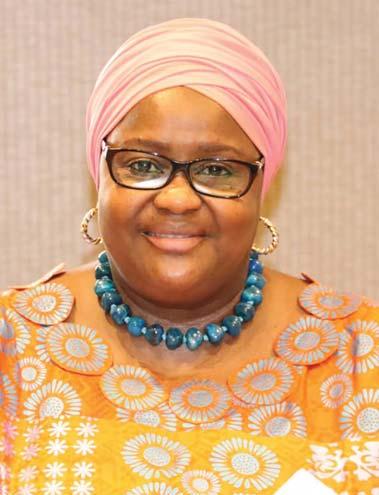
Tax Incentives
All income accrued to the VC investment is not taxable if the withdrawal is made five years later. Additionally, if individuals withdraw their VC after five years, no tax will be applied to the amount withdrawn. This provision further enhances the RSA balances towards higher retirement incomes.
How to Make Voluntary Contributions
“When we talk of importation we cannot do without forex and when we talk about forex, you can look at the present situation is not really encouraging but the truth is that at a point we are seriously devastated when the forex crisis got to a certain level to the extent that the people supplying us can no longer supplied us again.
“The situation was so bad then that we felt of reducing our staff, can we stop some lines? At times we will be waiting for materials that will be needed in production lines of the company but not forthcoming due to non availability of forex to have the materials needed for production.”
Amujo added that, “We are not tired or frustrated because we still have belief in our country. Some other sister companies also said we should move to another neighbouring countries where there is constant power supply and there is availability of forex to work with for our production but we let them know that the time we supposed to move, we didn’t move and so the movement is not now.
Through VC, employees can significantly boost their retirement income. By making additional contributions, which enables them to benefit from, individuals can harness the power of compounding interest over time, thereby enhancing the size of their retirement benefits when they exit active service.
Flexibility in Making Contributions
Voluntary Contributions offer contributors the flexibility to decide the amount and frequency of their contributions. Contributions may be made monthly, quarterly, bi-annually, or annually. Contributors can start and stop their contributions at their convenience and increase or reduce the amount as needed.
Inclusivity
Voluntary Contributions are available to workers, including retirees under the defunct Defined Benefit Scheme (DBS) and those under the CPS who rejoin service on contract. Additionally, workers in the private sector belonging to Closed Schemes or Approved Existing Schemes can also make Voluntary Contributions.
Eligible individuals should notify their employers in writing about their intention to make Voluntary Contributions, specifying the desired amount to be deducted. However, the amount cannot exceed 1/3 of the employee’s monthly salary, in accordance with the Labour Act of 1990.
Employers are responsible for remitting the Voluntary Contributions to the employee’s existing RSA. Failure to remit the contributions after deductions will result in penalties, as outlined in Section 11 (7) of the Pension Reform Act (PRA) 2014.
All Voluntary Contributions, along with the mandatory contributions, are managed by PFAs and held in custody by Pension Fund Custodians (PFC). The PFAs invest and manage the Voluntary Contributions in strict compliance with the regulations issued by PenCom governing pension funds and assets. Furthermore, in compliance with the Money Laundering Act (MLA) 2011 and requirements from the Nigerian Drug Law Enforcement Agency (NDLEA), any single Voluntary Contribution lodgement of N5 million and above must be reported by the PFC.
In conclusion, Voluntary Contributions within the CPS represents a proactive approach towards enhancing retirement planning and financial security for Nigerian workers. By offering flexibility and boosting retirement income, VC plays a crucial role in realising the vision of a sustainable and prosperous retirement future for employees.
28 BUSINESSWORLD NEWS
PENCOM DG, Aisha Dahir-Umar
‘FX
Group Business Editor Eromosele Abiodun Deputy Business Editor Chinedu Eze Comms/e-Business Editor Emma Okonji Asst. Editor, Money Market Nume Ekeghe Senior Correspondent Raheem Akingbolu (Advertising) Correspondents Emmanuel Addeh (Energy) KayodeTokede(CapitalMarkets) James Emejo (Finance) Ebere Nwoji (Insurance) Reporters Peter Uzoho (Energy) Ugo Aliogo (Development)
Oluku
Aero Laments Challenges, Insist 95% Affected Workers Paid
Crisis Major Threat to Economic Development’
Esther
Chinedu Eze
MONDAY, APRIL 8, 2024 THISDAY
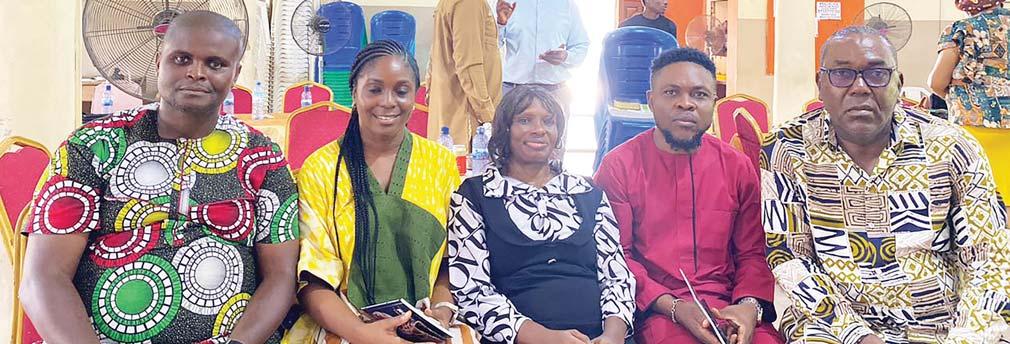
FOU Intercepts Contraband Worth N2.8bn in Three-months, Arrests 29
The Nigeria Customs Service (NCS), Federal Operations Unit (FOU), Zone ‘A’ Ikeja, over the weekend, announced that it seized contraband worth N2.87billion between January to March, 2024 and made 29 arrests during the period.
In a chat with newsmen, the Customs Area Controller, Compt Hussein Ejibunu, said the seizures were due to violations of various sections of the Nigeria Customs Service Act
2023, the federal government Import and Export Prohibition guidelines. He said the items include; 21 trucks load of foreign parboiled rice, 40 units of used vehicles, 286 cartons of rubber slippers; 1,220 cartons of foreign tomato paste; 2,705 kegs of premium motor spirit; 3,510 pieces of pneumatic used tyres; 330 bales of used clothes and 2,230 kg of Indian Hemp. Others, he added, are; 1,569 cartons of foreign frozen poultry products;
365 cartons of unmarked drugs; 104 units of Haojuo Motorcycle and 566 cartons of smuggled slippers.
He further stated that the command made a revenue recovery of N305.3million, representing 67 per cent collection of the unit’s target. According to him, “Seizures recorded in the 1st quarter of 2024 were due to violations of various sections of the Nigeria Customs Service Act 2023, the federal government import
and export prohibition guidelines. While vigorously and relentlessly executing our anti-smuggling campaign, a total of 206 seizures were made worth the sum of duty paid value of N2,877,049,777 while 29 suspects were arrested. Revenue recovery made within the period under review was N305,310,010.44 this represents 67% collection of the N455,202,073.97 revenue target for the year 2024.”
Nigerdock Commits N1.5bn to School, Infrastructure Devt in Igbologun Community
A leading Nigerian maritime and logistics company operating an integrated port and free zone in Lagos, Nigerdock has committed over N1.5 billion into the construction of a Junior and Senior Secondary School, a police Station, 1.5km community road, a double finger jetty and donated two brand new state-of-the-art 24-seater coaster to the Igbologun community in Apapa area of Lagos State.
Speaking at the official commissioning and handover of the projects, Nigerdock Chairman and Chief Executive Officer, Maher Jarmakani, said undertaking and completing these projects, reaffirms its immense dedication to positive social impact for its neighbouring communities. “By investing in education and security, we continue to provide opportunities to nurture talent,
social advancement, and to ensure the overall well-being of our stakeholders. Through a proven track record of mutual collaboration, Nigerdock has consistently worked in harmony with the communities, and we are building upon a history of successful partnerships and community engagement,” he said.
Also speaking, the Lagos State Commissioner for Basic and Secondary Education, Jamiu Tolani Alli-Balogun, expressed gratitude for the developments, stating that as the Lagos State Government accelerates access to word-class pedagogic learning to ensure students have access to quality education irrespective of their location in the state, it is excited to receive the schools.
NIDO-Russia Raises Alarm over Fraudulent Activities of Impersonators
Gilbert Ekugbe
The Nigerians in Diaspora Organisation Europe Russia (NIDO) has raised alarm over the fraudulent activities perpetuated by impersonators hiding under the organisation to deceive and mislead Nigerians.
At a virtual meeting to announce its dissociation from the fraudulent act the organisation described the act as an organised crime to defraud Nigerians and warned that the unscrupulous individual has never been a member of the group.
The Chairman, NIDO Russia and member of the Board, NIDO Europe, Sampson Uwem-Edimo, said NIDO’s attention has been drawn to several public video recordings, publications in the print and electronic media and commercials, in which one individual in Russia, has been confusing or deceiving the public by presenting his entity as the Nigerians in Diaspora Organisation Russia.
In his words, “The purpose of this conference is to state categorically that we at NIDO Russia completely disassociate ourselves from any information to the public that is unauthorised by NIDO Russia. We have informed the public through the press that nobody can present themselves as who they are when they are not.
Foundation Wants Minister to Intervene in Erisco/Chioma Okoli Crisis
Raheem Akingbolu
A nonprofit civil society organization dedicated to addressing issues of social injustice and corruption in Nigeria, Akin Fadeyi Foundation (AFF), has made a subtle appeal to the Honourable Minister of Women Affairs, Barrister Uju Kennedy-Ohanenye, to intervene in the ongoing brouhaha, involving the Chief Executive Officer of Erisco Foods, Mr. Eric Umeofia and a consumer, Chioma Okoli by calling the two parties to a dialogue with the aim of settling the matter out of court and bring it to a conclusion.
In a letter titled; “A Call to Action: Urgent Intervention Regarding the
Bullying of Chioma Okoli by Eric Umeofia, CEO, Erisco Foods,” copy of which was sighted by THISDAY, the foundation expressed its displeasure over the way and manner Mr. Umeofia and the Nigerian Police, have consistently profiled Chioma’s actions as cybercrime, describing the action as nothing but unequivocal violation of the consumer’s right. According to the letter, “It is evident that labeling Chioma’s actions as cybercrime is unjustifiable, as she was merely a contractual customer of Erisco Foods through a sales purchase transaction. Therefore, her product review, whether positive or negative, cannot be misconstrued as cybercrime.
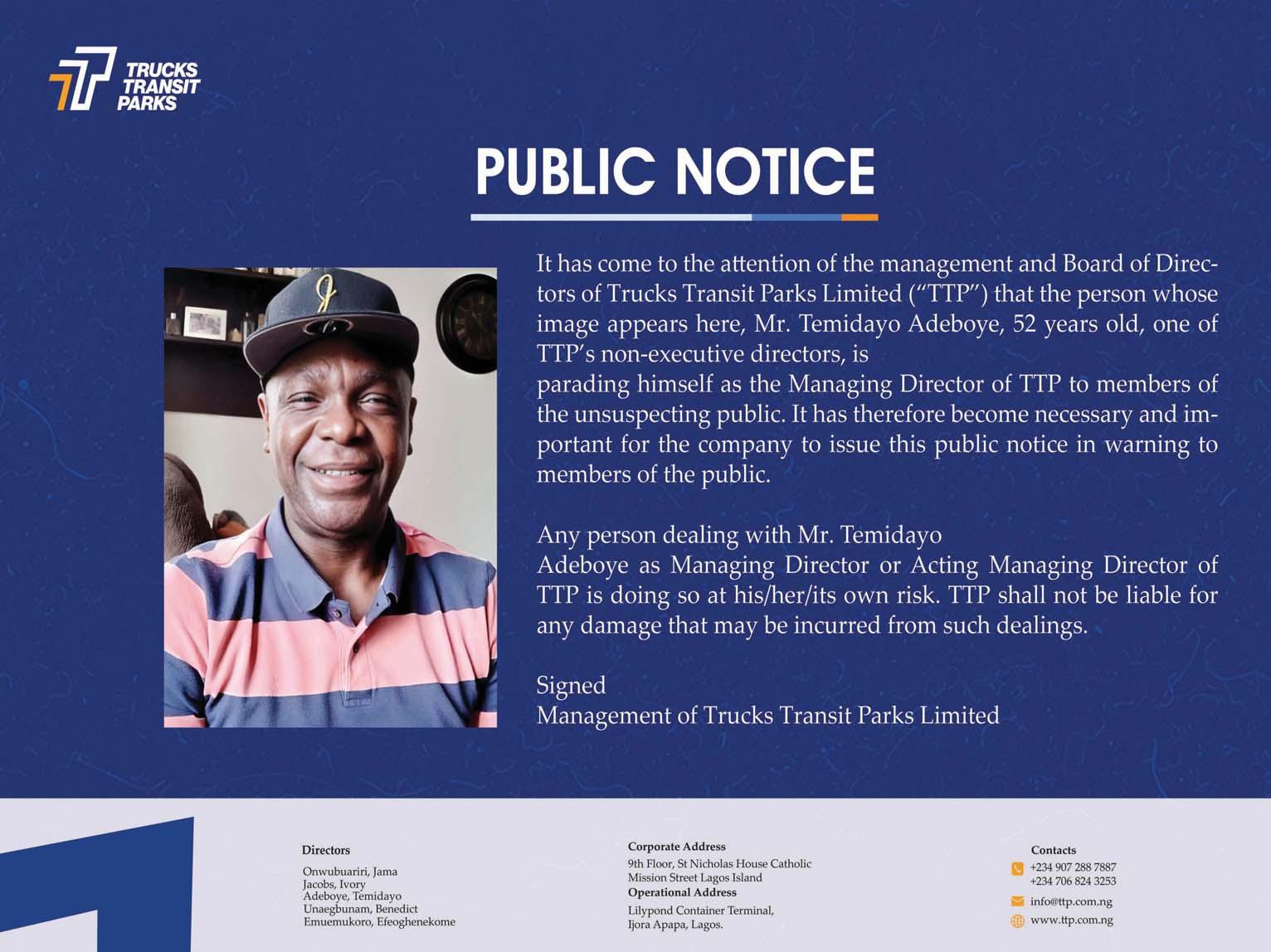
29 BUSINESSWORLD NEWS THISDAY MONDAY, APRIL 8, 2024
L-R: The Editor, THISDAY on Saturday, Mr Obinna Chima; Assistant Editor, Business, Mrs Nume Ekeghe; former Money Market Correspondent, THISDAY Newspapers, Mrs Linda Eroke-Okafor, Group Business Editor, THISDAY Newspapers, Mr Eromosele Abiodun and the Managing Director/CEO, Brandish Media, Mr Ikem Omuhu during the launch of a book titled ‘Revealed: Nine Ways I Overcame Depression with Zero Budget,’ written by Eroke-Okafor in Lagos… recently
Powering Nigeria’s Sugar Industry through Backward Integration
Yusuf Ebiti writes on efforts by Dangote Sugar Refinery to boost the nation’s sugar industry through backward integration

There is a silent revolution going on in Nigeria which is a march towards changing the status quo in Nigeria’s sugar industry.
The revolution is led by Dangote Sugar Refinery (DSR) through its backward integration programme (BIP) aimed at ensuring that Africa’s most populous nation has a virile and thriving sugarcane-to-sugar value chain.
The revolution began immediately after 2012 when former President Goodluck Jonathan initiated the Nigerian Sugar Master Plan (NSMP), which was aimed at raising the local sugar production to attain self-sufficiency and reduce the importation of raw and refined sugar.
The initiative was fully implemented by serious stakeholders, one of which was DSR, that has Alhaji Aliko Dangote as chairman.
Twelve years after the master plan, DSR has surpassed expectations, acquiring over 120, 000 hectares (ha) of land for its sugar BIP projects in Adamawa, Nasarawa and Taraba states. Quite a big part of the hectares have so far been cleared and planted. Some are in their secondary stages.
By developing these plantations, DSR is working hard to ensure that Nigeria ends the importation of raw sugar - which is an essential input - in a matter of years.
Without a doubt, importation of raw sugar costs Nigeria millions of dollars annually. In 2020 alone, raw sugar importation cost Nigeria $433 million, according to the National Sugar Development Council (NSDC). This is even lower than $516 million spent by Nigeria in 2016 while importing raw sugar.
With the current foreign exchange crunch occasioned by Nigeria’s low productive and export capacities, analysts said the projects can help to reduce raw sugar imports and subsequently cut Nigeria’s exposure to forex.
Research shows that DSR owns 32,000 ha in Numan, Adamawa State, as well as 68,000 ha in Tunga, Nasarawa State for its BIP projects. In Lau/Tau, the company acquired 25,000 ha for its BIP projects in Taraba State. For a country with acute unemployment crisis, these investments have proven to be pivotal, engaging rural farmers and giving them hope amid economic crisis.
Dangote Sugar currently has over 12,000 direct and indirect employees and has developed a robust outgrower scheme of over 1,000 farmers in addition to other
empowerment schemes for persons in the immediate communities.
Investments are currently drying up in the Nigerian economy. In the manufacturing sector, for instance, investments in the first half of 2023 stood at N193 billion, according to the Manufacturers Association of Nigeria (MAN). This represents 60 per cent drop from N483 billion investments made by manufacturers in the first half of 2014. Amid tanking investment inflows and economic uncertainties, DSR has demonstrated zeal and confidence in the Nigerian economy, particularly the sugar value chain.
So far, the company has committed over $700 million in land acquisition, machinery, infrastructure, manpower, community relations, corporate social responsibility (CSR) and other impact activities.
The company told Nasarawa State House of Assembly members recently that the $700 million investments in sugar would revolutionalize the economy and lift many out of poverty.
Apart from the National Sugar Master Plan initiated in 2012, DSR has its own master plan geared towards ensuring that Nigeria achieves its broad national sugar objectives.
Entitled, “Dangote Sugar for Nigeria Master Plan,” the vision is targeted at ensuring that the company produces 1.5 million metric tonnes per annum
“Upon completion of the BIP projects, the sugar company will be able to create about three hundred thousand direct and indirect jobs, with positive multiplier effects on the national economy.”
(MT/PA) of refined sugar from locally grown sugarcane. Experts believe that this is achievable given the speed with which work is done at Numan and Tunga plants.
In Numan, Adamawa State, DSR’s existing factory has been upgraded and its capacity increased from 3,000 tonnes cane crushing per day(TCD) to 6000 TCD. Further upgrade to 9,800 TCD is ongoing and is expected to be ready any time from now.
DSR Numan is currently engaged in the planting and growing of sugar cane for the production and sale of refined sugar and molasses. The facility produces refined sugar from 8850 hectares of sugar cane cultivated on its sugar cane fields.
The plant is expected to generate 32 megawatts of electricity after the upgrading process and is expected to launch the factory into a fully integrated sugar production within Nigeria.
DSR is currently the only refiner producing Vitamin A fortified white granulated edible sugar from its BIP site at Numan.
The company has upgraded its Numan six megawatts (MW) of power generation capacity to 32.5MW, with a potential to export excess 20MW to the national grid.
Optimisation of the process is ongoing for more efficient energy operation to reduce steam consumption maximally. In-house conversion of molasses into ethanol plant is under study and will be implemented to convert all our molasses to ethanol, the company said.
Commentng,the Chief Executive Officer, DSR, Numan, Mr Chinnaya Sylvain Judex, said the company was targeting to produce 9,800 metric tonnes of sugar per day at the end of the current expansion.
“The Outgrower Scheme Programme is a very important project for us and is currently a win-win situation for both the company and the farmers,” he said.
The company has invested properly in its Outgrower Scheme Programme and other CSR projects. In the fullyear 2023 financial statement, DSR spent N229 million in projects such
as roads, scholarships, financial support in Numan and Tunga. However, in last few years the company has invested over N1 billion in CSR.
This may look insignificant, but it is a huge amount of money when considered side by side with other investments made by the company in communities yearly.
In Tunga, Nasarawa plant, installation of the centre pivot irrigation system for the 665 ha A & B nursery has been completed. Similarly, installation of the phase 1 of 6000HA of commercial development has started and is due to be completed soon. Bush clearing is completed for the first phase of the 6000ha commercial development in readiness for planting.
Other infrastructure development activities at the site are either completed or due to be completed. Staff housing phase 1 is completed, and Phase 2 of the scheme is 80 percent completed.
Communication tower, water and fuel tanks as well as boreholes have been completed. Water treatment plant is due to be completed soon.
According to Agric Manager, Nasarawa Sugar Company Limited, Simon Ibetson, the company has been making steady progress to produce both sufficient cane and refined sugar for the Nigerian economy.
“We will get up to phase 1, which will be another 2,000 hectares this year. We are looking at 3,000 hectares by 2025. We are looking at moving from 3,000 hectares to 6,000 hectares in 2026,” he explained.
He said that the company was looking at 120 tons yield per hectare and had the capacity to go higher.
Taxes are essential for the growth and development of any nation. Dangote Group has continued to pay billions of naira in tax to drive the Nigerian economy and ensure it takes its proper place in the comity of nations.
DSR paid N55.38 billion in tax between 2020 and 2022. So far, the company has paid over N249 billion in taxes in the past five years.
“Upon completion of the BIP projects, the sugar company will be able to create about three hundred thousand direct and indirect jobs, with positive multiplier effects on the national economy,” Aliko Dangote said in October 2023 during a media tour of Numan plant.
30 BUSINESS SPECIAL Editor: Goddy Egene goddy.egene@thisdaylive.com 0803 350 6821 MONDAY, APRIL 8, 2024 THISDAY
Sugarcane plantation

MONDAY APRIL 8 , 2024 • THISDAY 31
CIBN Records 34.72% Revenue Growth to N2.78bn
Nume Ekeghe
The President and Chairman of Council of The Chartered Institute of Bankers of Nigeria (CIBN), Ken Opara has said that the CIBN recorded a substantial 34.72 per cent increase in revenue, soaring from N2.065 billion in 2022 to N2.782 billion in 2023.
He also noted that the total assets of the institute surged from N7.821 billion in 2022 to N9.119 billion in 2023, signaling a robust growth trajectory.
He stated this over the weekend at the institute’s Annual General Meeting (AGM) held in Lagos.
“The cost-to-income ratio for the year ended December 31, 2023, stood at 50.72 per cent, down from 59.41 per cent in the corresponding period in 2022. This ratio is way below the approved Governing Council threshold of 61 per cent for the 2023 financial year. I am persuaded that with prudent and efficient management of resources, as well as diligent execution of our strategic plan, our Institute will sustain this northward trajectory.”
Furthermore, Opara is set to transition to a new executive
He said: “Total revenue grew from N2.06 billion recorded in 2022 to N2.78 billion in 2023 representing 34.72 per cent growth, while total assets grew from N7.82 billion in 2022 to N9.119 billion in 2023. It is on record that our Institute for the first time crossed the N1billion mark by achieving a Net Operating Surplus of N1.371 billion in 2023 when compared with N837 million achieved in 2022, representing a growth of 63.60 per cent.
team next month, marking the culmination of his tenure.
The transition was formalised during the AGM, where Professor Olanrewaju Pius Oladeji emerged as the President-elect, Mr. Alabi Oladele Adebiyi as the incoming 1st Vice President, and Mrs. Bakare-Asieru Mojisola Adebisi as the 2nd Vice President designate.
He said: “As I begin to round up and prepare to pass the baton to my successor, I am confident that the CIBN is well-equipped to address evolving issues in the banking and finance landscape and that the Institute is in capable hands knowing fully well that my successor has the experience and capacity to take the Institute to greater heights, even as the Institute keeps getting better with every successive administration.
Sundry Foods Steps Up Kilimanjaro Expansion in Nigeria
Sundry Foods Limited (SFL), a leading food services company in Nigeria, announced at the weekend that it has stepped up expansion of its flagship Kilimanjaro Restaurant with the recent launch of six new restaurants across Nigeria.
Managing Director/CEO of the company, Mr. Ebele Enunwa, said in a statement that the expansion effort is designed to enhance customer experience at locations in close proximity to where they live or work in the country.
“We aim to transform the culinary experience of Nigerians and bring it to their doorsteps.
“We take great pride in the fact that our expansion strat-
egy is delivering tremendous results across our key growth pillars,”. We have a clear trajectory for future growth as we continue to build on our brand strength and impressive footprint within the country,” Enunwa said
According to the statement the new branches were opened in response to the desires of its numerous customers residing or doing business in those areas. The statement further disclosed that the company just opened a new Kilimanjaro Restaurant at the brand new Koka Junction Shopping Mall, along Benin-Onitsha Expressway, Asaba, Delta State. This is the third Kilimanjaro restaurant to be established
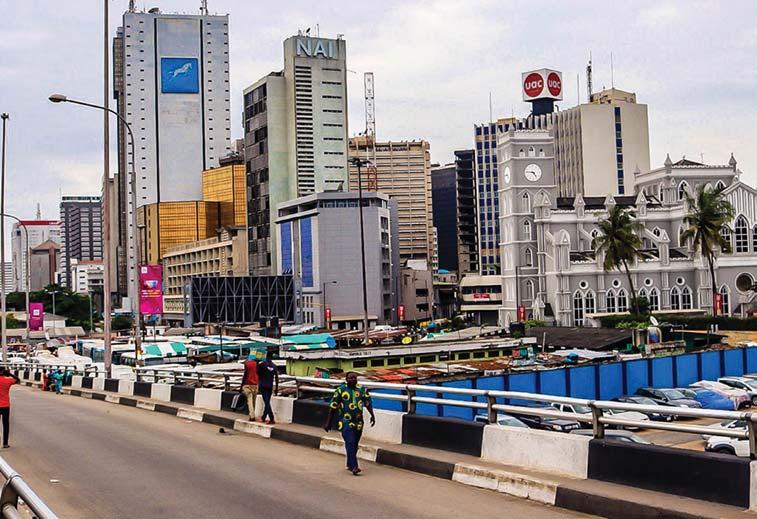
in the state.
A new restaurant was also opened with the Deidei area of Abuja, FCT. This restaurant opened on Sunday, 24th March, 2024. Enunwa, reiterated that the expansion drive will deliver the company’s trademark excellent quality food and related services to Nigerians all over the country, adding, “By making strategic and highly targeted investments to drive value for partners, Sundry Foods will also drive value for customers and shareholders, while managing costs, improving margins, and elevating the company’s experience for all stakeholders.”
Chrystallis Conversations Empowers Women at Workshop
Chrystallis Conversations, a women-focused platform and community founded by renowned media and communications expert, Kemi Ogunleye, recently hosted the third edition of its Live series, “The Good Morning Workshop.”
Held in partnership with Amstel Malta and Legend Twist, the event was designed to be a springboard for women ready to step into their power and achieve their full potential.
Speaking at the event, convener of Chrystallis Live,
Kemi Ogunleye said, “This edition was inspired by the popular maxim: “Whenever you wake up is your morning.” Ogunleye said, “The event was designed to be a catalyst for women who have woken up to their potential and are ready to step into their greatness. With a powerful combination of expert advice, personal stories, and a supportive community, we essentially created a toolkit to equip women with the information and resources they need to move from potential to performance.”
The workshop featured a stellar line-up of speakers, including Dr. Glory Edozien, an award-winning LinkedIn visibility coach; Ifeoma Williams, a strategic communications expert and keynote speaker Omoyemi Akerele, the visionary force behind Lagos Fashion Week and Style House Files.
In her keynote address, Akerele captivated the audience with her personal story, highlighting her journey from a career in law to becoming a trailblazer in the African fashion ecosystem.
Medic W’Africa Announces 11th Edition of Healthcare Exhibition
Medic West Africa, the region’s premier healthcare exhibition and conference, returns for its 11th year in Lagos. Organised by Informa Markets, a global leader in event organization, Medic West Africa 2024 will convene over 6,000 healthcare professionals, fostering a platform for innovation and collaboration that propels advancements in healthcare infrastructure across West Africa. The organisers in a statement said this is year’s event focuses on harnessing the collective power of the healthcare community to address the region’s evolving needs.
“With the African healthcare sector undergoing a period of unprecedented transformation
driven by the fourth industrial revolution and its technological advancements, Medic West Africa 2024 serves as a critical venue for knowledge exchange and idea generation. “Medic West Africa has established itself as the premier platform for industry stakeholders to connect, collaborate, and drive innovation in healthcare across West Africa,” said, Senior Exhibition Director of Medic West Africa, Tom Coleman. He added, “We are committed to fostering an environment where attendees can explore the latest advancements, share best practices, and forge partnerships that will ultimately improve patient care in the region. By bringing together a diverse range of healthcare
professionals, including leading manufacturers, distributors, government officials, and clinicians, we can create a synergy that accelerates the development and implementation of solutions that address the specific needs of West Africa’s healthcare systems.”
Medic West Africa 2024 will serve as a critical platform for collaboration and knowledge sharing. The exhibition floor will be a vibrant hub showcasing the latest advancements transforming healthcare delivery. Attendees can explore a wide range of groundbreaking products and technologies, including state-of-the-art medical equipment and devices, innovative pharmaceuticals, and cutting-edge digital health solutions.
BUSINESS/ MONEYGUIDE
MONEY AND CREDIT STATISTICS (MILLION NAIRA) FEBRUARY Money Supply (M3) 95,557,263.40 -- CBN Bills Held by Money Holding Sectors 1,588,771.44 Money Supply (M2) 93,968,491.96 -- Quasi Money 63,691,242.70 -- Narrow Money (M1) 30,277,249.26 ---- Currency Outside Banks 3,411,735.44 ---- Demand Deposits 26,865,513.82 Net Foreign Assets (NFA) 7,408,009.72 Net Domestic Assets(NDA) 88,149,253.67 -- Net Domestic Credit (NDC) 114,788,867.95 ---- Credit to Government (Net) 33,925,848.79 ---- Memo: Credit to Govt. (Net) less FMA 0.00 ---- Memo: Fed. and Mirror Accounts (FMA) 0.00 ---- Credit to Private Sector (CPS) 80,863,019.16 --Other Assets Net 13,319,068.99 Reserve Money (Base Money 21,230,656.70 --Currency in Circulation 3,693,573.23 --Banks Reserves 17,537,083.47 --Special Intervention Reserves 433,229.15 Money Market Indicators (in Percentage) MonthFebruary Inter-Bank Call Rate 19.25 Minimum Rediscount Rate (MRR) Monetary Policy Rate (MPR) 22.75 Treasury Bill Rate 17.03 Savings Deposit Rate 5.86 1 Month Deposit Rate 8.69 3 Months Deposit Rate 9.89 6 Months Deposit Rate 9.61 12 Months Deposit Rate 10.75 Prime Lending rate 15.06 Maximum Lending Rate 26.55 The price of OPEC basket of twelve crudes stood at $87.33 a barrel on Monday, compared with $86.00 the previous Thursday, according to OPEC Secretariat calculations. The OPEC Reference Basket of Crudes (ORB) is made up of the following: Saharan Blend (Algeria), Djeno (Congo), Zafiro (Equatorial Guinea), Rabi Light (Gabon), Iran Heavy (Islamic Republic of Iran), Basrah Medium (Iraq), Kuwait Export (Kuwait), Es Sider (Libya), Bonny Light (Nigeria), Arab Light (Saudi Arabia), Murban (UAE) and Merey (Venezuela) OPEC DAILY BASKET PRICE AS AT 4TH APRIL , 2024 32 MONDAY, APRIL 8, 2024 THISDAY
MARKET INDICATORS
NGX Group, Others Acquire 75% Stake in Ethiopian Securities Exchange
Kayode Tokede
Nigerian Exchange Group Plc (NGX Group), and other investors have acquired a 75 per cent stake in the Ethiopian Securities Exchange (ESX).
NGX Group is among the top institutional investors that have injected capital into the operationalisation of the bourse alongside FSD Africa, a UK-backed non-profit financial institution, and
Trade and Development Bank Group (TDB), the financial arm of the Common Market for Eastern and Southern Africa (COMESA) trade block.
This pivotal move not only marks NGX Group’s entry into East Africa but also underscores its commitment to driving growth and innovation in the African capital markets, while strategically positioning itself as the largest foreign institutional investor in
the ESX.
The investment in the Ethiopian Stock Exchange reflects NGX Group’s confidence in the potential of Ethiopia’s rapidly growing economy and capital market. By partnering with ESX, NGX Group aims to support the development of a vibrant and resilient financial ecosystem in Ethiopia, fostering increased investor participation and capital formation.
Through this investment, NGX Group aims to contribute to robust regulatory frameworks and foster best practices within the ESX ecosystem. The Group remains dedicated to providing ongoing technical assistance and capability enhancements to support the successful operations and growth of the ESX.
Chairman of NGX Group, Alhaji Umaru Kwairanga in a statement stated, “ We extend
our congratulations to the ESX on its successful capital raise and commend the Government of Ethiopia and the private sector for their support in bringing this pioneering initiative in the country to fruition.
“Our partnership with ESX is a resounding affirmation of our unwavering dedication to promoting economic development, transparency, and exemplary corporate gov-
ernance standards that foster an environment conducive to inclusive growth, even as we aim to maximize value for our esteemed shareholders.”
Group Managing Director/ CEO of NGX Group, Temi Popoola commented: “We are excited to announce our investment in the Ethiopian Stock Exchange, which represents a significant milestone in our expansion strategy.
PRICES FOR SECURITIES TRADED ASOF APRIL 4 /24
MAIN BOARDDEALS MARKET PRICE QUANTITY TRADED VALUE TRADED ( N )

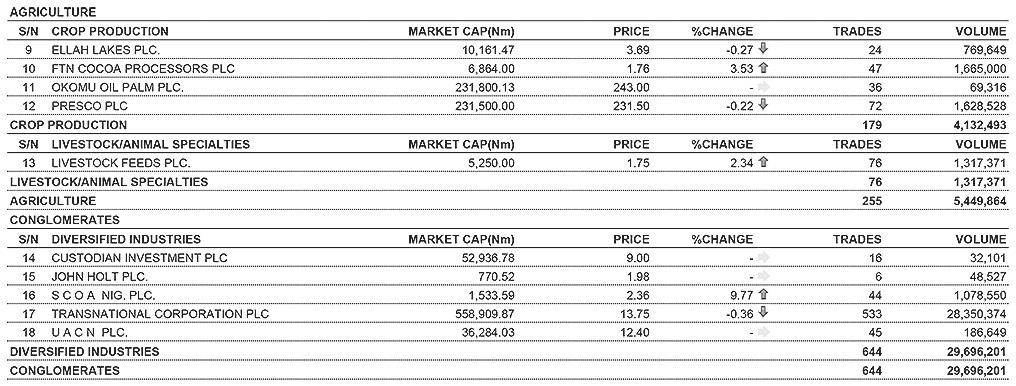
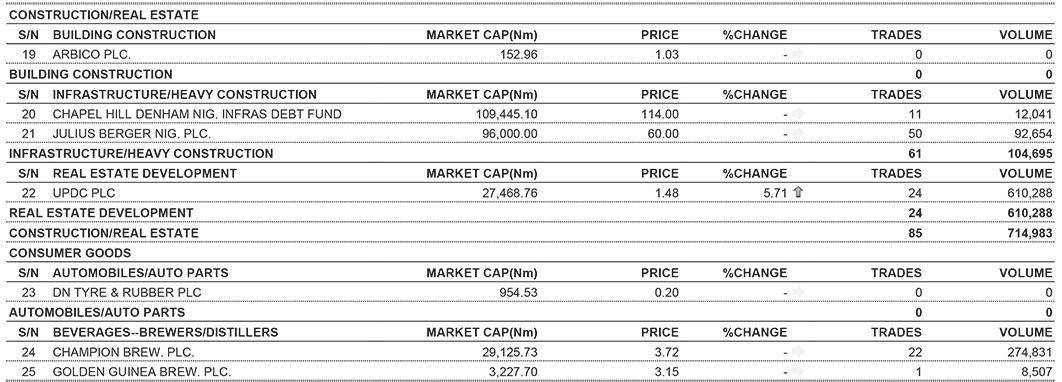
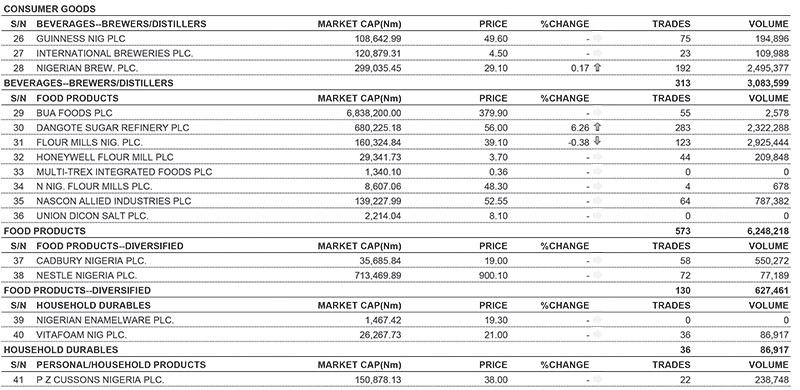

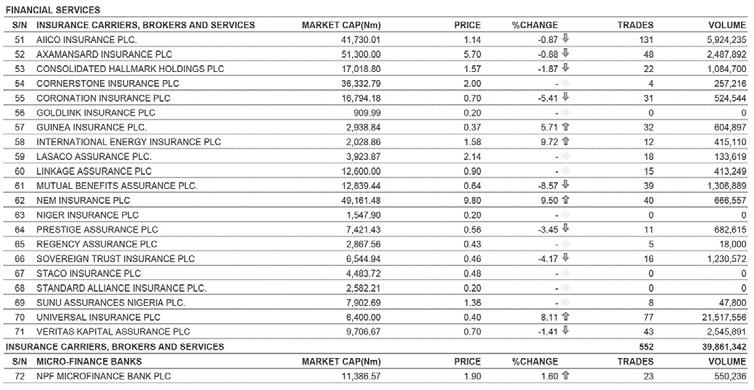
MAIN BOARDDEALS MARKET PRICE QUANTITY TRADED VALUE TRADED ( N )

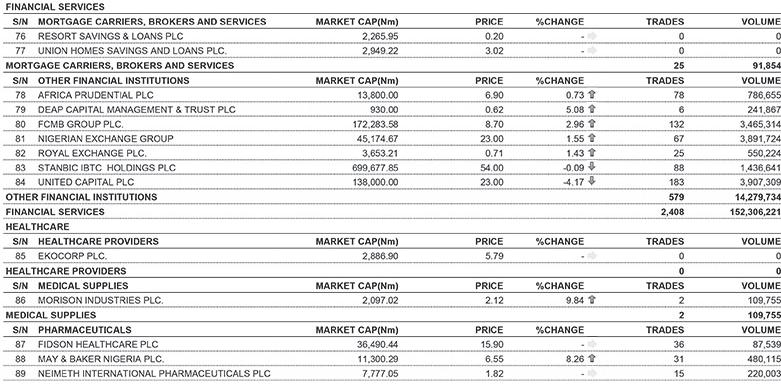
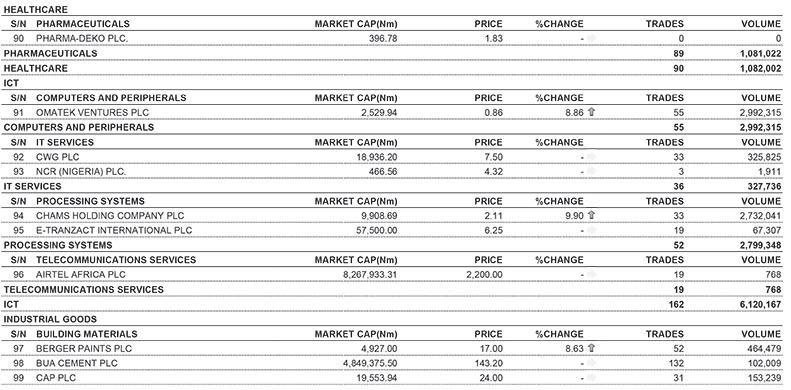
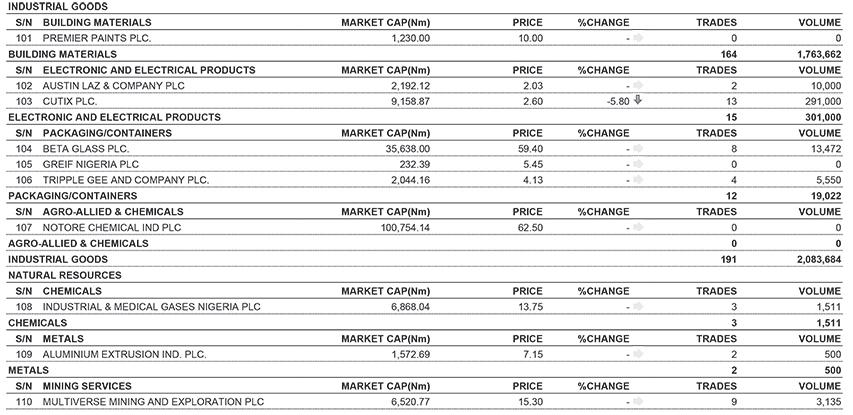
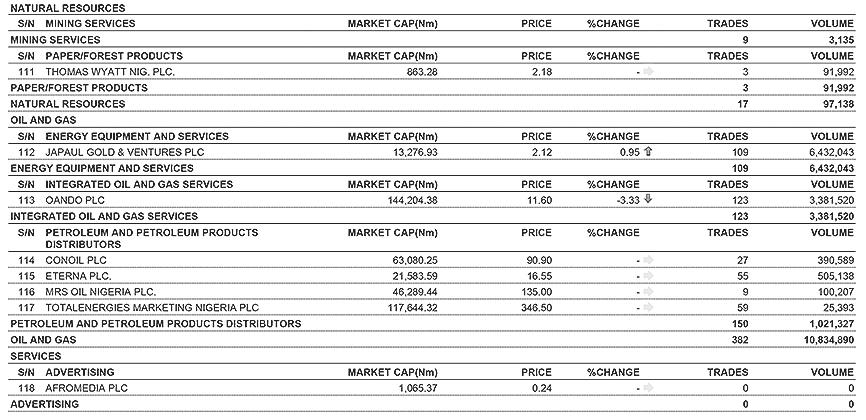
MARKET NEWS 33 MONDAY, APRIL 8, 2024 THISDAY
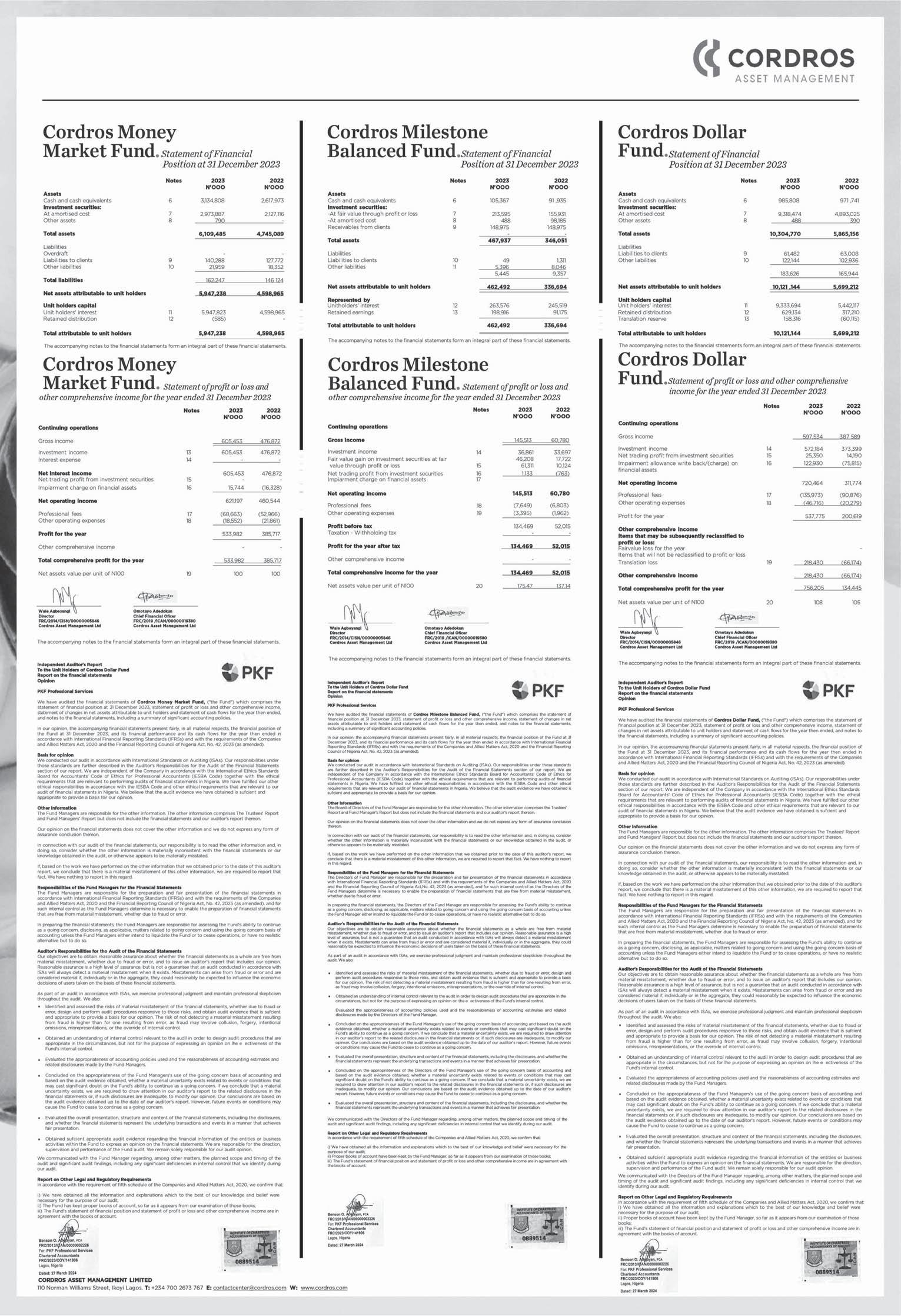
34 MONDAY APRIL 8, 2024 • THISDAY
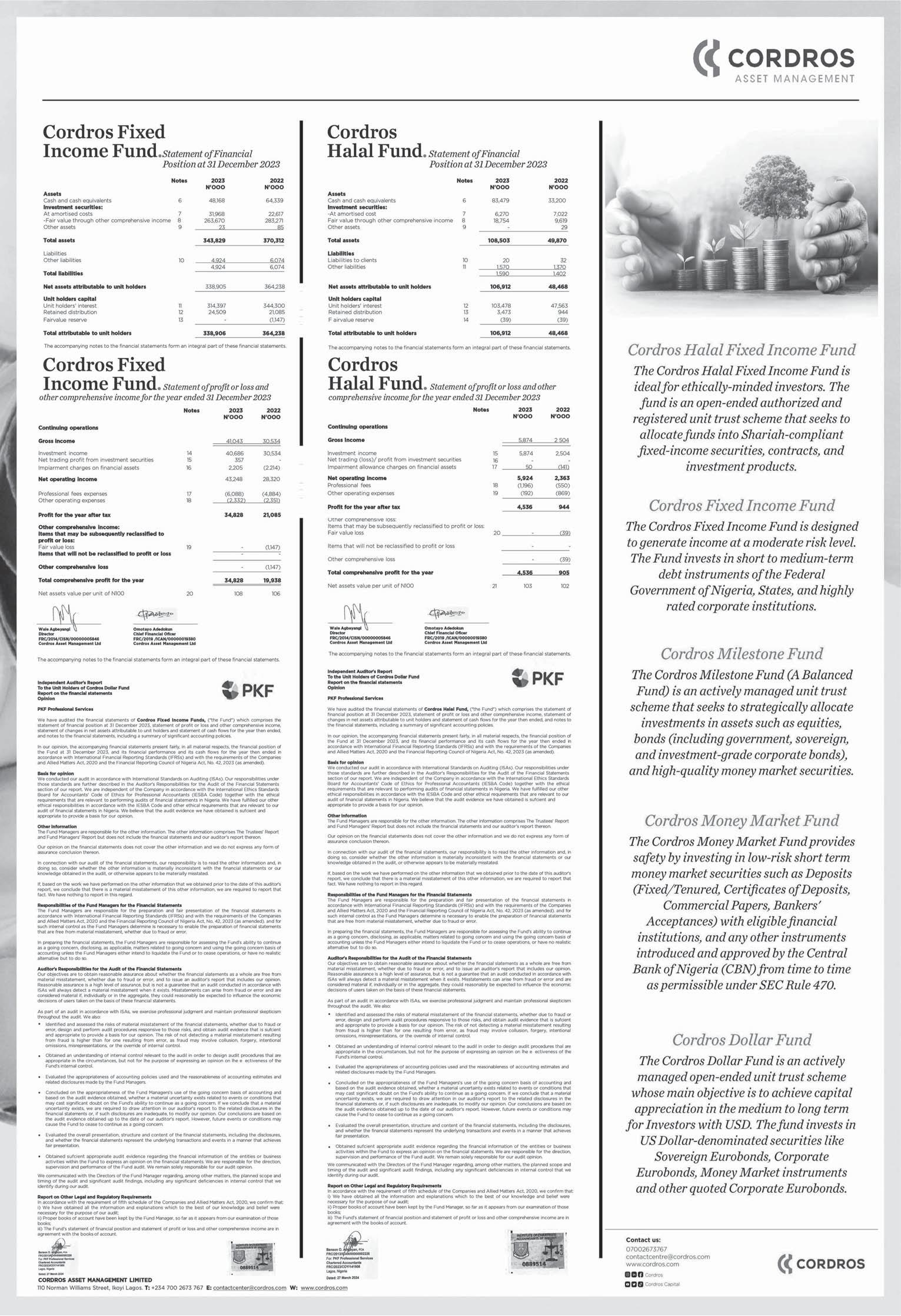
MONDAY APRIL 8 , 2024 • THISDAY 35
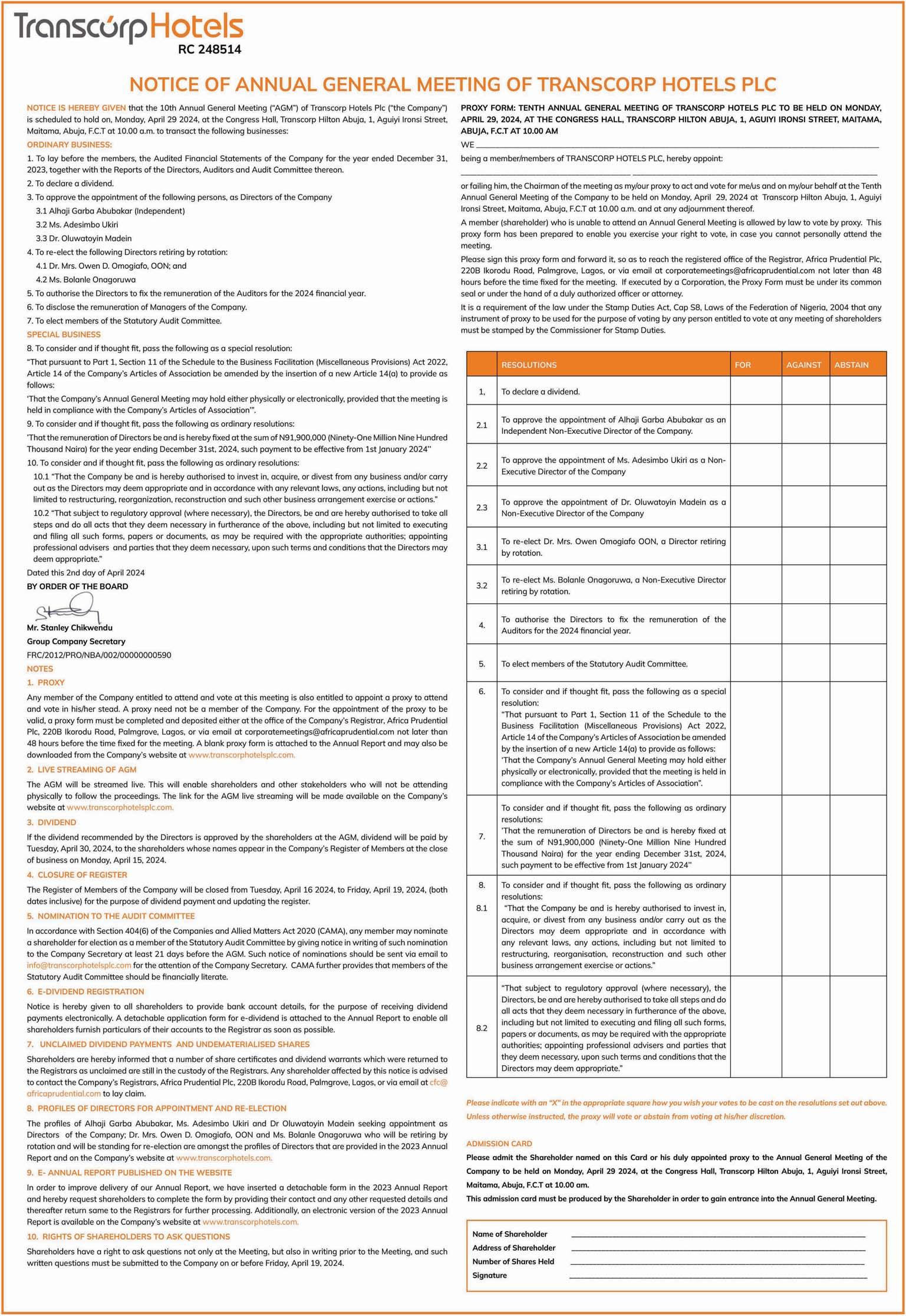
36 MONDAY APRIL 8, 2024 • THISDAY
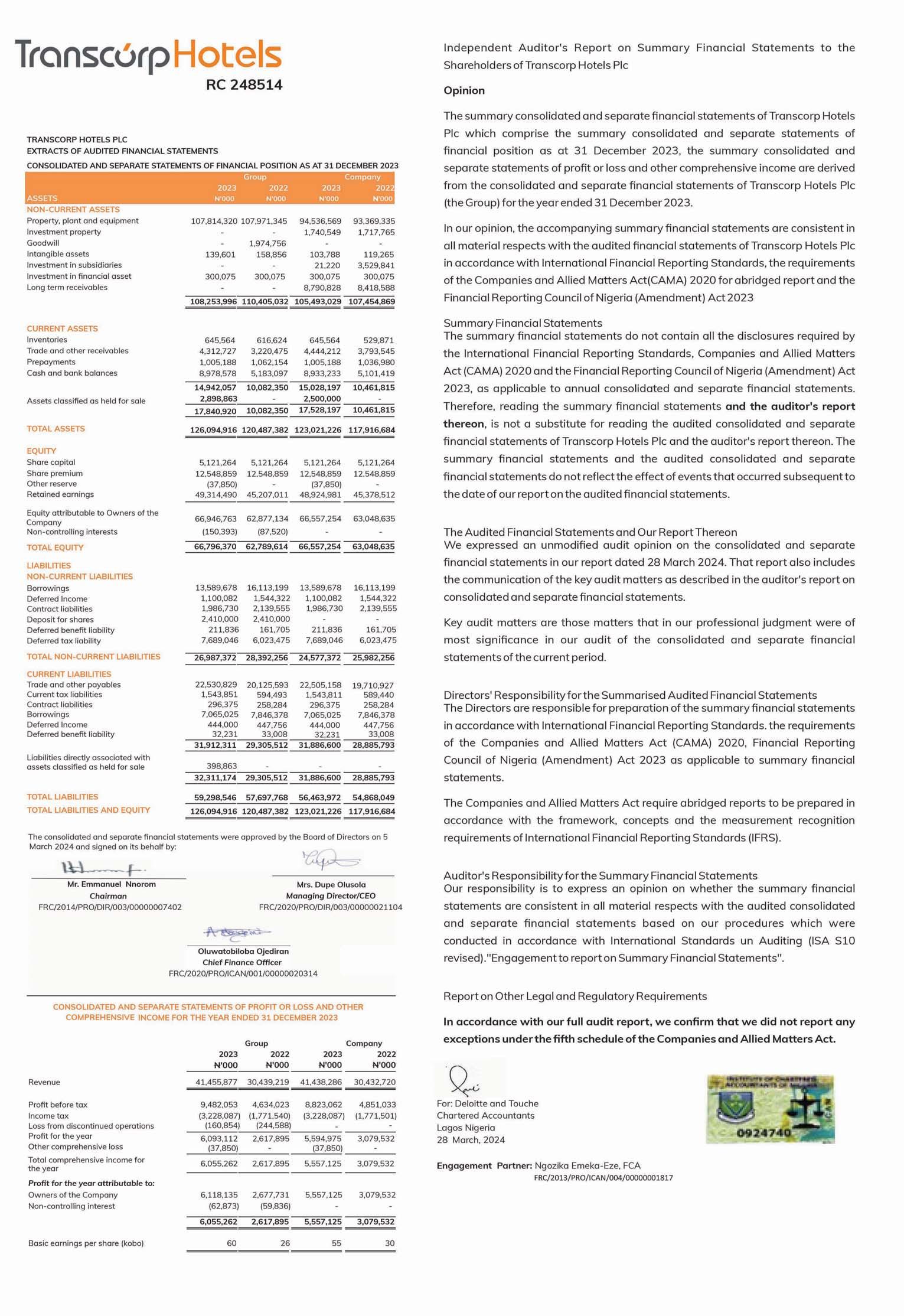
MONDAY APRIL 8 , 2024 • THISDAY 37
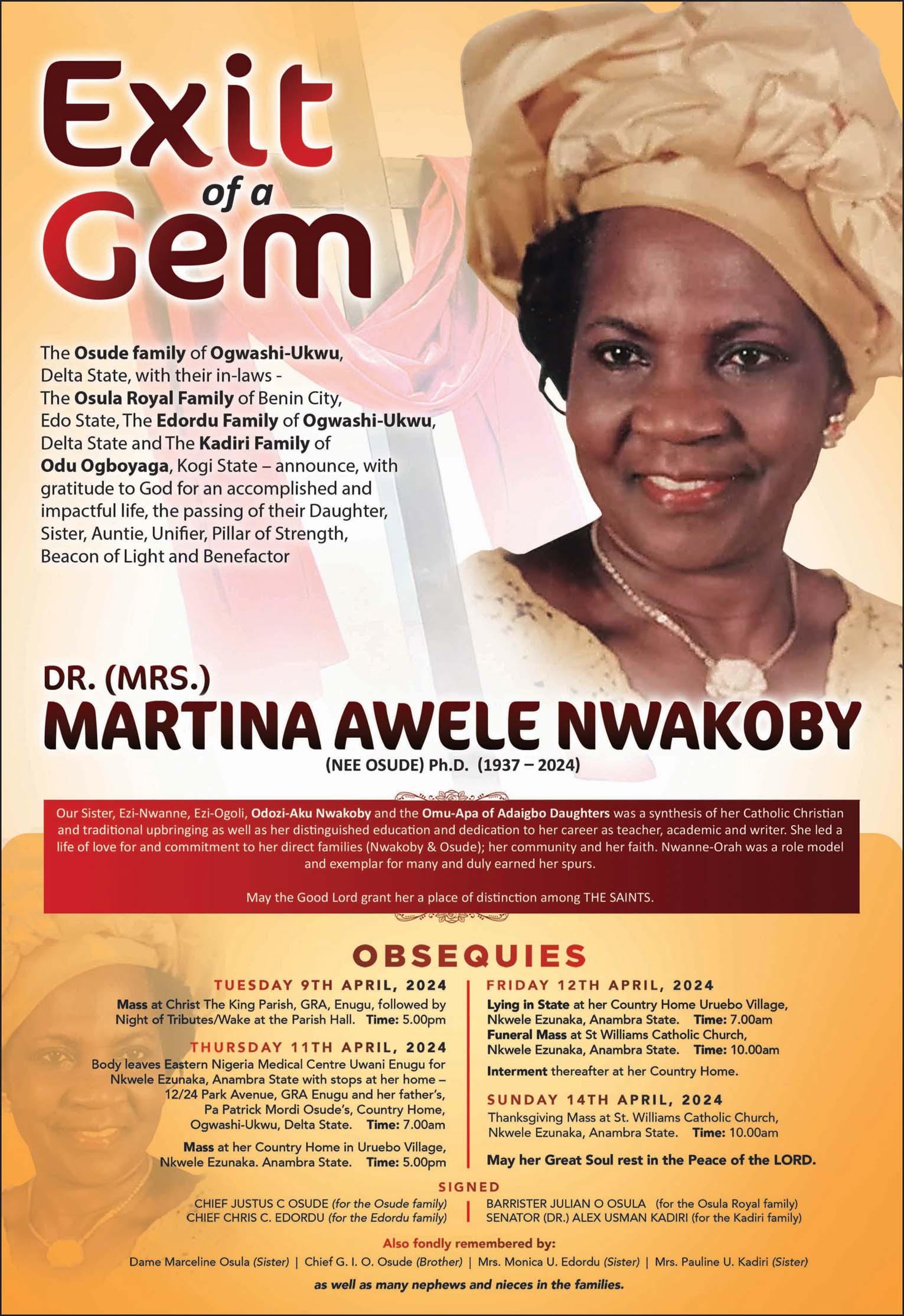
38 MONDAY APRIL 8, 2024 • THISDAY
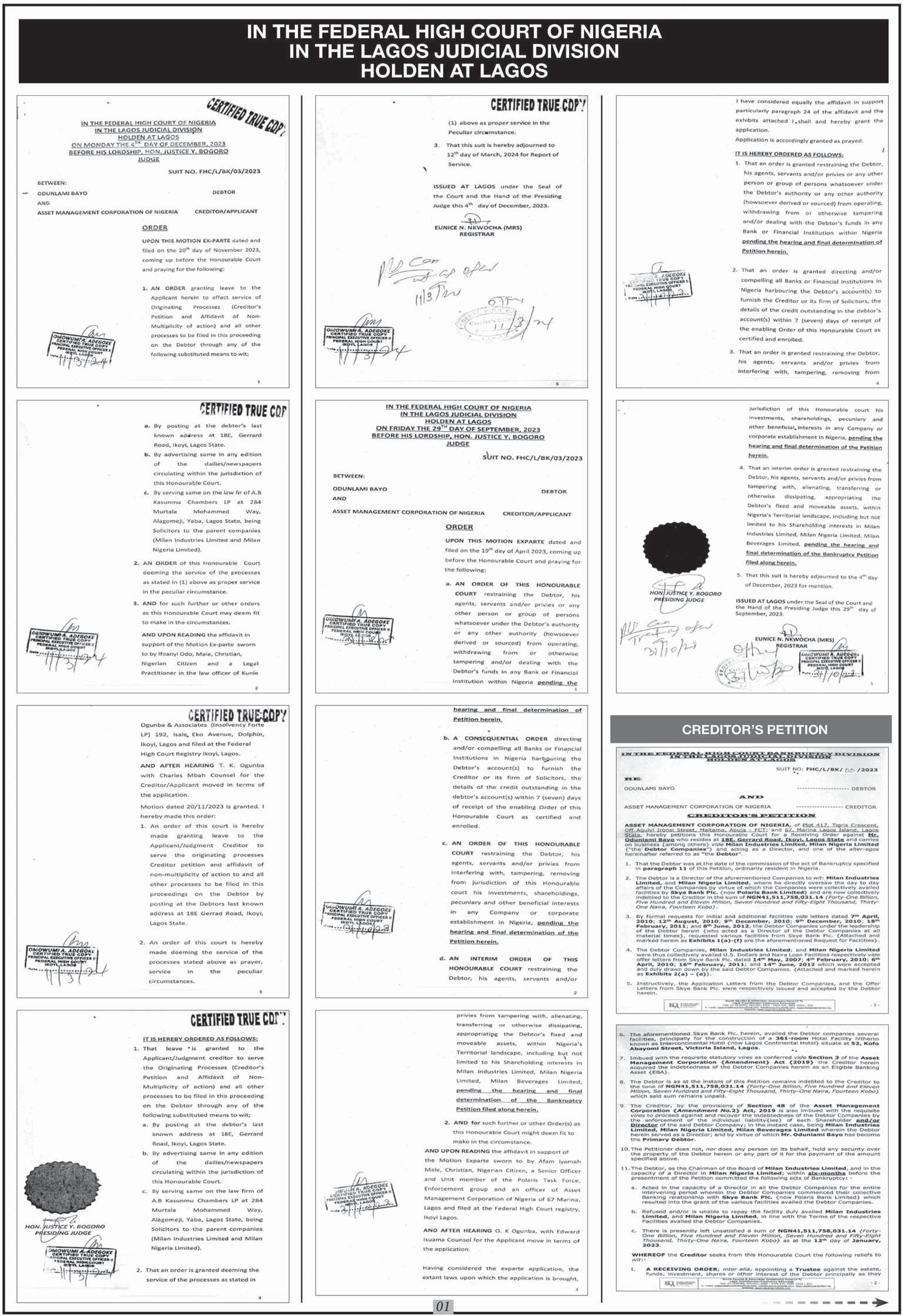
MONDAY APRIL 8 , 2024 • THISDAY 39
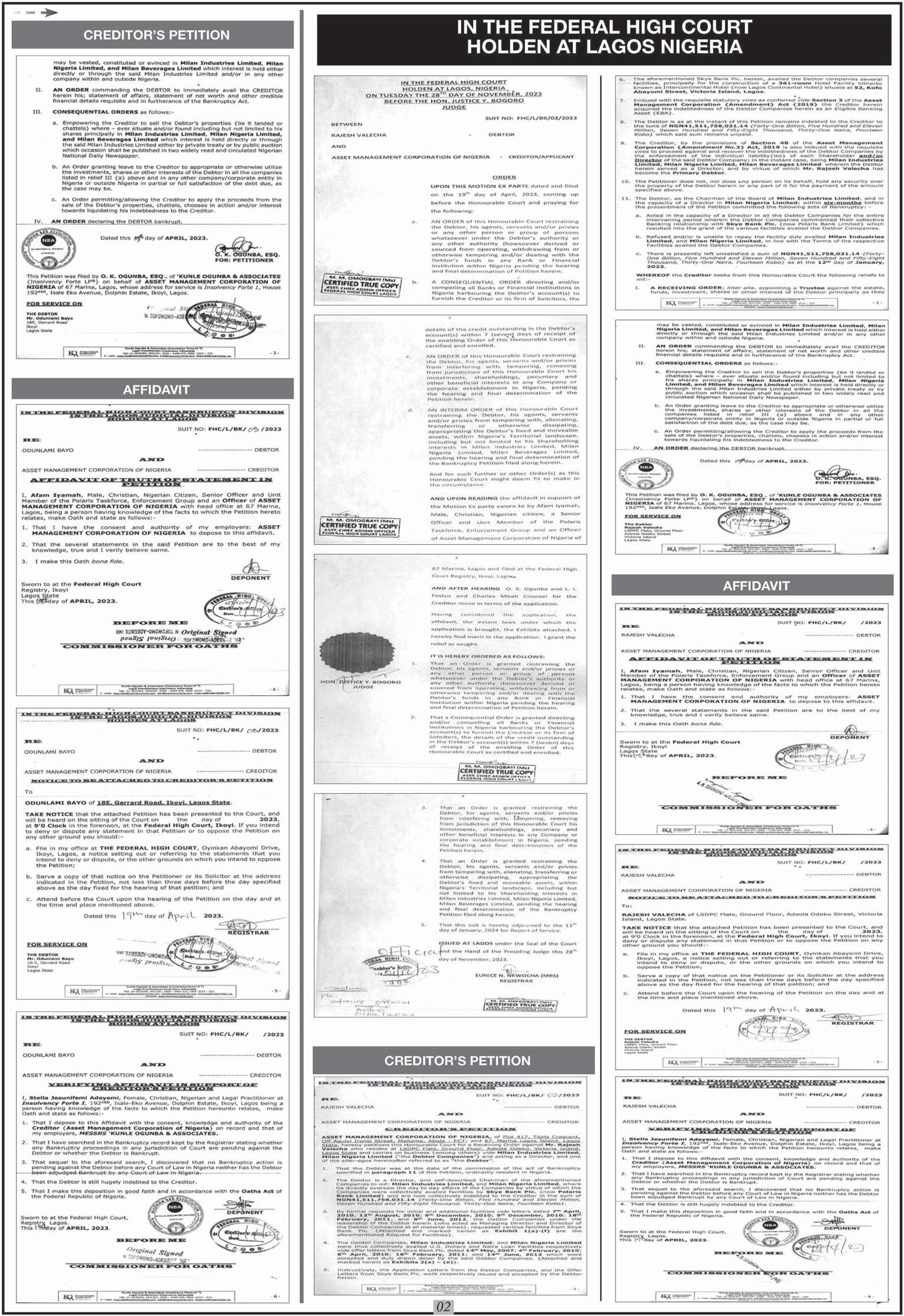
40 MONDAY APRIL 8, 2024 • THISDAY
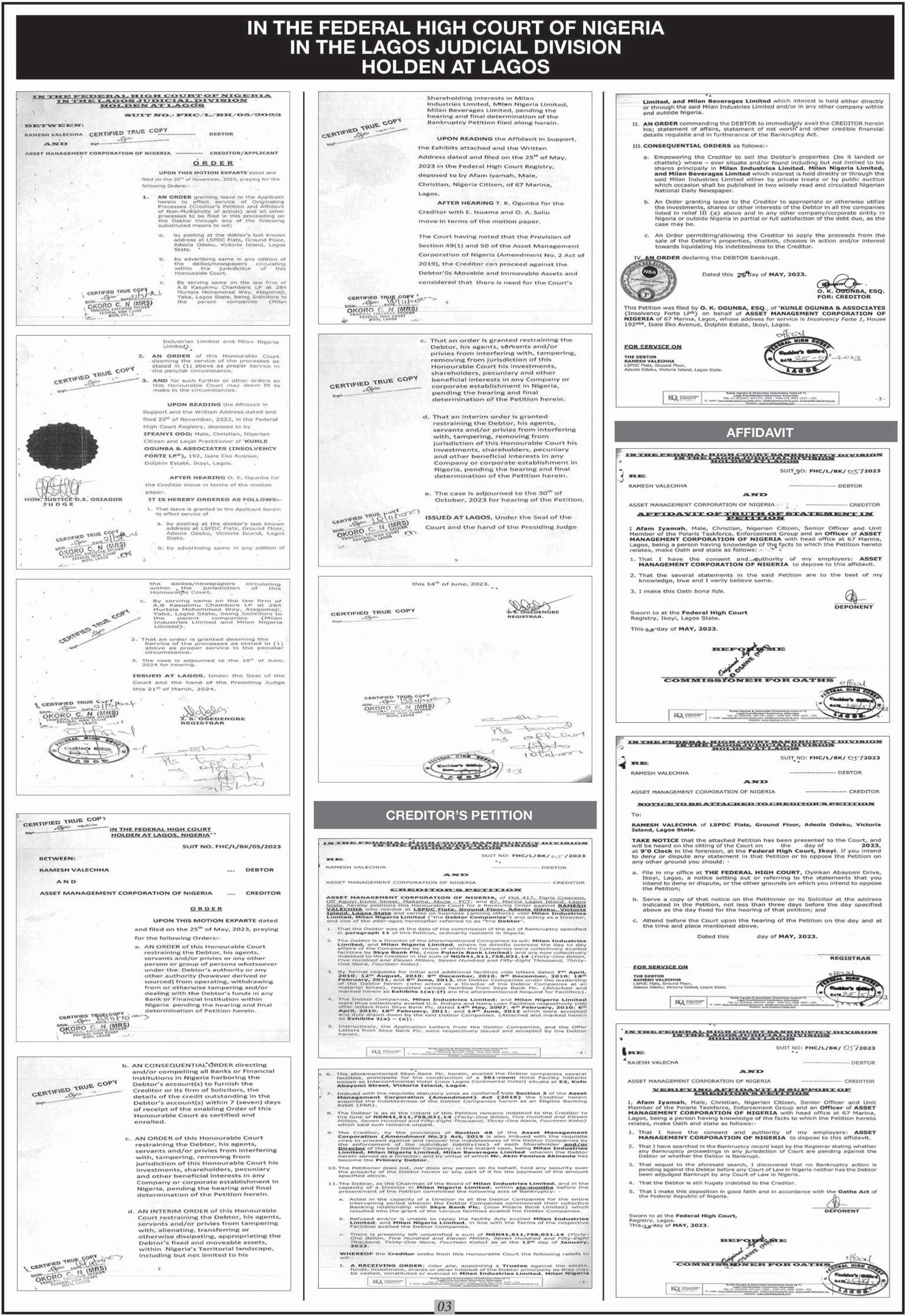
MONDAY APRIL 8 , 2024 • THISDAY 41
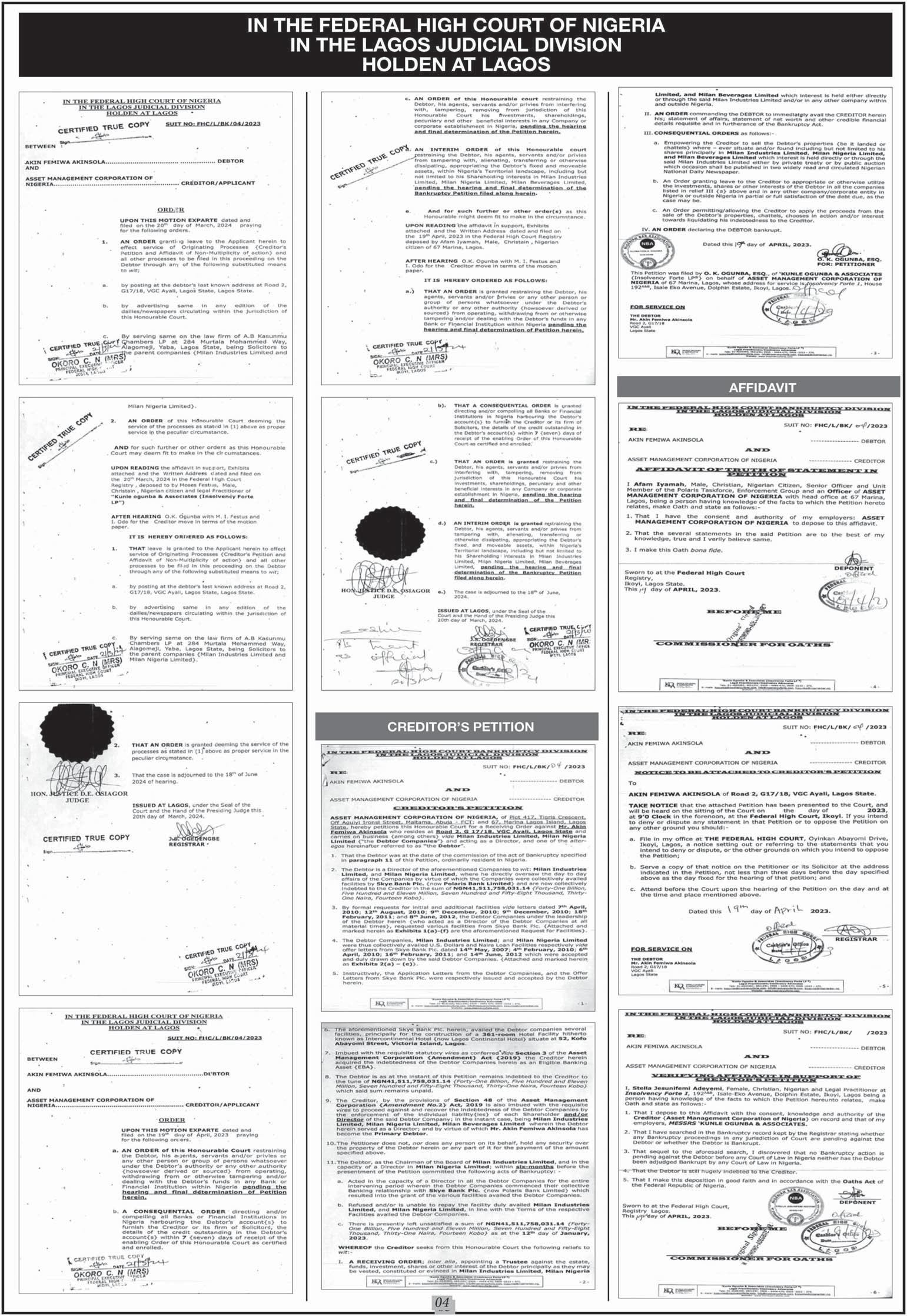
42 MONDAY APRIL 8, 2024 • THISDAY
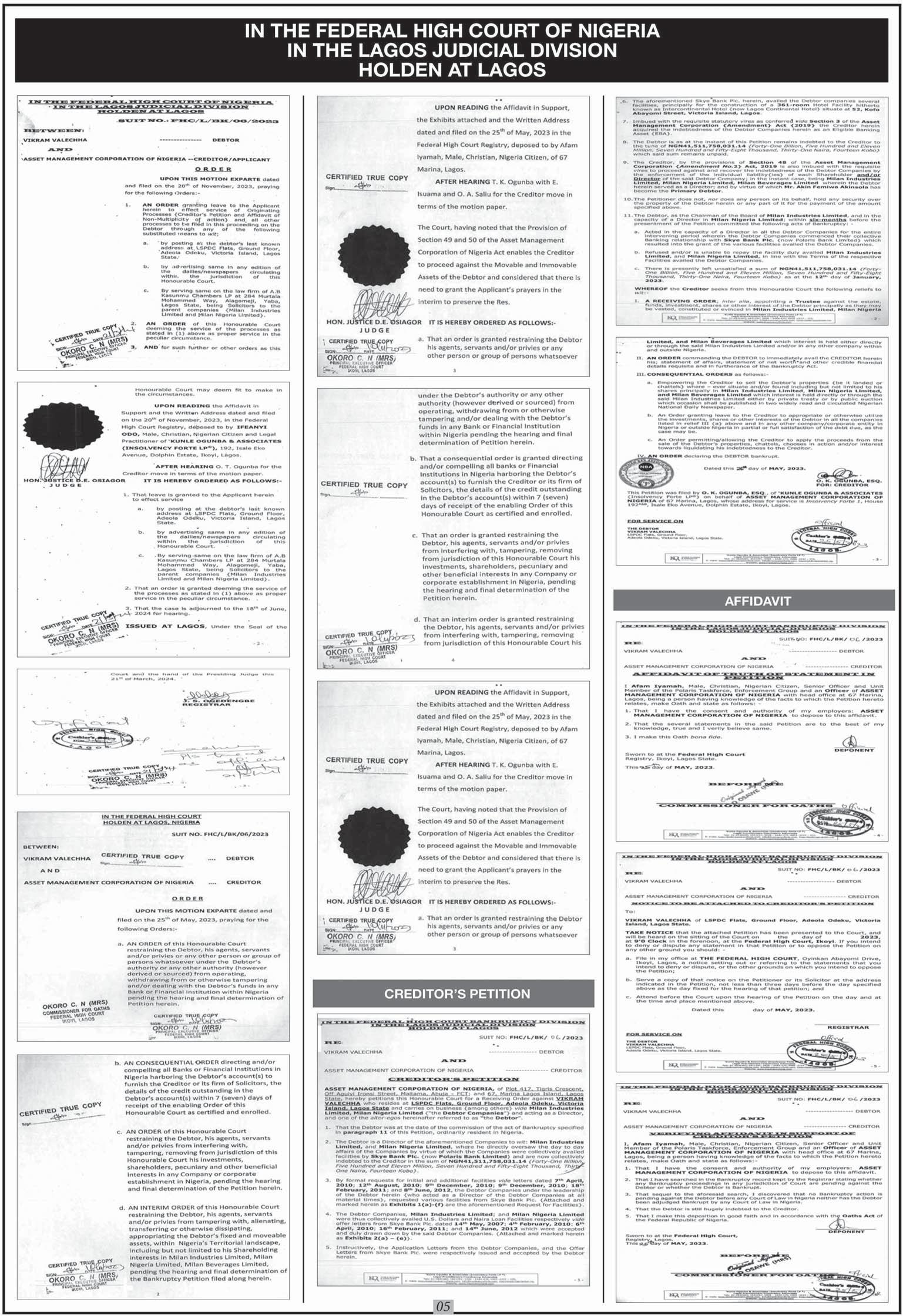
MONDAY APRIL 8 , 2024 • THISDAY 43
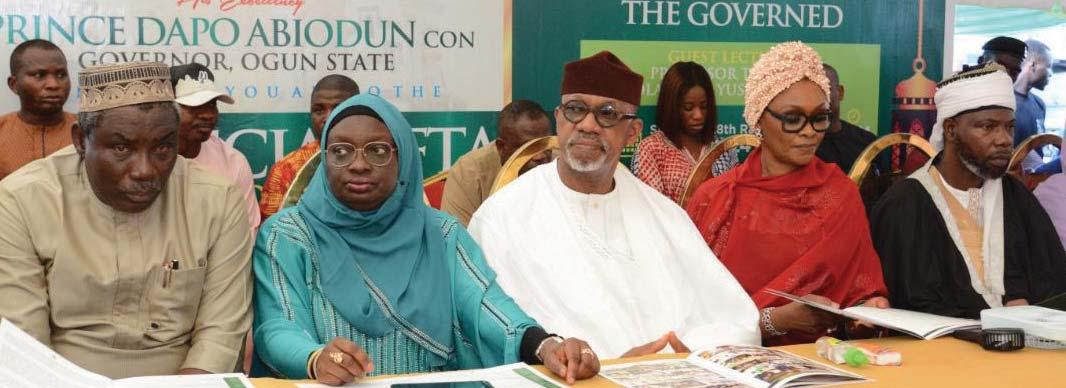
ANNUAL SPECIAL IFTAR AND LECTURE...
L-R: Speaker, Ogun State House of Assembly, Rt. Hon. Oludaisi Elemide;
Edo Varsity ASUU Demands Management's Sack, Wants Neutral Governing Council
Adibe Emenyonu in Benin Cit
The Academic Staff Union of Universities (ASUU), Ambrose Alli University (AAU), Ekpoma chapter, yesterday called for the sack of the acting Vice Chancellor of the University, Prof Asomwan Adagbonyin and his management team. The union insisted that the Edo State Governor, Mr Godwin Obaseki, who is the visitor to the university constitutes a neutral, competent and experienced governing council for the state-owned tertiary institution.
The union also cautioned that a governing council that is not neutral, competent and experienced in university administration may exacerbate the crises presently facing the ivory tower.
ASUU-AAU, in a press statement signed by Dr. Cyril Onogbosele and
Dr. William Odion, the Chairman and Assistant Secretary of ASUU, AAU, Ekpoma chapter respectively, warned that no member of Special Intervention Team (SIT) should be included in the yet to be constituted Governing Council of the school.
It added that "no member of the present controversial, expired and discredited SIT of the university should make membership of the governing council expected to be constituted for the university by the visitor.
Falana Threatens Court Action over 230% Hike in Electricity Tariff for Premium Customers
Report errant Discos, NERC urges Nigerians
Emmanuel Addeh in Abuja
Renowned human rights lawyer, Femi Falana, yesterday threatened to approach the courts over the recent increase in tariffs for premium electricity consumers in the country by over 230 per cent.
Speaking on Channels Television last night, the senior lawyer stated that the plan of the federal government through the Nigerian Electricity Regulatory Commission (NERC) is to extend the electricity tariff hike beyond ‘Band A’ consumers to other Nigerians categorised under other bands.
Falana handed down the threat, even as NERC urged Nigerians to report any form of over-billing or unjustified band swap by the Distribution Companies (Discos) to the power sector regulator.
Falana argued that the increase by the government, which has constituted a burden to consumers, cannot be justified under the Electricity Act, 2023, vowing to seek redress for Nigerians in the court.
He maintained that the federal government had already removed electricity subsidy in 2022, explaining that by enforcing a new tariff regime, the authorities were making Nigerians pay for the inefficiency and profligacy of those managing the electricity sector.
On April 3, 2024 NERC announced
No Threat
Seriki Adinoyi in Jos
the rise in electricity tariff for customers enjoying 20 hours power supply daily, explaining that only 15 per cent of over 12 million such customers fall in this category.
The implication of the increase is that customers in band A will henceforth pay N225 kilowatt per hour from the current N68 they paid hitherto.
But Falana declared electricity subsidy as non-existent, and alleged that the government was trying to raise funds for cash-strapped Discos.
“Under that law, there are certain steps to take and we are going to embark on those steps tomorrow (today) which is to raise serious objections with respect to the impunity that has characterised the recent increase.
“At the appropriate time if there is no response, we will have to go to court because the government had warned, the minister had warned that the increase this time around will only fetch the government or the discos N1.6 trillion, whereas the destination is N3 trillion.
“So, the poor people that the minister is talking about, the other bands, very soon, the government is going to extend the increases to them so that the N1.4 trillion the minister is talking about will be recovered.
“They are increasing tariff to assist the cash-strapped Discos, majority of
which have now been taken over by the banks and Asset Management Corporation of Nigeria (AMCON), and the banks and AMCON has no competence to run electricity companies,” the lawyer added.
He knocked the government for being insensitive to the plight of Nigerians who are still grappling with the economical impact of petrol subsidy removal and the collapse of the foreign exchange windows.
In a separate statement, Falana quoted a former Minister of Finance, Budget and National Planning, Zainab Ahmed as saying that the government had removed subsidy.
He said that to the utter dismay of Nigerians, the Minister of Power, Mr. Adebayo Adelabu claimed on January 15, 2024 that, "the federal government still subsidises electricity ...”
“Since the Muhammadu Buhari administration had stopped electricity subsidy in 2022, the federal government should institute a panel of inquiry to investigate the claim of the Minister of Power, Adelabu that electricity subsidy for 2024 is N3 trillion.
“The inquiry is necessary as arrangements have been concluded by the NERC to further hike electricity tariffs under the pretext of removing subsidy from the sector. The panel should also inquire into the diversion
of the N32 billion paid into the account of a private company account in 2003 for the supply of three million prepaid metres in the country,” he stated.
Meanwhile, NERC in a :“Revised Electricity Tariffs: What You Should do” note yesterday, urged customers who feel unfairly treated to report to the industry regulator.
NERC advised Nigerians to visit their Discos’ website to see if they are affected by the tariff change, stressing that they can check the revised list of Band A customers (reduced from over 1,000 feeders to about 480) or use their account number to check their band.
“If you are a Band A customer, your Disco is expected to provide you with at least 20 hours of electricity daily. It is your right to receive that minimum hours of power daily. Monitor it. Report it. Report quality of service delivery to NERC so appropriate action can be instituted against the erring Disco.
“If you are a Band B - E customer under the new tariff regime and you are overcharged for electricity tokens, report immediately. The government is still subsidising your electricity at the old rates.
“All Discos have been ordered by NERC to refund all erroneous deductions from customers not in the revised Band A latest April 12, 2024,” the power sector regulator stated.
By NUC to Close Plateau Varsity, Says Registrar
The management of Plateau State University, Bokkos, has dismissed reports that the National Universities Commission (NUC) has threatened to close down the institution, describing the report as mischievous.
The university’s Registrar, Mr. Yakubu Ayuba, denied the allegation in a statement on Sunday in Jos, the state capital.
The All Progressives Congress (APC), in a statement by its acting Publicity Secretary in the state, Shittu Bamaiyi, had alleged that the NUC has concluded plans to close down the university and withdraw the university’s certificate of recognition and accreditation over what he described as the state government’s meddlesomeness in the university’s management.
But the registrar insisted that such
an allegation was not only false and misleading but mischievous, particularly coming from a political party that has no business in the university’s management.
The statement read: “The attention of the management of Plateau State University, Bokkos, has been drawn to a press release by a political party and a letter purported to be written by the NUC to the Visitor to the university circulating on some media
platforms.
“This action is capable of causing anxiety and shaking the confidence of students, staff, parents, and prospective students; therefore, management wishes to clarify that Plateau University is a citadel of knowledge and the legacy of Plateau people should not be dragged into any political contestation, especially those that have no bearing on the university’s academic activities.
“The present university management led by the Acting Vice Chancellor, Prof. Asomwan Sonnie Adagbonyin who has acted for more than two years (Since February 2022) in clear violation of the University’s law, rules and regulations.
“It should also give way to a new crop of principal officers. This will strengthen the credibility, neutrality and fairness required of both the university management and governing council by staff, students and other stakeholders of the university," the union said.
It, therefore, advised the state government to be guided by the university’s law and the relevant rules and regulations on membership of governing council, especially in relation to academic qualification and relevant experience.
Specifically, the union maintained that the minimum academic qualification for membership of a
university governing council is a university bachelor's degree and vast knowledge of university governance and administration, particularly for a chairman of a governing council. It also called for independence of the proposed governing council and cautioned that undue government interference would make rubbish of the relevance of governing council and fester the present crises facing the University.
According to the group, in order to restore lasting industrial peace and harmony to the university, "all outstanding salaries of staff should be paid, while cases of staff victimisation, repression and undue termination of appointments with the university should be dispassionately addressed and resolved."
ASUU-AAU further stated that the problem of funding was indisputably central to the crises facing the university and urged Edo state government, to as a matter of urgency, restore adequate monthly subvention to the university for recurrent expenditure and release the budgetary capital allocation of the university.
Israel Reduces Troops in South Gaza, Egypt to Host New Talks
Emmanuel Addeh in Abuja with agency report
Israel said yesterday it had withdrawn more soldiers from Southern Gaza, leaving just one brigade, as it and Hamas sent teams to Egypt for fresh talks on a potential ceasefire in the six-month conflict.
Israel has been reducing numbers in Gaza since the start of the year to relieve reservists and is under growing pressure from its ally Washington to improve the humanitarian situation, especially after last week's killing of seven aid workers.
The military spokesperson did not give details on reasons for withdrawing soldiers or numbers involved. But Defence Minister Yoav Gallant said the troops will be preparing for future operations in Gaza. Both Israel and Hamas, the Islamist movement that controls Gaza, confirmed they were sending delegations to Egypt, Reuters reported.
Hamas wants any deal to bring about an end to the war and withdrawal of Israeli forces. Israel has said that, after any truce, it would topple Hamas, which is sworn to
its destruction.
Israeli Prime Minister Benjamin Netanyahu said there would be no deal without a hostage release and that he would not cave to international pressure. Hamas says an agreement must include freedom of movement of residents across the Gaza Strip.
More than 250 hostages were seized and some 1,200 people killed during Hamas' October 7 attack, according to Israeli tallies. More than 33,100 Palestinians have been killed in the Israeli offensive, according to the health ministry in Gaza.
Around 130 hostages are still being held in Gaza. Asked about troop withdrawals from the enclave, Israel's Chief of the General Staff Herzi Halevi told reporters that the military was adapting its methods to what has been and will be a long war. Gallant said Israel will press on with the war until Hamas no longer controls Gaza or threatens Israel as a military group.
"The forces are exiting and preparing for their next missions," Gallant said at a meeting with military officials, according to a statement from his office, and "also their coming mission in the Rafah area".
NEWS 44 THISDAY • MONDAY, APRIL 8, 2024
Deputy Governor, Engr. ((Mrs.) Noimot Salako-Oyedele; Ogun State Governor, Prince Dapo Abiodun; his wife Bamidele Abiodun and renowned Islamic Scholar, Professor Tajudeen Olalekan Yusuf at the annual special Iftar (breaking of fast) and lecture, held at the Arcade Ground, State Secretariat, Complex, Oke-Mosan, Abeokuta on Sunday.
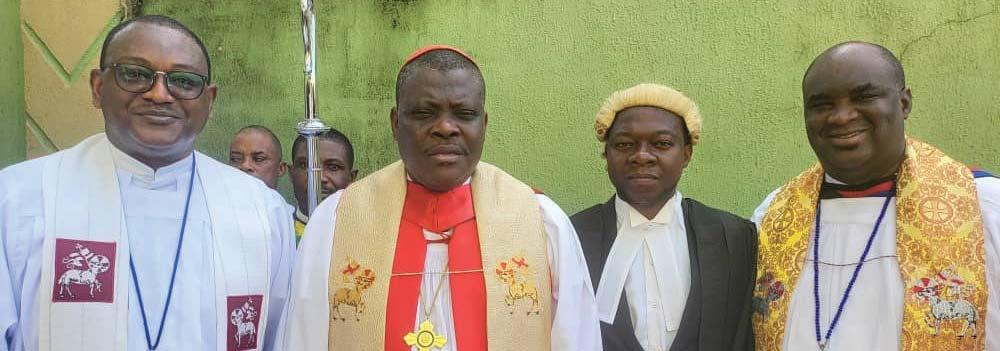
8TH ANNUAL SYNOD THANKSGIVING SERVICE...
L-R: Guest Preacher, Very Rev. Opeyemi Awe; Bishop of the Metropolitan Diocese of Ikeja, Rt. Rev. Stephen Adegbite; Diocesan Legal Adviser, Mr. Babatunde Opelusi and Synod Secretary, Very Rev. Oladapo Daramola during the 8th Annual Synod Thanksgiving Service held at MCN Bariga... yesterday
Obi: I’m Still in Labour Party, Not Leaving Soon
Says he’s not desperate to be Nigeria's president Party declares proposed stakeholders’ meeting jamboree NLC moves to set up caretaker committee
Presidential candidate of the opposition Labour Party (LP) in the 2023 general election, Peter Obi, has dismissed speculation he might quit the party in the light of its current leadership challenges, saying he was not leaving anytime soon.
Obi, while declaring he was still in the Labour Party, also said for the umpteenth time that he was not desperate to be Nigeria's president at any point in his life.
This was as the leadership of the Labour Party under Julius Abure, has described as drama and illegal, the proposed meeting of party’s stakeholders by the Nigeria Labour Congress (NLC) and those it described as desperate characters in the NLC.
At the same time, the leadership of the NLC has convened a meeting for today, Monday to inaugurate a caretaker committee that would take over the running of the affairs of the party as earlier proposed.
However, Obi, while dismissing insinuations he was preparing to dump the party said it was mere rumours peddled by politicians, who were jittery about his political popularity in the country.
The former Anambra State
governor, who was fielding questions from Journalists in Bauchi yesterday shortly after he commissioned a hand pump for water supply in Sabon Layi Community, a suburbs of Bauchi metropolis, emphasised that despite the current leadership crisis in the Labour Party, he was not prepared to leave the party anytime soon.
"I am not thinking of 2027. My concern for now is how to improve the living standards and conditions of Nigerians. Nobody should be talking about politics now. The focus should be on good governance that will make Nigeria better," he said.
The former presidential hopefully stressed that, "The leadership crisis in the LP presently is not an abnormal thing, it is an in-house problem and it will be solved amicably as a family. I have never thought of leaving the LP. I only advocated peace because I am a man who believes in peace.
“I am a man, who believes in unity, I am a man believes that we are the same. I don't see any difference between you and me. By the grace of God, I always want to do the right thing. That is the reason I came here personally. I would have asked someone to represent me. No, I didn't.
"For me, it is not about elections, we spend more time talking about elections, let us spend time talking about how we can put poor people out of poverty. Let's spend time to
know how out-of-school children will be back to school. Let's spend time in other areas, it is not about elections.
"I have said it before that I am not desperate to be president. I am desperate to see Nigeria work for the people. It is important for me because we cannot continue this way. Poor people in this country are suffering a lot. I am urging all leaders in and out of office, this is time for us to listen to to the people, it is time to work with them, time to feel a bit of their pains.
"The crisis in the LP will be resolved just like I have been saying and at the end, things will get better. Labour Party is not the problem of Nigeria, the problem of Nigeria is beyond Labour Party.
“So, my focus is not on the Labour Party but on Nigeria. My promise is a new Nigeria and that new Nigeria is what I am focused and it’s important that we all remain focused on it.
"If we fixed the leadership problems in Nigeria, I would not have been here to provide this water. So, let us talk about issues of this water, let's talk about how the people will live and eat. I assure that Labour Party will resolve its issue as a family. No family is perfect," he concluded.
LP: Proposed Stakeholders’ Meeting
Jamboree
The Labour Party under the leadership of Julius Abure, has described as a drama and illegal, the proposed meeting by the NLC and those it described as desperate characters in the NLC.
The party chided the NLC for keeping quite in the face of the recent 300 percent in the tariff of electricity by the National Electricity Regulation Commission (NERC).
In statement by the Abure-led party and signed by the National Publicity Secretary, Obiora Ifoh, "This meeting being organised by some drama boys and attention-seeking personalities in the NLC is illegal as we have not authorised it.
"It is not supported by any law in the land and therefore its outcome, a nullity. We are therefore calling on all genuine members of the party to disregard and shun the meeting.
"A few days ago, the federal government raised the electricity tariff to about 300 percent and the NLC has neither responded to it nor called out its members to protest the increment but it is quick to convene an unlawful meeting of disgruntled members who are not even party members.
"We are calling on the law enforcement agencies to rise up to the occasion and abort this gathering,
Kogi Governor Shocked over Killings in State, Traditional Ruler Narrates Ordeal
Ododo meets labour leaders, reiterates commitment to workers' welfare
Ibrahim Oyewale in Lokija
Kogi State Governor, Usman Ododo, has expressed deep shock and sympathy over the recent killings as a result of communal clashes in Agojeju-Odo community in Omala Local Government Area of the state.
The governor, who regretted the ugly dimension that the communal clashes had assumed, promised immediate intervention by his administration to forestall a reoccurrence of the unfortunate situation.
This was as the district head and traditional ruler, the Ochala Onu Ife of Bagaji-Odo in Omala His Royal Highness, David Akpa, narrated his ordeal in the crisis.
At the same time, Ododo has
reiterated the commitment of his administration to improve the welfare of civil servants in the state.
The governor, who assured the people that the perpetrators of the dastardly act, who attacked the community would be brought to justice, added that security agencies were on the trail of the assailants whose acts of mindless cowardice resulted in the destruction of lives and property in the area.
Ododo, who had since sent a delegation led by the Deputy Governor, Elder Joel Oyibo Salifu, on a condolence visit to the area further assured that kinetic and non-kinetic measures deployed by the state government had led to relative stability in Omala Local Government Area until the recent
escalation of the conflict.
Meanwhile, the traditional ruler has lamented that the people of the area did not possess sophisticated weapons to confront the herdsmen, responsible for the killing 25 people in Agojeju-Odo community.
The monarch, who disclosed this while narrating the ordeal of the people of the community to journalists, who visited his community for an on-the-spot assessment after Thursday attack said Agojeju-Odo community had been completely deserted.
Onu Ife Bagaji-Odo explained that the residents of the affected community had relocated the distract headquarters, Bagaji Odo, Abejikolo, Acha and other neighboring communities over fear of further attack.
However, Ododo while briefing
newsmen after an interactive session with Labour leaders noted that the meeting was to review critical steps so far taken by the state to address the impact of the economic downturn, especially as they affect workers in the public sector.
“We have come to interface with the leadership of the organised labour as usual because this is one of the legacies of our leader, His Excellency, the former Governor of Kogi state laid down for us to continue.
“We had a very robust conversation with the organized labour, the NLC, the TUC and other unions in the state. This is an opportunity for us to discuss not only the welfare of civil servants, but the affairs of our dear state which we have all been elected by our people to serve,” Ododo said.
which may likely degenerate to public nuisance.
"NLC does not have any proprietary right over the Labour Party and therefore cannot continue to lay claim to its ownership," Ifoh stated.
NLC Moves to Set Up Caretaker C’ttee
The leadership crisis rocking the Labour Party seemed to have taken a new dimension as a key stakeholder, the Nigeria Labour Congress, has convened a meeting on Monday to inaugurate a caretaker committee to take over the running of the affairs of the party.
In an invitation letter sent to various stakeholders of the Labour Party over the weekend summoning them to a meeting in Abuja, the Acting Chairman of the NLC Political Commission, Prof. Theophilus Ndubuaku, said the summit had become necessary due to recent development in the party
"Following the recent developments
in the Labour Party, LP, we hereby invite you to the all-inclusive & expansive NLC/TUC/Labour Party/ Obedient Movement stakeholders meeting."
NLC which is at loggerheads with the leadership of LP led by Julius Abure over who is the rightful custodian of the party, said the party been misled and needs to be recovered from those it described as illegitimate officials.
In the notice for the stakeholders’ meeting, Ndubuaku said the agenda was to inaugurate a caretaker committee made up of the elected members of the National Working Committee and Board of Trustee of the 10th June 2019
" High point of the event is for the inauguration of the Labour Party Transition Caretaker Committee, CTC: (NWC and BoT) 2024, made up of the 10th June 2019, Elected Labour Party National Working Committee, NWC Members from the Akwanga Nasarawa State National Convention and the appointed members of the Labour Party Board of Trustee, BoT," he said.
Police Raid Hideouts in FCT, Arrest 85
Kingsley Nwezeh in Abuja and Blessing Ibunge in Port Harcourt
The Federal Capital Territory Police Command, weekend, said it had raided criminal hideouts and arrested 85 suspects.
It said operatives stormed some identified black spots and criminal hideouts in Durumi and Dei-Dei axis of Abuja, serving as places of hibernation for hoodlums and arrested 85 suspects for various offenses.
The command, which said the shanties would be demolished, said the offences ranged from erecting illegal structures and shanties to the peddling of hard drugs and the manufacturing of counterfeit currencies.
At the same time, the Rivers State Police Command, has warned that it would not tolerate any form of political crisis that would cause unrest in the state.
A statement by the FCT command said, "a search warrant was executed in some of the structures and several exhibits ranging from paper and coins counterfeit currencies both in local
and foreign, light weapons, eight motorcycles, seven generators, gadgets, and several ATM cards suspected to have been stolen from their victims were recovered."
The statement signed by the Police Public Relations Officer and Superintendent of Police (SP), Josephine Adeh, said all the arrested suspects will be screened, while those found culpable will be profiled and arraigned in court "as the illegal wooden structures erected by the hoodlums were dismantled and set ablaze to deter criminals from turning these places to a brewing ground for criminals.
"While investigation is still ongoing, the Commissioner of Police FCT, CP Benneth C. Igweh, wishes to reassure residents of his commitment to flush out criminals from FCT and ensure the safety of all."
He also urged residents to be vigilant and report suspicious movements to the police.
Meanwhile, the Rivers State Police Command has warned that it would not tolerate any form of political crisis that would cause unrest in the state.
Chuks Okocha, Onyebuchi Ezigbo in Abuja and Segun Awofadeji in Bauchi
NEWS 45 THISDAY • MONDAY, APRIL 8, 2024
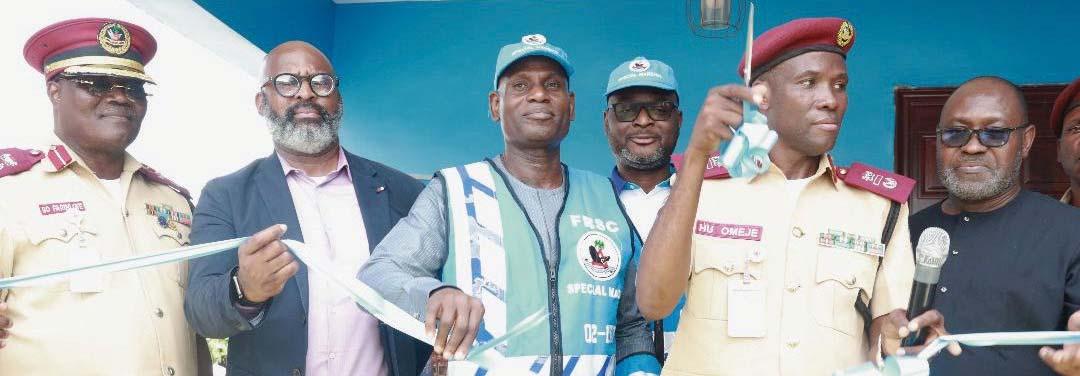
INAUGURATION OF ROAD SAFETY COMMAND OFFICE BUILT BY AXXELA ENERGY...
L-R: FRSC, Lagos State Sector Commander, Babtunde Farinloye; Director, Vehicle lnspection Service, Akin-George Fashola; Chief Operation Officer, Axxela Energy, Kehinde Alabi; Representative of FRSC Corps Marshall, Asst
IBB, Atiku, Ogbeha, Wabara, Moro, Okowa, Tambuwal, Hail Mark at 76
Sunday Aborisade in Abuja
Eminent Nigerians have felicitated with the former President of the Senate, David Mark, on his 76th birthday.
A statement on Sunday by his Media Adviser, Paul Mumeh, explained that the leaders in separate messages to Mark, praised him for his good conduct and steadfastness over the years.
His former boss, military President, Ibrahim Babangida described Mark as a very diligent and hardworking officer, who earned the reputation as a distinguished officer and gentleman.
Babangida said, "Mark epitomises an inimitable example of a thorough-bred army general, who has made a name for himself in both the military and democratic administration." He noted that Mark has demonstrated what true courage was, in almost
unassailable situations, in the course of executing tasks and responsibilities.
He added that Mark was a combination of trust, devotion, diligence, resilience, perseverance and determination just as he wished him good health, peace and wisdom in the years ahead.
On his part, former VicePresident Atiku Abubakar praised Mark for his indomitable spirit, recalling that Mark as President of the Senate provided quality leadership and brought sanity and stability to the polity.
Mark’s colleague and friend, Senator Tunde Ogbeha, described him as a reliable and dependable brother. Ogbeha noted that Mark is a man of many parts who excels in every assignment.
Senate Minority Leader, Senator Abba Moro, appreciated Mark for being a great mentor and urged him not to relent in making his reservoir of knowledge available to the
younger generations.
The immediate past governor of Delta State, Senator Ifeanyi Okowa, prayed that God in his infinite mercy continues to grant Mark Good health, wisdom and courage.
Okowa expressed the hope that Mark would continue to make his wealth of experience in leadership available for the younger generation to emulate
A former Senate President and chairman of the Peoples Democratic Party (PDP), Board of Trustees (BOT), Senator Adolf Wabara, described Mark as a unique leader, who has the gift of managing human and material resources successfully. Wabara recalled Mark’s leadership of the Senate nay National Assembly when he invoked the ‘doctrine of necessity’
to solve intractable constitutional crisis that almost bedeviled the nation in 2010.
Former Sokoto State governor, Senator Aminu Tambuwal, noted that Mark remained a foremost leader, who has made positive impact in the leadership of Nigeria, especially in the legislature.
In his message, former Senate leader, Senator Victor Ndoma-
egba (SAN) noted that Mark was a leader of inestimable value and tasked him to establish a leadership foundation, where he would mentor and lecture young Nigerians on the rudiments of administration and leadership. Mark was born on April 8, 1948. He was military Governor of Niger State, Communications minister, and Senate President of Nigeria.
Kaigama Urges Global Sanctions against Corrupt Government Leaders
Onyebuchi Ezigbo in Abuja
Archbishop of the Catholic Archdiocese of Abuja, Most Rev. Ignatius Kaigama yesterday asked the international community to
consider imposing sanctions on those he described as insensitive leaders who corruptly enrich themselves and fail to provide for the wellbeing of their citizens While delivering his Homily at
Rainstorms Destroy Over 50 Houses, Shops in Jos South
Seriki Adinoyi in Jos
Over 50 houses and shops have been destroyed by torrential rains in several communities in Jos South Local Government Area of Plateau State thereby rendering hundreds of persons homeless.
The rains which started on Saturday evening and lasted for about three hours, were accompanied by a heavy windstorm that blew off rooftops of the houses and left the occupants scampering to safety. Nigerian Air Force barracks in Jos were not spared as the roofs of some of their buildings were also blown away by the storm. A resident of Gwarandok, a neighbourhood community of the Air Force barracks,
Ropshak Shanlang, told our correspondent in Jos on Sunday that the incident had thrown the people of the area into utter confusion and panic as most of the affected persons were now stranded and in search of a place of refuge.
Shanlang said that several homes were also destroyed in Abattoir and Angulo areas of the council. “This recent
downpour has caused a devastating effect on dwellers as the storm removed the roofs of buildings; both homes and shops. The downpour came with heavy wind that lasted for hours and left monumental destruction in its trail.”
He appealed to government to come to the aid of the victims in terms of helping them to get a temporary place of abode.
the Church of Annunciation, Arab Road, Kubwa, Abuja, Kaigama said that leaders should allow themselves to be used by God to reach out to the needy.
He said: "Political leaders in Nigeria should ensure that nobody should go to bed hungry, feel unsafe in his/her environment or become so poor as to be unable to access the necessities of life: water, light, education, healthcare, food, shelter, etc.
"I imagine that the international community can put pressure on insensitive leaders who corruptly enrich themselves and provide no social security for their people, leave youths largely unemployed, and spend so much on governance,” he said.
He argued that the rights of the less-privileged must be put on the
HEALTHCARE DELIVERY IS PEOPLE’S RIGHT AND NOT PRIVILEGE, SAYS FIRST LADY, REMI TINUBU
environmental conditions, and freedom from discrimination.
In Abuja, the organisation has planned a special event: "Walk the Talk” and Health Colloquium at the Unity Fountain as part of activities to commemorate the World Health Day.
"Around the world, the right to health of millions is increasingly coming under threat. Diseases and disasters loom large as causes of death and disability. Conflicts are devastating lives, causing death, pain, hunger, and psychological distress.
“The burning of fossil fuels is simultaneously driving the climate crisis and taking away our right to breathe clean air, with indoor and outdoor air pollution claiming a life every
five seconds,” the global health body noted.
WHO said its council on the Economics of Health for All has found that at least 140 countries recognise health as a human right in their constitution. Yet the countries are not passing and putting into practice laws to ensure their populations are entitled to access health services.
“This underpins the fact that at least 4.5 billion people — more than half of the world’s population — were not fully covered by essential health services in 2021.
“To address these types of challenges, the theme for World Health Day 2024 is ‘My health, my right’,” it said. It further urged the government
to build infrastructure that will guarantee decent work, worker rights and protections, and create fair, equal and gender-responsive working conditions for health and care workers.
It also enjoined governments to ensure access to social protection to reduce households’ vulnerability to poverty and counteract the negative impacts of unexpected life events on income, wealth or health.
WHO further advised government entities to: “Invest in health like your bottom line depends on it – an additional $200–328 billion a year is needed globally to scale up primary health care in low- and middleincome countries (i.e. 3.3 per cent of national forecast GDP).
“Deliver on the right to health – make health services available, accessible, acceptable and of good quality for everyone, everywhere. Be strategic and build from the basics, reorient health systems around primary health care.
“Champion transparency and accountability, tackle corruption by strengthening governance and working across sectors.
“Involve the general public in health decision-making, ‘social participation’ happens when individuals and communities are meaningfully involved in decision-making around health, e.g., town-hall meetings and citizen assemblies, focus groups and consultations, health councils, representation on steering groups, and review boards.
“Know the health needs of populations and act on them, collect, analyse, use and monitor data, disaggregate by age, sex, economic status, education level, place of residence, race and ethnicity, and other characteristics and act to correct health inequities.
“Safeguard the right to health in war and conflict, protect health infrastructure and health workers, and ensure uninterrupted access to health services, in adherence to international humanitarian and human rights law."
In another breath, the President of the 9th Senate, Ahmad Lawan, has urged the federal government to prioritise health as a basic right of every Nigerian.
Lawan stated this in a message by his Media Adviser, Ezrel
front burner, maintaining that the international community must do more to pressure Nigerian leaders to serve the people who elected them.
"When can the rights of the poor, victims terrorised by religious bigots and terrorists, kidnappers, be put on the front burner of the hierarchy of priorities of the international community?
“How I wish the international community would confront our leaders who govern badly and pressurise them to fight poverty, diseases and immorality.
"Unfortunately, powerful nations seem to provide more support for war, easier services for abortion, zealously promoting the rights of same-sex couples, but weakly respond to the issues of poverty, hunger, and disease and a host of anomalies," he stressed.
Tabiowo, to mark the World Health Day 2024, which is celebrated April 7 globally, every year. He described health as a fundamental human right that should be enjoyed by all individuals, irrespective of their background and socioeconomic status.
Lawan, who is the Chairman, Senate Committee on Defence in the current Senate, explained that access to healthcare services, and safe living conditions are essential for maintaining good health and wellbeing. He further advocated quality healthcare systems and policies that promote health equity, and initiatives that empower individuals to take charge of their own health.
NEWS 46 THISDAY • MONDAY, APRIL 8, 2024
Corps Marshall Hyginus Omeje and CEO, Axxela Energy Limited, Bolaji Osunsanya during the inauguration of Lagos State Sector Command office building built by the Axxela Energy Ltd as part of its CSR efforts at the Road Safety Ojodu office in Lagos....yesterday. ABIODUN AJALA
BACKPAGE CONTINUATION
BAND A DIESEL CUSTOMER
truth is that is has already made me a Band A diesel customer. Ten years ago when I moved into my new area, I used to summon a diesel truck to come and fill the tank of my 30KVA generator. The full tank was 140 litres and it cost N32,000. On other days when I could not fill the tank, I took four 30-litre jerrycans to the petrol station and filled them for N24,000. Now the same four jerrycans are filled at N180,000. Guess what? My area of Abuja has no public water supply. Every single house in the estates after Apo has a borehole, so we must start the generator frequently in order to get water.
One of the first acts in office of FCT Minister Nyesom Wike was to bulldoze away the fruits and vegetable market at Kabusa Junction. As I watched the stalls go up in smoke, I silently prayed that Wike will reorder his priorities and extend water supply to our estates. Five years ago, FCT Water Board’s contractors dug trenches all over the place and huge water pipes were laid besides them. We never saw the water; if I didn’t have to pump so much diesel in order to operate a borehole, I will probably be in Band M of diesel consumption by now. Not only Abuja Electric and its collaborator, Nigeria Electricity Regulatory Commission. Meat sellers at Abuja’s Area 8 market, where I have been buying beef for the last ten years, have apparently reclassified me into a Band A consumer. When I phoned my customer and asked how much a kilo of beef now costs, he hesitated before he mentioned the new Band A price. He claimed that the
abattoir from where they source meat is having a hard time because of shortage of cattle. I didn’t believe him. Shortage? All the cattle rustling that we read about in the news media, are they not all destined for the abattoirs? Where else will a cattle rustler take a cow if not the abattoir? Last time I checked, former Agriculture Minister Chief Audu Ogbeh’s cattle colonies and cattle ranches never took off. Despite its desperate search for money, the government has not yet demanded royalties on roadside grass, so why is the cost of meat rising astronomically? What is the dollar component of open grazing, if I may ask?
At Garki Area 8 market, chicken sellers sit side by side with beef butchers. Which is regrettable because they seem to coordinate price hikes among themselves. I urge Minister Wike to separate them, relocate the chicken sellers and confiscate their phones so that they don’t coordinate effectively like forex dealers do. Why because, within minutes of the butcher telling me that the cost of beef had risen, the man from whom I buy chicken also told me that the price of chicken had risen. One medium sized fowl cost N5,000 last week. With Sallah at hand, I can only imagine what will happen between today and tomorrow. I was moved to a Band A chicken customer!
All other foodstuff sellers followed suit. Rice, yams, potatoes, plantain, fish, vegetables and fruit prices all took off like a rocket and we were immediately reclassified as Band A customers. One cannot even place his finger on it; some of the traders
blame the dollar, others say it is petrol and diesel price, still others say it is due to the number of security agents and inspectors on the road, especially touts of the Abuja Metropolitan Area Council who jump at every goods truck and demand to be bribed before allowing it to pass. The extorted money clearly never gets to AMAC coffers, so why are they empowered with uniforms and policemen allow the touts to jump at vehicles unhindered?
Not to be outdone, pharmacies and patent medicine stores have also reclassified us into Band A medicine customers. Two days ago, I entered a pharmacy and asked for cough syrup. The young pharmacist produced a small bottle of Benylin syrup and said, “N26,000.” My eyes popped out. Ordinary cough, costs that much to treat? Then I remembered my diabetes and blood pressure medicines. Up until last year I bought a month’s supply at N35,000, which I thought was high. Last week when I walked into a pharmacy at Wuse, two out of the four medicines alone cost N95,000. A Band A diabetic patient! It may not be a bad idea after all to try the herbal medicines for diabetes that I see being advertised on Facebook Messenger. At least they will classify me as Band F customer.
Schools also reclassified many parents into Band A school fees. Up until last year, for the schools that collect fees divided into three terms, the highest fees are paid in the first term, and they progressively reduced in the second and third terms. Not this year. The second term fees I paid were
ELECTRICITY TARIFFS: THE LIMITS OF SHOCK
to use electricity more efficiently, thereby reducing energy consumption. It attracts private investment and, most importantly, helps reduce the financial burden on the government of subsidising electricity prices, freeing up resources for other priority areas such as health care, education, and infrastructural development. For the above reasons, I advocate appropriate pricing and support any policy that will open our electricity regime for growth and development. I understand the importance of electricity in Nigeria's emerging economic structure.
Nonetheless, I do not support the current policy approach because it is counterintuitive and counterproductive. It will produce a counter-effect to the intended goal. The reasons for my position are evident: first, between 1999 and 2015, Nigerian Senate documents show that Nigeria spent N2.74 trillion on electricity, yet there was no significant improvement in the generation or power delivered to homes and businesses. From 2018 to 2020, we spent N1.7 trillion on electricity, yet 43% of our population, according to the World Bank, needs to be connected to the national grid. The inference to draw is that the electricity power challenge is beyond money.
There are obviously systemic inefficiencies and corruption that no one has bothered to address. Asking consumers to pay more will transfer the inefficiencies to the populace. Second, NERC says only 15% or 1.8m out of 12million meterable customers are under band A, which enjoys 20 hours of electricity per day, although this may seem unrealistic. This band A must include factories, banks, telecom companies, hospitals, schools, malls, commercial centres, and residential areas of high-net-worth individuals. This increase in tariffs will mean an increase in the cost of doing business by 231%. Cost of school fees for private institutions will also go up by a factor of 231%. The implication is that the businesses will transfer the cost to final consumers, mostly people experiencing poverty who are already undergoing a cost-of-living crisis. Third, this may dampen the real sector, and many businesses may
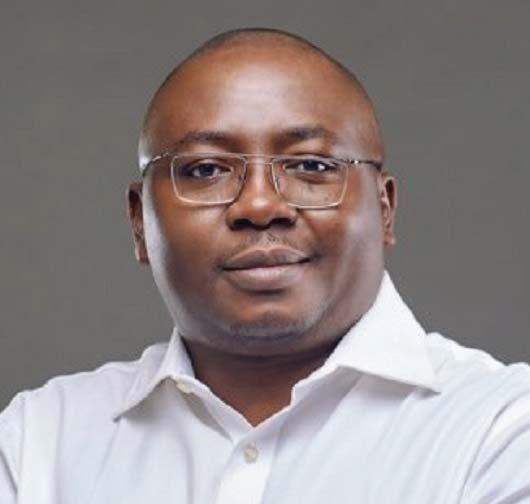
close. Besides, demands for goods and services may drop. The competitiveness and profitability of Nigerian firms may be in jeopardy.
The current approach will create inflationary pressures, reduce the competitiveness of businesses both locally and internationally, impact the household budget that is already battered by harsh economic realities, lead to business closures and resultant unemployment, negatively impact economic growth by constraining production and consumption, and ultimately may exacerbate already tensed social and civil unrest. Policymakers should consider implementing measures to improve electricity generation, transmission, and distribution efficiency and address issues related to
higher than first term fees and I have just received a notification for the third fees, higher than the second term ones. The school cleverly inserted a small reduction as “neighbour allowance” because my house is near the school. Is that logical? Is it not those wards whose houses are far away that should receive a “non-neighborhood allowance”? More seriously, the school has quietly abolished what they used to call “sibling allowance.” If you had up to three kids in the school, the third child paid nothing. This time around when I pointed out to the school that I have three siblings, they said since one is in primary school and two are in secondary school, these are two different schools [under the same roof!] and they don’t qualify for sibling allowance.
It is NEPA that started all of these with its organising us into Band A customers. The Minister of Power even served notice that in the next two to three years, every electricity customer will move to Band A. With his pronouncement, we are already thinking of our alternative to electricity.
Early last century when the American billionaire Howard Hughes, owner of Hughes Tool Company, was accused of monopolising oil drilling technology, he said, “There is no monopoly. Anyone who does not want to use the Hughes tool to drill for oil can use an axe and a shovel.” He is right. Anyone who does not want to use NEPA’s electricity can use bush lamps, three-legged firewood ovens and charcoal-fired pressing stones.
power generation.
What could NERC have been done differently to implement a better pricing system? NERC could have delivered a well-thought-through transition plan over a 6-to-9-month period with a model allowing everyone to see what an increased tariff and electricity supply would mean. This way, citizens can adjust, make alternative arrangements and plan accordingly. Transparent communication and stakeholder engagement are essential for building trust and effectively managing potential social and economic impacts. The necessity of public sensitisation on matters that affect the livelihood of the majority must be balanced. There is a need to prepare the public before implementing any new policy that has a significant impact on livelihoods. Socio-economic reform must never be an ambush shock therapy; otherwise, the populace will react like an injured collective. NERC ought to match an electricity tariff adjustment plan with a post-reform plan to show how the government and stakeholders intend to mitigate the adverse impact of a hike in price and other critical reforms.
tariff structures, affordability, and subsidy mechanisms.
Nigeria has a vast informal sector - micro, small, and medium-sized businesses – that is our economy's backbone. These businesses account for over 40% of our GDP and 70% of employment. These businesses include vibrant youth-led innovation hubs in informal urban settlements across the country, small service and creative firms scattered across our commercial centres, and burgeoning small industrial production businesses dotted in areas where access to electricity is better and stable. A draconian hike in electricity without appropriate time to plan and adjust may spell doom for these businesses, already spending a chunk of their merger revenue on private
Conceptualising and adopting sound economic policies is necessary for increased output in the electricity sector, but more is needed: any policy is only as good as its implementation and impact. Policy implementation can fail for three reasons: the absence of complementary measures necessary to make the policy effective, nonalignment with reality, and the inadequate capability of prevailing institutions and administrative systems to respond to changes. This electricity tariff hike, especially given our current socioeconomic realities, is one policy that may hurt the people because of poor conception and disoriented implementation. Though a great idea, the timing, implementation approach and lack of complementarity of favourable institutional and economic capacity to mitigate the unintended effect of the hike in price may end up creating more significant problems than we already have. Inadvertently, we may be biting more than we can chew.
THISDAY• MONDAY, APRIL 8, 2024
47
Minister of Power, Adebayo Adelabu





Omehia to Nyesom Wike
“Wikespeaksfrombothsidesofhismouth;hesayssomethingtodayanddeniesit tomorrowlikeaclown.Iwonderwhyheishurtbyoursupportforthegovernorand the FG under PresidentTinubu. Does he want us to perpetually be at political war witheverybody,evenlongafterelectionsareoverandgovernancehastakenover? Is it not madness?"
-FormerGovernorofRiversState,CelestineOmehia,urgesWiketo controlhisgreedforpowerandallowFubaratogovern the state.
VIEW FROM THE GALLERY

Band A Diesel Customer MAHMUDJEGA
One day in 1998, I peeped through the window of my office in New Nigerian Weekly in Kaduna, and I saw the company’s managing director, Dr. [later Prof] Abubakar Rasheed walking out in a great hurry. He was walking towards the west of the vast New Nigerian premises. I thought he was going to the mosque, but it was not prayer time. Dr. Rasheed always walked briskly but, on that day, he seemed to be in real haste. I emerged from my office and asked the MD where he was going in such hurry. He said, “Come with me. I am going to CPD [New Nigerian’s near-comatose Commercial Printing Department]. In six months they did not print anything. But because we got a job from NECON [National Electoral Commission of Nigeria] Chairman Sumner Dagogo-Jack to print non-sensitive election materials, they had to work overnight in order to meet the deadline. This morning, all 100 staffers of CPD filled forms claiming overtime. I
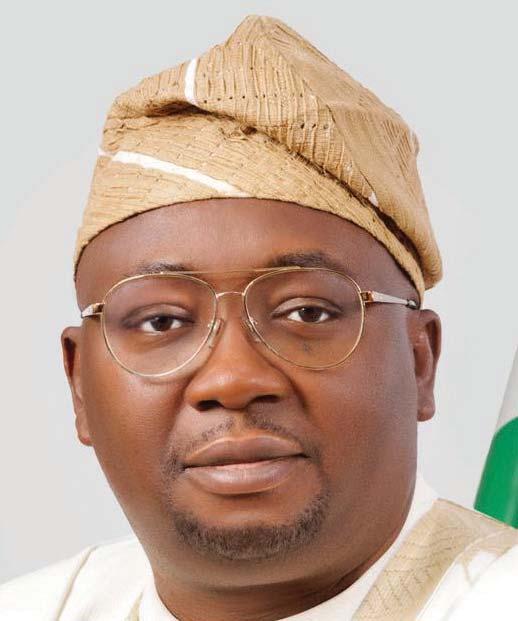
am going there to make all of them to fill forms for undertime, for the six months that they did not do any work but were collecting their salaries.”
I thought we should apply Rasheed’s formula to all electricity managers and workers in Nigeria after last week’s shock unrolling of a 231% tariff hike for consumers in the Band A bracket. These, allegedly, are those who receive a minimum 20 hours’ power supply every day. Within a week, “Band A” as a parlance joined the ranks of Nigeria’s most notorious parlances including poll tax, austerity, Imo Formula, Secondtier Foreign Exchange Market, Structural Adjustment Program, balance of payments support loan, right-sizing the civil service, subsidy scam, under recovery, legislative oversight, constitutional amendment and palliative. It was Waziri Adio who game me a link to check which band my house fell into. With trepidation I punched in my house’s meter number and, lo and behold, it was Band A! Two days later Waziri urged me to check again, and this time I had been adjusted to Band B. I thought Band Z was more appropriate for my area, if number of hours of power supplied is anything to go by.
DAKUKU PETERSIDE
BENEATH THE SURFACE
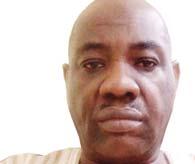
Okay, since people will now be paying the various Discos under Band A, what about them repaying us for the millions of hours that we went without power supply? The Rasheed formula: if you are paid for overtime, you must repay for undertime. All the nights we went without sleep due to heat and mosquitoes; all the productive days lost when office tools shut down due to power failure; all the businesses small and big that crumbled due to poor power supply; all the houses and buildings that caught fire due to electrical sparks when power made its infrequent appearance, who will pay for it? Back in the 1980s, I personally lost many electrical appliances due to NEPA power surges. I wanted to sue, but a lawyer advised me that the 1972 military-era decree that created NEPA ousted the jurisdiction of courts to entertain complaints about destroyed appliances. Even though Abuja Electric has now redesignated my meter as Band B, the
Continued on page 47
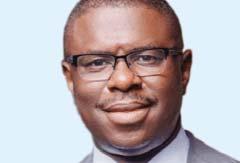
Electricity Tariffs: The Limits of Shock
In Nigeria, many policies that are supposed to catalyse economic growth end up making things worse and complicate matters for the citizen for whom these policies are designed to enhance their quality of life. Recently, two significant policies typify this: The Petroleum Subsidy Removal Policy and the floating of the Naira. Both policies are good and well-intentioned and would bring about substantial progress for people in the medium to long term. However, the reality is that the policies ended up having a devastating effect on the populace. Removing the subsidy brought untold hardship due to sequencing and implementation issues rather than the principle of doing it. Somehow, we are still battling to survive the impact of the Naira forex rate merger.
The problem was not the nobility of the intention, but something was wrong with these policies' conception, delivery, and implementation. This is against the
absence of a planned execution that appreciated the impact assessment of a singular action on the economic dynamics such that by solving one problem, we created a bigger one.
The most recent 231% hike in the price of electricity units for Band A customers is another presumed good policy that might have an unintended adverse impact on the citizens. The main argument for a cost reflective tariff must be distinct from that of subsidy removal, especially when the economics of the subsidy is yet to be proven, and the utilisation transition mechanism is not established or communicated. This policy may unleash hardship on the people, which is not the intention of the policymakers. To be clear, I am an advocate of cost reflective electricity tariff because of the big picture, and I will give reasons for this, but I am afraid I have to disagree with the current government approach.
Based on the evidence of the roll-out
of the policy and the realities of this new electricity regime, it is unclear how the determination of the bands works because the criteria of customers enjoying the constant 20-hour power supply threshold are unsubstantiated and bogus. Moreso for a largely illiterate population . This makes the case for tariff increase somewhat confusing and not transparent as there is no measurable way for the average consumer to track supply relative to billing. The result is that people may end up paying for darkness.
A gradual, sequential step to the ultimate destination of appropriate electricity pricing would have delivered a different result and minimise the adverse effect on the citizens. I have gone through the website of the regulator ,If what the Nigeria Electricity Regulatory Commission (NERC) has released is the master plan for implementing appropriate electricity pricing, it lacks details of the progression path to total transition to cost effective
tariff regime and fall short of expectations in every respect. The result of this hurried announcement of a price hike, whether for band A, B, or even C clients, may lead to endless inflation and economic stress on the citizens. If we add the electricity price hike to the impact of petrol subsidy removal and spiralling food inflation, the average citizen faces existential shock. However, I support the appropriate electricity pricing because it is critical for ensuring the sustainability, reliability, and affordability of electricity supply in Nigeria and promoting investment, innovation, and economic growth in the energy sector and beyond. Appropriate pricing ensures that utilities can generate sufficient revenue to invest in the maintenance, upgrade, and expansion of electricity infrastructure to enhance the reliability and quality of electricity supply. It incentivises consumers
TRUTH & REASON Monday, April 8, 2024Price: N400 Printed and Published in Lagos by THISDAY Newspapers Limited. Lagos: 35 Creek Road, Apapa, Lagos. Abuja: Plot 1, Sector Centre B, Jabi Business District, Solomon Lar Way, Jabi North East, Abuja . All Correspondence to P.O. Box 54749, Ikoyi, Lagos. EMAIL: editor@thisdaylive.com, info@thisdaylive.com. TELEPHONE Lagos: 0802 2924721-2, 08022924485. Abuja: Tel: 08155555292, 08155555929 24/7 ADVERTISING HOT LINES: 0811 181 3085 0811 181 3086, 0811 181 3087, 0811 181 3088, 0811 181 3089, 0811 181 3090. ENQUIRIES & BOOKING: adsbooking@thisdaylive.com
MISSILE
Minister of Power, Adebayo Adelabu
Continued on page 47














































































